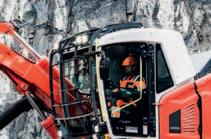
























































































































































With all components enclosed and protected inside the drum, the GrizzlyDrive® Drum Motor is designed for 80,000 hours of continuous operation before maintenance, providing belt conveyors with reliability, longevity and optimal performance even in the harshest conditions. The GrizzlyDrive® with













increases performance and provides 4-5 times longer service life than standard rubber lagging. Eliminate Routine









































The last few years has pushed a new wave of resource nationalism, and it is likely to grow as global demand for critical minerals continues to push countries to protect their supplies
By Kelsey Rolfe
Collaborative teamwork was required to successfully decommission the K1 and K2 shafts at Mosaic’s Esterhazy potash complex earlier than originally planned, amid the challenges of time constraints and the difficulties of the COVID-19 pandemic
By Alexandra Lopez-Pacheco
Technology is helping to improve the accuracy of information obtained from exploration drill holes
By Catherine Hercus
Training programs that equip workers with resources to recognize and navigate mental health issues
By Mackenzie Patterson
In each issue
6 Editor’s letter
8 President’s notes
Tools of the trade
9 The best in new technology
Compiled by Noel Ormita
Developments
10 Tailings trial
By Silvia Pikal
18 One global standard
By Kelsey Rolfe
Column
22 By taking a full business process view of resilience, operations can protect themselves from all types of outages
By Rob Labbé
Training and skills development
26 Beyond gaming and retail applications, the virtual world is showing major promise for training in the mining sector
By Rosalind Stefanac
28 An industry-backed training program is helping to boost the Indigenous workforce in Saskatchewan’s potash industry By Sarah St-Pierre
30 MiHR executive director Ryan Montpellier discusses how the Canadian mining industry must address decreasing enrolment trends in mining education and a lack of youth awareness about opportunities in the sector
By Ailbhe Goodbody
CIM news
44 Each year the CIM Vancouver Branch brings together students and industry folks to network and celebrate success
By Michele Beacom
44 Upcoming CIM Community events
Compiled by Michele Beacom



45 CIM remembers a visionary leader, a respected professional and an exceptional mentor
By Rosemary Mantini
Mining the archives
80 How a chance discovery in 1943 led to Saskatchewan becoming a leading global potash producer
By Ailbhe Goodbody
Contenu francophone
69 Table des matières
69 Lettre de l’éditeur
70 Mot du président
Les actualités
71 Le développement d’une installation hydrométallurgique au Québec progresse
Par Ashley Fish-Robertson
Exploitation minière et santé mentale
72 Des programmes de formation visant à offrir aux travailleurs des ressources pour leur permettre de reconnaître des problèmes de santé mentale et savoir comment s’y prendre pour y faire face
Par Mackenzie Patterson
Article de fond
74 Contrôle aux frontières
Ces dernières années ont été marquées par une nouvelle vague de nationalisme des ressources. Elle devrait s’intensifier en raison de la demande mondiale en minéraux critiques, qui continue d’inciter les pays à protéger leurs réserves
Par Kelsey Rolfe
The mining industry is really good at talking about safety. Mental health, not so much. When CIM Magazine decided to delve into a year-long editorial series on mining and mental health, we found that there is little data and information, and little discussion, about this serious issue.
In 2019, Vale and Laurentian University released the results of a study that asked thousands of Vale Canada workers questions about their mental well-being. The study was initiated after Vale Canada discovered that at its Ontario operations, about one in four of all disability claims were due to mental health issues. This was a landmark study. Before that, no one had collected data on the mental health of Canadian workers in mining, even though we know that work in the industry can be stressful and involves long hours, shift work and at times isolated working conditions—in other words, it is a pressure cooker for mental health issues.
Some mining companies are starting to implement mental health initiatives to support their workers. Workplace Safety North, for example, provides mental health training programs to the mining and forest products industries as part of its services. Since 2021, when it first began offering this programming, more than 4,000 workers have participated across the sectors it serves.
This is a start. But as we heard from a mine worker in the first article in our new Mining and Mental Health series (see p. 24), taking action cannot stop there. There is so much more work to do.
Canada’s mining industry is a leader on the world stage in physical safety, exploration and technological innovation and is starting to become a leader in other areas, including talent

Editor-in-chief Ryan Bergen, rbergen@cim.org
diversity—recently, big players have stepped up and implemented gender balance initiatives into their corporate goals when most other industries have not. Mental health is another area where our mining industry could be a global leader.
Over the next year, we will be showcasing the people, programs and initiatives prioritizing the mental health of mining workers. Throughout 2024, you will read about different resources available to help improve worker mental health, which is key to a safe and productive workplace.
We want to thank the people and companies that have stepped up so far and agreed to talk about this important topic: Sandor Basa, Lisa Lounsbury, Lindsay Digby and Workplace Safety North in this issue, and Agnico Eagle and Cameco in upcoming issues.
It has been difficult to find companies willing to talk to us about mental health, however. If you know one that might, please let us know. Seeing and hearing the people at the top of a company say mental health is important, and implementing initiatives to support that, is incredibly powerful. It is even more powerful when they can serve as an example to other companies.
When we normalize talking about mental health, people feel empowered to ask for help when they need it. It could save a life. Let’s try it.
Silvia Pikal, Section Editor spikal@cim.org

by
Courtesy of Minverso
Managing editor Michele Beacom, mbeacom@cim.org
Senior editor Ailbhe Goodbody, agoodbody@cim.org
Section editor Silvia Pikal, spikal@cim.org
Editorial intern Ashley Fish-Robertson, afrobertson@cim.org
Contributors Catherine Hercus, Rob Labbé, Alexandra LopezPacheco, Rosemary Mantini, Noel Ormita, Mackenzie Patterson, Kelsey Rolfe, Rosalind Stefanac, Sarah St-Pierre
Editorial advisory board Mohammad Babaei Khorzhoughi, Vic Pakalnis, Steve Rusk, Nathan Stubina
Translations Karen Rolland, karen.g.rolland@gmail.com, Michèle Tirlemont, micheletirlemont@gmail.com
Layout and design Clò Communications Inc., communications.clo@gmail.com
Published 8 times a year by:
Canadian Institute of Mining, Metallurgy and Petroleum 1040 – 3500 de Maisonneuve Blvd. West Westmount, QC H3Z 3C1
Tel.: 514.939.2710; Fax: 514.939.2714 www.cim.org; magazine@cim.org
2020 2021 2022

Advertising sales
Dovetail Communications Inc. Tel.: 905.886.6640; Fax: 905.886.6615; www.dvtail.com
Senior Account Executives
Leesa Nacht, lnacht@dvtail.com, 905.886.6640 ext 321
Dinah Quattrin, dquattrin@dvtail.com, 905.886.6640 ext 308
Neal Young, nyoung@dvtail.com, 905.886.6640 ext 306
Subscriptions
Online version included in CIM Membership ($197/yr). Print version for institutions or agencies – Canada: $275/yr (AB, BC, MB, NT, NU, SK, YT add 5% GST; ON add 13% HST; QC add 5% GST + 9.975% PST; NB, NL, NS, PE add 15% HST). Print version for institutions or agencies – USA/International: US$325/yr. Online access to single copy: $50.
Copyright©2024. All rights reserved.
ISSN 1718-4177. Publications Mail No. 09786.
Postage paid at CPA Saint-Laurent, QC.
Dépôt légal: Bibliothèque nationale du Québec. The Institute, as a body, is not responsible for statements made or opinions advanced either in articles or in any discussion appearing in its publications

Printed in Canada

with the HPGR Pro the next evolutionary step in our market-leading HPGR technology
The HPGR Pro features are next-gen technology resulting in operational advantages versus conventional HPGR… features that are retrofittable!
Whether it’s a new machine or an upgrade for an existing unit, the HPGR Pro takes your grinding operations to the next level with the most efficient comminution product in grinding and milling!
Read more at flsmidth.com
Key benefits vs conventional HPGR
■ Increased throughput up to 20%
■ Reduce power demands by as much as 15%
■ Extend life of the rolls up to 30%
■ Maximize life of the bearings
■ On-line monitoring of roll surfaces




It is with heavy heart that I recognize the recent passing of one of our CIM past presidents, Christopher Twigge-Molecey. Chris was the epitome of what makes CIM great—hardworking and dedicated; amicable but with strong views on matters important to him and always trying to build something better. Part of the reason why CIM is where it is today is because we’ve built on the legacy Chris left after his term as CIM President [2010-2011]. His presence and support will be missed by Hatch, where he worked for 49 years, MetSoc and our wider CIM community.
Chris, like so many CIM presidents before him, set an example of what commitment to the CIM community looks like. On top of holding office as CIM President, he was president of MetSoc (1996-97) and in 2017, he published, along with three collaborators and 17 authors, the important CIM book, Metallurgical Plant Design
In recent months, other CIM presidents have demonstrated that the role of president is not a one-and-done task. For example, in November 2023, we launched the eagerly anticipated Mine Evolution educational video game, a joint venture between CIM and Science North and a passion project of Samantha Espley, our 2020-21 CIM President. This fun digital game comes with complementary educator resources and its primary goals are to
It is our CIM community working together that makes CIM such a success.
demonstrate that mining is for everyone and that it is the foundation of our future. Another of Sam’s passions is safety. As current chair of the Health and Safety Society (HSS), she and many others in the HSS are working on many initiatives, such as a Canadian severe injuries and fatalities database to promote learning from grave mining incidents.
Ian Pearce, our CIM President-Elect [2024-25], chaired our third Capital Projects Symposium in Vancouver in November 2023, with significant support from past presidents Pierre Julien [2021-22] and Samantha Espley, along with Incoming PresidentElect Candace MacGibbon [2025-26]. The conference’s goal overall was to create a forum to network, share and learn in order to enable improvement in mining industry project performance. This is very relevant and a key priority for our industry and particularly for operators and those with construction projects in the pipeline, including all of the engineering, construction and other mining-adjacent companies that support mining projects.
Unfortunately, there is not enough room here to thank everyone involved in these recent initiatives, nor to recognize all the great events and activities that our OneCIM community has undertaken over the course of 2023—activities that could not happen without the dedication of all our members and volunteers, including our presidents past and future. It is our CIM community working together that makes CIM such a success. I’m looking forward to a great 2024 and catching up with as many of you as possible in the months to come.

Mike Cinnamond CIM President

SCS Exploration is a new cloud-based application from The Coring Company that allows users to plan and execute mineral exploration projects in one platform. Fieldwork and lab data can be entered into the software and layered on topographic maps to facilitate understanding of the area, creating a centralized location for the analysis and visualization of prospecting information through its reporting tool. The product also allows for data entry directly from the field in areas with poor coverage as there is an offline app available.
Fleet Space Technologies has introduced new product features to its “space-enabled” ExoSphere mineral exploration technology, which uses a fleet of satellites and connected seismic sensors to produce 3D subsurface maps of a survey area, allowing geologists to identify mineral deposits and improve drilling accuracy. The company said its technology decreases the time it takes to create a 3D model of a survey area from months to days, while minimizing environmental impact at the site. ExoSphere’s latest features include a sensitivity model that quantifies and visualizes the confidence levels of any potential subsurface findings for each 3D model that is created, a data processing report that gives a technical summary of the ambient noise conditions of the survey area and a source data pack that allows users to download edge-processed survey data for future use.


Thermo Fisher Scientific ’s latest release, the ARL X’TRA Companion X-ray diffractometer, is designed for quantitative phase analysis and can be used in ore mining and battery material production. Unlike X-ray fluorescence (XRF) analysis, Xray diffraction (XRD) technology can determine how elements are combined together in heterogeneous ore samples. The company stated that the instrument was designed with an easy-to-use interface and analysis software to prevent the need for specialized training. The benchtop X-ray diffractometer has a six-position sample changer and can operate at 600 watts. According to the company, the product is ideally suited to assess the quality and purity of lithium carbonate, as it measures the sample for total lithium content as well as contaminants.
Compiled by Noel Ormita
By Silvia Pikal
At BHP’s Nickel West mine at Mount Keith in Kalgoorlie, Western Australia, autonomous rovers and surface manipulation machines are being put to work on an area of its tailings dam, churning up material and speeding up the process of carbon mineralization.
(continued on page 11)

Arca’s R&D scientists, Anne-Martine Doucet and Frances Jones, sampling the surface of the tailings storage facility at
The proprietary technology was developed by Vancouver-headquartered Arca Climate Technologies Inc., which announced in a press release on Nov. 29, 2023, that it is piloting its air-to-rock carbon mineralization process for the next 18 months at Nickel West with the support of a $1.25 million grant from the B.C. Centre for Innovation and Clean Energy (CICE).
“With CICE’s support, Arca is in a great position to accelerate large-scale implementation,” said Todd Sayers, CICE’s chief operating officer, in the press release.
Carbon mineralization is a natural process that occurs when certain rocks or minerals are weathered and react with CO2 in the atmosphere, storing it in a stable form as solid carbonates. According to BHP, the Nickel West tailings dam— which is one of Australia’s biggest tailings dams—already stores approximately 40,000 tonnes of CO2 from the atmosphere each year through this process, which it said is the equivalent of offsetting the CO2 emissions of 15,000 vehicles.
By accelerating this passive process, the site could potentially remove millions of tonnes of CO2 from the atmosphere and become a massive carbon sink. It is an attractive proposition, not just for mining companies looking to decarbonize their operations, but also for companies further down the supply chain. “We’re hearing directly from producers of critical metals that their customers are looking for lowcarbon or zero-carbon metals,” said Paul Needham, the CEO of Arca, in an interview with CIM Magazine. Tesla, for example, has been actively seeking out low-carbon nickel for its batteries, which led the EV giant to sign nickel supply deals with BHP and Vale in the last few years.
Needham said the company has established a control plot at Nickel West, along with a small area where it will be transforming the tailings and capturing and storing carbon using magnesium-rich ultramafic rock.
“We’re using electromagnetic radiation microwaves to selectively target components within the serpentine mineral structure, disrupting that mineral structure and liberating the magnesium,” Needham said. “The material becomes very, very reactive to CO2.”
Needham said that this is the first pilot of its kind in the world, as the testing of the carbon mineralization technology is taking place at an active mine site.
“In that area where we treat [tailings], we’ll be churning the material,” he said.
“We’ll be controlling factors like moisture level, alkalinity and surface area, and putting into practice what we’ve done on pilot sites, so we’re integrating a number of technologies that we’ve tested on other sites elsewhere in the world. This is the first time that everything’s coming together on an active mine site. And this is a very large nickel mine—the tailings storage facilities are about 16 square kilometres [in surface area]. They’ve been mining there for more than 25 years. That one site has the potential to store multiple megatonnes of carbon dioxide.”
Needham said that by using a dynamic closed chamber to measure the concentration of CO2 in the air in the sample plot of the tailings dam, Arca has found that its technology can restore the air from 420 parts per million (ppm) of CO2 to 250 ppm of CO2 in a period of five minutes. According to an article published on the Massachusetts Institute of Technology (MIT) climate portal, the ideal range of CO2 in the atmosphere to support human life is about 280 ppm to 350 ppm, which is roughly what the global levels were before the industrial revolution. Today, global levels are at about 420 ppm, according to a November 2023 measurement taken at the Mauna Loa Observatory.
“What’s happening is the CO2 is getting dissolved into the water that’s present, then mineralizing by binding with magnesium ions to form new magnesium carbonate minerals,” he said. “When you think about the speed of that… It’s something like 50 tonnes of CO2 per hectare per year, which compares very well to forests. It’s very surprising that these mine tailings, with the right minerals, are capturing carbon dioxide faster than a forest.”
The company is not currently disclosing how much carbon the 18-month pilot project is expected to sequester and said it will announce the results after the data has been verified by a third-party.
Arca is exploring pilot opportunities at other mine sites in Australia and Canada that could happen before the end of this year.
Needham said that throughout Arca’s experiments, it has found that the carbon mineralization process has helped make the tailings more stable in some contexts, an unexpected benefit it plans to further examine as it deploys its next pilot projects.
“I really think there’s an opportunity to create more stable, more safe mine tailings, while also capturing value or creating value by capturing CO2 from the
Compiled by Noel Ormita
New Gold Inc. promoted Keith Murphy, its previous vice-president of finance, to executive vice-president and chief financial officer, succeeding Rob Chausse following his retirement. Murphy, a chartered accountant with over 15 years of finance experience, has been with the company since 2013.
Vale Base Metals has announced that Deshnee Naidoo is stepping down as chief executive officer and it is searching for someone to fill the Toronto-based role, which will officially be vacant on Mar. 31. The CEO will lead mineral projects in Brazil, Canada and Indonesia with planned company investments of US$25 billion to US$30 billion into its projects in the next decade.
BHP announced multiple executive appointments, effective Mar. 1. Vandita Pant, previously chief commercial officer, will be taking over as CFO from David Lamont, who will continue to serve in an advisory role as a senior executive officer until February 2025. Rag Udd has been promoted to CCO, following his role as president of Americas, which he has held since 2020. Johan van Jaarsveld, currently the company’s chief development officer, will replace Laura Tyler as chief technical officer when she departs at the end of February. Catherine Raw, who is currently managing director at SSE Thermal, will join BHP as CDO in April 2024.
Suncor Energy appointed Kent Ferguson as new senior vice-president of strategy, sustainability and corporate development, following an executive leadership team restructuring. Ferguson brings 25 years of energy industry experience and knowledge of the Canadian market to the position, having held previous roles with the Royal Bank of Canada (RBC). His most recent role with the bank was as managing director and co-head of global energy at RBC Capital Markets.
Eldorado Gold Corporation shared that Paul Ferneyhough has been promoted from executive vice-president of chief strategy, and commercial officer, to executive vice-president and CFO, taking over from Philip Yee, who has retired.
atmosphere,” he added. “I think these tailings aren’t merely a liability. There’s also a win-win scenario here.” CIM
By Ashley Fish-Robertson

On Dec. 20, 2023, Teck Resources announced the successful start of a carbon capture pilot plant at its Trail mining operations in southern B.C. The plant captures one tonne of CO2 from the acid plant flue gas per day at its Trail operations—one of the world’s largest zinc and lead smelting and refining complexes—and is expected to operate throughout 2024 for testing and data collection. This is the first step in Teck’s Carbon Capture Utilization and Storage (CCUS) project, which aims to utilize the captured CO2. Teck is also advancing the potential development of a large electric vehicle battery recycling facility at its Trail operations.

Teck Resources and bulk shipping company Oldendorff Carriers have come to an agreement to use wind propulsion to reduce CO2 emissions in Teck’s supply chain. Oldendorff’s bulk carrier, the Dietrich Oldendorff, will be outfitted with a Flettner Rotor system later this year. The vessel carries Teck’s shipments of steelmaking coal from the Port of Vancouver to clients in Asia. According to a Dec. 7 press release, the system creates lift through wind, which is then converted into additional thrust, reducing fuel consumption on Pacific voyages. This new outfitting is expected to reduce fuel emissions by 55 per cent, which Teck stated is an annual reduction of over 17,000 tonnes of CO2 emissions. The two companies have worked together since 2021 to employ energy-efficient bulk carriers for shipments of Teck’s steelmaking coal, and Teck stated that an estimated amount of 115,000 tonnes of CO2 emissions have already been eliminated due to their efforts.

Hudbay Minerals’ Copper Mountain mine has received a new piece of equipment—the Komatsu PC8000-11 electric excavator— expanding the project’s fleet, which includes two other electric excavators currently operating at the mine. The massive piece of heavy machinery, which was delivered by SMS Equipment to the project site last fall, is considered to be the largest surface mining excavator currently available on the market. The machine will be used to load electric haul trucks at Copper Mountain. The excavator measures 9.7 metres tall and 10 metres wide and has a bucket capacity of 42 cubic metres. The Komatsu PC8000-11 operates only on electricity, thus playing a big role in reducing projectrelated emissions. In a Dec. 20 press release, SMS stated that the Copper Mountain project is one of the sole open-pit mines located in North America to run an electric trolley-assisted haulage system. The excavator was made in Germany and assembled directly at the Copper Mountain mine last year.

The University of Saskatchewan, the University of Regina and Saskatchewan Polytechnic signed a memorandum of understanding on Dec. 6 to establish the creation of a Global Institute for Energy, Mines and Society (GIEMS) in Saskatchewan to further research and innovation initiatives in the mining and energy sectors.
The agreement was signed by Jeff Keshen, president and vice chancellor of the University of Regina, Peter Stoicheff, president and vice chancellor of the University of Saskatchewan and Larry Rosia, president and CEO of Saskatchewan Polytechnic, with Saskatchewan Premier Scott Moe in attendance, at the Saskatchewan Pavilion at COP28, the United Nations climate change conference, which took place in Dubai from Nov. 30 to Dec. 12.
“Our province is quickly becoming a leader in mining and energy innovation, and this new institution will add to our already impressive portfolio of research organizations,” Moe stated in a Dec. 6 press release from the province.
Saskatchewan’s mining industry saw mineral sales reach an all-time high of $19.4 billion in 2022. Uranium, potash and salt are among the province’s most valuable and mined commodities.
According to the Government of Canada, the mining and energy sector made up 22 per cent of the province’s gross domestic product in 2021.
The institute is projected to be a hub for the universities involved to collaborate on research and innovation to address projected global critical mineral demands with student engineers, scientists and
tradespeople benefiting from its learnings, according to the press release.
“Our institutions have a shared commitment to be highly responsive to the needs of the economy, including employers, industries, and growing the workforce— by providing quality post-secondary research, education and training opportunities,” Keshen said in the release.
Each institution separately invests in critical minerals sector research, but GIEMS aims to facilitate collaboration between the post-secondaries and the mining and energy industry more effectively.
“We look forward to contributing our applied research expertise as we collaborate to unlock the incredible potential for innovation in mining and energy and help train the workforce of tomorrow,” Rosia added.
The details on the institute’s structure, funding, physical location and timeline on being built have not yet been finalized.
– Noel Ormita
On Jan. 8, an independent economic impact study conducted for the Mining Association of British Columbia (MABC) was released, outlining the economic impact of 14 proposed critical mineral mines and two proposed mine extensions in B.C. These proposed mines are set to produce copper, nickel, niobium, cobalt, molybdenum, zinc and rare earth elements.
The study, which was conducted by Mansfield Consulting Inc., revealed that the long-term economic impact expected from these 16 proposals could amount to nearly $800 billion over several decades. According to the study, the proposed critical mineral mines represent $36.5 billion in near-term investment, over 300,000 person-years of employment and nearly $11 billion in tax revenues.
As Canada continues to advance its shift to cleaner energy sources, the demand for critical minerals and metals is expected to increase significantly. This sustained demand, according to the International Energy Agency, can be expected to increase by six times by the year 2040.
Of the 31 minerals that Canada deems critical, 16 of those are located or produced
in B.C., positioning the province as a key player in advancing Canada’s goal of reaching net-zero greenhouse gas emissions by the year 2050. According to the MABC, there are currently 10 metal mines, seven steelmaking coal mines and two smelters operating in B.C.
“This is a generational opportunity which must be seized and could position B.C. as a leading global supplier of responsibly produced critical minerals. We want to move forward with the governments of Canada and British Columbia, First Nations, local governments and labour to unlock critical mineral developments for the benefit of all British Columbians,” said Michael Goehring, president and CEO of the MABC, in a press release accompanying the study.
In the study, the MABC noted some actions that need to be taken by both provincial and federal governments to unlock the full power of B.C.’s critical minerals and metals supply. “The realization of benefits from these critical mineral projects is dependent on B.C. having competitive fiscal and regulatory policies that will attract the investment necessary to grow and sustain the sector,” said Goehring in the release.
The five policy areas where change is needed most, according to the MABC, include the need for competitive fiscal policy to be set in place, speeding up the mine permitting process, advancing economic reconciliation with First Nations communities, investing in the electrification of new critical mineral developments, and more support for skills training, health and safety.
Goehring further emphasized the crucial role that B.C.’s critical minerals strategy will play in further developing these 16 proposals, noting that “the provincial government’s forthcoming
16
Number of proposed critical mineral mine projects in B.C. awaiting approval
$800 billion
Estimated long-term economic impact of the 16 proposed projects over several decades
300,000
Number of person-years of employment that the 16 proposed critical mineral projects could bring if approved

critical minerals strategy is fundamental to these efforts.”
From Oct. 6 to Nov. 6, 2023, a period of engagement regarding the strategy was held by the B.C. government. Feedback from this engagement, as well as input gathered through the Critical Minerals Advisory Committee, First Nations engagement and a First Nations Energy and Mines Council event, have informed the strategy. The first phase of the strategy was released to the public on Jan. 22, which outlined key recommended actions that would play a crucial role in advancing B.C.’s critical minerals projects to development.
Of the 11 key actions shared by the B.C. government, some notable ones included the task of expediting critical minerals projects in the province and maximizing federal funding opportunities through a newly introduced Critical Minerals Project Advancement Office, a recommendation that B.C. work in collaboration with First Nations to advance critical mineral infrastructure, and the assurance that the highest environmental, social and governance standards are met.
The MABC released a statement in response to the government’s first phase of its plan, stating its support for the proposed actions, but also noting that a competitive fiscal policy is missing from this plan. Since B.C. currently pays the highest carbon tax in both Canada and the world, the MABC considers it crucial that existing and prospective critical
mineral mines in the province pay a carbon tax that is “competitive with Ontario and Quebec.”
In addition to the 16 proposed critical mineral mines, the study also examined the economic impact of five proposed precious metal mines that would produce gold and silver. According to the study, the combined long-term economic impact of these mines would total $29.5 billion, introduce over 96,000 person-years of employment and yield $5.3 billion in tax revenue. – Ashley Fish-Robertson
Mining companies need to step up and lead the way in championing neuro-inclusion, according to a discussion between panelists Nermina Harambasic, Nathan Stubina and Kelly Bron Johnson during a Nov. 29 webinar hosted by the CIM Diversity and Inclusion Advisory Committee (DIAC).
The webinar discussed DIAC’s “Neurodiversity in Mining” initiative launched in 2021, which aims to boost inclusion in the mining industry and improve employment equity and opportunities for neurodivergent individuals, and is spearheaded by DIAC committee members Harambasic and Stubina.
The term neurodivergent refers to people whose brains develop or work in different ways from people with neurotypical brains, and includes those with autism spectrum disorder, attention
deficit hyperactivity disorder, dyslexia or other neurological or developmental conditions.
The panelists discussed how adoption of DIAC’s Neurodiversity in Mining pilot program, which is designed to support mining companies to hire neurodivergent workers, has been slow.
DIAC’s pilot program assists companies with a step-by-step implementation process developed by Johnson, an inclusion, diversity, equity and accessibility advisor who runs the company Completely Inclusive and identifies as autistic and hard of hearing.
The process includes adjustments to job postings to ensure the language does not dissuade neurodivergent candidates, a modified interview process that takes the needs of the candidate into account, paid trial job experience to see if the role is a fit and an adapted hiring and onboarding process, which includes pairing the new employee with a mentor.
The pilot program includes support from Completely Inclusive as well as from organizations that assess neurodivergent workers.
“Why aren’t we leading this initiative in comparison to other industries?” asked Harambasic, a project management and advisory expert focused on mining and energy products, pointing out that industries such as IT, banking and food supply have been utilizing programs to hire neurodivergent workers for years.
Stubina, formerly the vice-president of technology at Sherritt International, said he believes there is a general lack of awareness of neurodiversity, while Johnson added that there is a widespread misunderstanding of the abilities and capabilities of neurodivergent workers. She pointed out that they are often typecast, and that companies need to do a better job of not only considering them for different types of roles, but also actively communicating the different careers available to them in mining.
“We’re not finding the sufficient candidates that we need [for the mining industry],” she said. “It has to start all the way from education. Just for neurodivergent people to be approached, and to understand, ‘hey, did you know that you could go into geology? Or did you
“Diversity is definitely not a single siloed issue. It’s not just relegated to HR. It’s gotta be everybody approaching this together, in a community sense of, how can we make inclusion our priority?”
– Kelly Bron Johnson, founder of Completely Inclusive
know that being a site manager might actually be something that you might be suited to?’ They’re not encouraged to go into those programs necessarily.”
Companies cannot wait any longer to address the labour shortage, the panelists said, as large numbers of the workforce are due to retire by the end of the decade. According to the 2021 edition of the Canadian Mining Labour Market Outlook, pub-

lished by the Mining Industry Human Resources Council, the Canadian mining industry will need to hire almost 30,000 new workers from 2021-2025 to “replace retirees and fill new positions to meet baseline production targets,” as cited in a 2023 report from the Mining Association of Canada.
“The jobs need to be done,” Johnson said. “It’s a matter of attracting the right
candidates and getting them as early as possible, and maybe even training them to fit the industry.”
Johnson explained that traditional, pressure-based job interviews are not always the best way for a candidate to demonstrate that they possess the skills needed for the role, especially when the

interviewer asks abstract questions such as: “Which fruit would you be? Are you a banana or an apple?”
She continued, “It seems almost like it’s entertainment for the people hiring, rather than giving you the actual information—can this person do the job you need them to do, and do it well?”
Johnson said that ditching the “hugely intimidating interview process” and trying alternative interview formats, such as paying candidates to complete tangible tasks over several days, would take the pressure off from the process and give a better sense of how they work and problem solve.
Stubina discussed Sherritt International’s participation in DIAC’s pilot program in 2022, which involved permanently hiring a worker for Sherritt’s technology division through Inclusion Alberta.
“It was successful and then other people were looking at duplicating it for their own divisions,” he said.
Stubina spoke to the importance of workplace accommodations for people with sensory sensitivities, which could include providing noise-cancelling headphones, or a dark, quiet room to focus in. He added that while companies may have balked at these suggestions prior to the pandemic, “the paradigm has shifted.”
In an email to CIM Magazine, Harambasic said that a few companies have expressed interest in the pilot program, but so far Sherritt is the only mining company that has gone through the hiring and employment process.
“We are still working with potentially a few others, but there is still lots of misunderstanding [about] what neurodiversity is and how to go about it,” Harambasic said in the email. “The fact is that neurodivergent people are already working for mining companies, so [the] pilot will help every mining company achieve full human potential.”
The speakers concluded the webinar by inviting the mining community, and decision makers, to implement the pilot program into their organizations.
“There’s no shortage of people who say they’re interested [in the pilot program], but it kind of lags or slows down [when] getting mining companies to start the initiative,” Stubina said. “It could be [hiring] one person as a pilot.”
Johnson stated the importance of making sure that all levels of the company are pushing for neuro-inclusion: “Diversity is definitely not a single siloed issue. It’s not just relegated to HR. It’s gotta be everybody approaching this together, in a community sense of, how can we make inclusion our priority?”
Interested companies should reach out to diac@cim.org for further details.
– Silvia Pikal
Canadian private equity firm Kinterra Capital announced on Jan. 10 that its portfolio company, NiVolt Technologies Inc., had successfully produced mixed hydroxide precipitate (MHP) from nickel concentrate that contained over 45 per cent nickel plus cobalt with low impurities.
This recent update will allow Kinterra to progress to conducting a feasibility study for a potential hydrometallurgical facility in Quebec. The facility, if constructed, would convert nickel concentrate into MHP and nickel sulfate, which would then be used for electric vehicle (EV) batteries.
In a press release, Kinterra added that greater than 97 per cent nickel and cobalt pressure oxidation leach recoveries had been reached.
“Our test results have demonstrated that a high nickel and cobalt leach recovery can be achieved and that a high-quality
MHP can be produced,” said Cory Kosinski, vice-president of projects and evaluations for NiVolt, in the release. “We look forward to advancing to the pilot plant campaign to validate the process conditions on a continuous basis and generate the necessary process design data for the commercial plant.”
This announcement comes almost two months after Kinterra Capital closed its US$565 million investment fund that will be used to acquire critical mineral assets for EV battery development projects. Kinterra shared that this fund would be used to obtain critical mineral asset investments in North America, Western Europe and Australia over the span of eight to 10 years.
The fund is targeted towards securing investments in lithium mines, embarking on exploration projects for cobalt, nickel and graphite, while also zoning in on developing technology for extracting, processing and recycling critical minerals. The company stated it already holds a stake in the undeveloped Dumont Nickel project, located in the Abitibi region of Quebec.
On Jan. 18, a press release shared by Nion, a Toronto-based private equity firm under the management of Kinterra, announced that NiVolt plans to assess Dumont’s nickel concentrate as part of its feasibility study for its proposed hydrometallurgical facility. As the feasibility study progresses, Nion will conduct a data collection field program during the first half of this year. When constructed, the Dumont project is estimated to produce nickel for over 30 years, and is expected to rank among the top-five largest nickel sulfide operations globally

by annual production with an average annual production of 39,000 tonnes of nickel in sulphide concentrate.
NiVolt is reportedly finalizing its search for the location of its proposed hydrometallurgical facility in Quebec, with “proximity to product offtakes, availability of infrastructure and utilities and access to suitable labour markets” being prime considerations for where the company decides to construct it.
Cheryl Brandon, co-managing partner of Kinterra, explained in the Jan. 10 press release that Kinterra’s upstream nickel sulfide investments, in tandem with NiVolt’s hydrometallurgical facility, could result in a “first of its kind” integrated battery raw materials solution in Quebec.
“NiVolt will help to address the scarcity of critical minerals processing infrastructure in North America and Europe to meet the forecasted EV demand,” added Kamal Toor, co-managing partner of Kinterra, in the release.
– Ashley Fish-Robertson
General Motors and Komatsu announced they will work together to develop a hydrogen fuel cell power module for Komatsu’s 930E electric drive mining truck.
The haul truck has a nominal payload of about 290 tonnes and an operating weight of over 500,000 kilograms.
“Mining trucks are among the largest, most capable vehicles used in any industry,” said Charlie Freese, executive director of GM’s Global Hydrotec business, in a joint statement from the two companies. “We believe hydrogen
fuel cells are best suited to deliver zero emissions propulsion to these demanding applications.”
Since the expansion of the Electric Vehicle and Alternative Fuel Infrastructure Deployment Initiative (EVAFIDI) in Canada, which provides funding to establish hydrogen refuelling sites, some companies are looking to hydrogen fuel cell vehicles (FCVs).
Hydrogen fuel cells can store a large amount of energy and be refuelled in minutes, which fuel cell proponents say makes them preferable to electric vehicle batteries in certain cases, which are heavy and require more time to charge.
Komatsu and GM wrote in their joint statement that since hydrogen-powered technology is lightweight and refuels quickly, it is an ideal alternative to electrifying mining vehicles traditionally powered by diesel engines.
The first prototype is projected to be tested by the “mid-2020s” at Komatsu’s Arizona Proving Grounds using over two megawatts of Hydrotec power cubes, a hydrogen propulsion product that can be used for large vehicles such as aircrafts and mining haul trucks because of its transportable and durable features.
In an email to CIM Magazine, Komatsu said that the power cubes comprise two main components, a fuel cell stack made up of hundreds of individual cells, and the “balance of the power plant, which includes the compressor, H2 control, power electronics, and other supporting sensors and systems.”
Excess fuel cell power can be stored to recharge the battery for future consumption. If successful, the technology has the potential to scale to operate an entire mine’s fleet. “An entire mine could be operated with hydrogen fuel cell-powered

Honey Badger Silver Inc. announced the appointments of Dan O’Brien and Ben Meyer as CFO and corporate secretary, respectively. O’Brien holds a CFO position with other publicly listed exploration companies and brings more than 20 years of experience to the role. Meyer, who became a paralegal in 2019, brings 10 years of corporate compliance experience with knowledge of TSX-V and TSX stock exchange listed mineral exploration companies.
Osisko Development Corp. announced the departure of Luc Lessard as COO to become the CEO of Falco Resources Ltd. Éric Tremblay, who is currently on its board of directors, will assume the role in an interim position as the company searches for a permanent replacement.
Sherritt International Corporation has promoted Elvin Saruk to COO, where he will provide operational leadership to the metals division of the company in addition to the power and oil and gas divisions. Saruk brings more than 30 years of experience to the role and was previously senior vice-president of the power and oil and gas divisions, and head of growth projects. The company added that Dan Rusnell, senior vice-president of metals, has left the organization.
trucks,” Komatsu said in the email. “Hydrogen infrastructure such as production, distribution, storage and refuelling would also need to be scaled to support the fleet, but there is no limitation on size (small to large fleets are feasible).”
Komatsu has committed to reducing its global emissions by 50 per cent by 2030 and to carbon neutrality by 2050. The specific timeline for testing the prototype has yet to be announced.
– Noel Ormita

By Kelsey Rolfe
Four major mining organizations are working to consolidate their individual voluntary responsible mining codes and standards into a single standard for the industry.
The consolidation effort by ICMM, the Mining Association of Canada (MAC), Copper Mark and the World Gold Council (WGC) came in response to feedback from investors, civil society, policymakers and downstream customers, as well as from members of the industry itself, for one consistent standard.
“Having been involved in the industry and standards development in the past, we’ve seen real organic growth in responsible mining standards initiatives. It’s like a thousand flowers blooming, and in many respects that’s a good and healthy thing until it isn’t,” said Aidan Davy, cochief operating officer at ICMM, in an interview with CIM Magazine. “Things are too complex and hard to navigate for different stakeholder groups, and that was the thing that motivated us to go down this route.”
The organizations said that the consolidated standard could have the widest coverage of any voluntary responsible mining standard so far, with initial implementation by more than 80 mining companies with roughly 700 operations across almost 60 countries if everyone in their collective memberships participated. Davy said the “bigger prize” is the potential ability to affect change at scale by reaching companies that have not participated in the past.
“If you think about the ability to implement any of these [four standards], they’re hidden behind a paywall of membership today,” he said. “Imagine a future where the standard is housed within an independent entity and membership is no longer a barrier: it opens up an ability for a much wider group of companies to be part of this endeavour.”
Pierre Gratton, MAC’s president and chief executive officer, told CIM Magazine that ICMM initially approached the other partners in early 2023, and the four organizations put together an initial draft for a unified standard last year. That was sent out to two advisory groups of indus-

try members and stakeholders for their thoughts, which generated “lots of comments,” he said.
“This is not a small undertaking, and it’s going to take some time,” he said. “I think the potential of a unified, broadbased standard with the backing of so many companies is very attractive for many, not just for the industry itself, but it’s going to be a lot of work. It’s not just what it looks like [in the end] but how we get there, and that there are lots of opportunities for stakeholders to be involved in its development.”
Davy said the associations expect to release a draft, with feedback incorporated from the advisory groups, for public consultation sometime in 2024.
The organizations said they are using the best components from each individual standard—ICMM’s mining principles, MAC’s Towards Sustainable Mining (TSM) performance system, Copper Mark’s assurance framework and the WGC’s responsible gold mining principles—as the foundation for the new standard.
ICMM’s mining principles set out environmental, social and governance (ESG) requirements for its members through 39 performance expectations on ethical busi-
ness practices, health and safety, risk management and more, as well as nine position statements from the council on industry challenges, including mineral revenue transparency, climate change, water stewardship and tailings governance.
“We’ve seen real organic growth in responsible mining standards initiatives. It’s like a thousand flowers blooming, and in many respects that’s a good and healthy thing until it isn’t.”
– Aidan Davy,
co-chief operating officer at ICMM
MAC’s TSM program evaluates companies’ social and environmental performance at a mine site level against 30 performance indicators, including for Indigenous and community relationships, preventing child and forced labour, managing biodiversity and conservation, and crisis management. Every three years companies must have their results validated by an independent auditor
recognized by MAC, as well as give communities near their mine one month’s notice so that they can participate in the audit if they want to. Companies must also disclose their performance. Eleven mining associations around the world have adopted the TSM program since it launched in 2004.
Copper Mark is a set of standards for responsibly mining copper, nickel and zinc, covering stakeholder engagement, responsible supply chains, collective bargaining, health and safety, climate action and greenhouse gas reduction, human rights and more. Participating companies conduct site-level evaluations and then must have them independently verified. More than 20 per cent of global copper is

In case you missed it, here’s some notable news since the last issue of CIM Magazine, which is just a sample of the news you’ll find in our weekly recap emailed to our newsletter subscribers.
On Jan. 18, Canada gave the territory of Nunavut (pictured) control over its public lands, freshwater and nonrenewable resources, which include gold, diamond, iron, cobalt and rare earth metals reserves. Alongside Nunavut Premier P.J. Akeeagok, Prime Minister Justin Trudeau signed an agreement in Iqaluit, the territory’s capital, allowing it the right to collect royalties from its mined resources, that would have previously been sent to the federal government. Up until now, Nunavut remained the sole northern territory without a devolution agreement.
A research paper published in Nature’s Communications Earth & Environment journal details what its authors believe was the primary cause of the failure of the tailings dam at Vale’s Córrego do Feijão iron ore mine in Brumadinho, Brazil, in January 2019. The research suggested that some initial slip surfaces
currently produced by Copper Markassured operations.
WGC’s responsible gold mining principles cover ESG criteria for gold mining operations, including ethical conduct, labour rights and land use and mine closure, which participating companies must report publicly on and obtain independent assurance of their conformance.
Davy said all four partners are committed to a multi-stakeholder governance system for the standard, like TSM and Copper Mark currently have. In terms of the standard itself, he noted that both ICMM and WGC are principles-based standards covering a broader array of cri-
had already appeared in the tailings during construction of the second of the upstream dam’s 10 steps, and they increased in length as construction progressed. Following the decommissioning of the dam in 2016, they continued to expand due to creep deformation, and when they reached critical length in 2019, this triggered the collapse of the entire dam. The findings could help identify risks at existing tailings dams, according to the study authors.
Indigenous opposition in Canada to online claim staking continues to grow. First Nations leaders in Ontario want a year-long moratorium on the staking process. The Mining Lands Administration System (MLAS), introduced in 2018, allows anyone to register and stake an Ontario mineral claim online. The Chiefs of Ontario urged a pause on the practice, stating that the current system bypasses Indigenous consent, consultations and accommodations. This follows a decision last fall from the B.C. Supreme Court, which ruled in favour of two First Nations that argued that the province’s online claim staking process did not satisfy the government’s duty to consult.
A majority of global mine sites and exploration zones are undocumented, according to new research in Nature. About 67,000 square kilometres, or 56 per cent, out of 120,000 square kilometres of mining land has missing documentation about production, according to data collected through satellite imaging.
COP28 countries have pledged to “transition away” from fossil fuels. The international conference focused on climate change concluded on Dec. 12, 2023,
teria, while TSM and Copper Mark have fewer performance areas but are much more prescriptive in their approach. He said he believes the consolidated standard will combine both approaches to ultimately be more prescriptive, while covering a broader scope of issues.
He also expects the standard will have an assurance process that involves independent third-party organizations, in line with TSM, Copper Mark and the WGC’s principles, rather than the self-assessments ICMM’s principles allow for.
One question still to be answered is how to ensure the assurance process is “sufficiently robust” without being costprohibitive for smaller companies to participate, Davy said.
with a non-binding commitment to move away from coal, oil and natural gas over the next few decades to reach net zero goals, without a clear timeline.
The federal government will follow through with COP28 commitments and introduce emissions cut targets for oil and gas companies. It announced that oil and gas companies will be required to reduce emissions by 35 to 38 per cent below 2019 levels in the next six years through a cap-and-trade system. The Canadian Association of Energy Contractors, the Explorers and Producers Association of Canada and politicians in the oil sands-rich province of Alberta have voiced opposition to the new emissions cap.
Hidden for thousands of years, woolly mammoth remains were uncovered by North Dakota coal miners. The initial discovery, a seven-foot-long tusk, weighing in at over 50 pounds, was found in May 2023 buried 40 feet deep at North American Coal Corporation’s Freedom mine near Beulah, and is now estimated to be anywhere from 10,000 to 100,000 years old. A later dig around the site revealed over 20 more bones, which may make it the most complete mammoth skeleton ever found in the state.
Stay up to date on the latest mining developments with our weekly news recap, where we catch you up on the most relevant and topical mining news from CIM Magazine and elsewhere you might have missed.

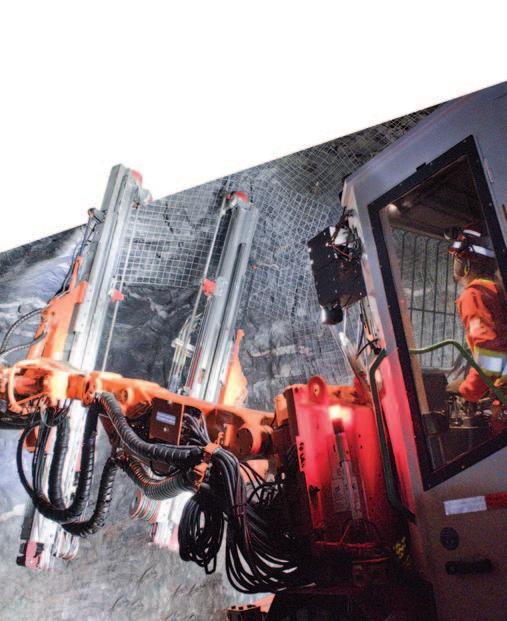
Davy declined to name participants on either the multi-stakeholder or industry advisory groups until the standard is available for public consultation, but said that the multi-stakeholder group is comprised of representatives from the investment community, buyers of mined products, civil society and international organizations. The industry advisory group has representation from various geographies, commodities and companies that have participated in each of the four standards.
Barrick Gold Corporation announced in a Nov. 28, 2023, press release that it was “actively involved” in the development of the standard, with a seat on the industry advisory board, as well as being a member of three of the organizations.
Mark Bristow, Barrick’s president and chief executive officer, stated in the release that the company supports the initiative and has long been an advocate for standards consolidation.
“Having one standard for responsible mining will not only provide clear direction on what good should look like but would reduce the complexity that exists with the numerous standards currently in circulation,” Bristow said. CIM



Graphite, which has generated renewed interest for its role in battery applications, is among the non-metallic minerals addressed by the updated industrial mineral guidelines.
Raiseboring Raise
Underground
Mechanical
Engineering
Specialty
The CIM Mineral Resources and Mineral Reserves (MRMR) Committee recently updated the CIM Industrial Minerals Leading Practice Guidelines for the first time in 20 years. The refresh covers all the same concepts as the 2003 version, and includes updates to reflect current industry practices in exploration, mineral resource estimation and mineral reserve estimation for practitioners working with industrial minerals in Canada. The document also provides enhanced clarity on the guidelines for working with certain industrial minerals.
Deborah McCombe, technical director of the global mining advisory at SLR Consulting and co-chair of the MRMR Committee, said that the update was needed because there are particular product specifications that only apply to industrial minerals and would not necessarily be covered in detail in the 2019 MRMR Best
Practice Guidelines for preparing mineral resource and mineral reserve estimates.
“We still refer to the MRMR industry guidelines that were updated in 2019, but there’s some more specific aspects that only apply to industrial minerals,” she said. “For example, the product quality specifications are really important, as well as you have to have a market to sell the mineral. The market might be rather small, and it might be very specific to the quality that you need, so those things need to be taken into consideration far more when you’re preparing a resource estimate and the reserves [for industrial minerals].”
The other reason for the update was to provide additional guidance on the various types of common industrial minerals, their properties and which categories they fall into. The document defined industrial minerals as being “generally considered to include non-metallic minerals, mineral products, or materials that provide raw material inputs for the construction, chemical, and manufacturing industries.”
However, it also stated that one of the key challenges of the industrial minerals sector today is “to define a commonly accepted listing of which types of minerals, materials or mineral deposits can be considered as industrial minerals.” To help address this challenge, the guidelines include a summary list of the most common industrial minerals.
“More people are looking at materials like graphite in more detail today, and so when that happens, it’s good to have an update on industry practices to get everyone up to speed and so they can keep their disclosures consistent,” McCombe said.
“Experience has shown that over time leading practices become industry accepted practices,” the document reads. “Current industry accepted practices are context specific and continually evolve as industry experience is gained, new technologies are adopted, and public expectations, market expectations and government legal frameworks change. All of CIM’s Leading Practice Guidelines are intended to be updated on a periodic basis.”
Led by Reno Pressacco, associate principal geologist at SLR Consulting Ltd. and an active member of the MRMR Committee focusing on best practices, the update took roughly a year and a half to complete. The process involved circulating a first draft to the MRMR Committee for comments before sharing it with members of the public, specifically those who are cur-
rently working in industrial minerals. Once those comments were incorporated, the document was sent to regulators for their review, and finally, to CIM council.
McCombe said the update will be particularly useful for industrial minerals practitioners who have just begun working with a new material. “It’ll be helpful for people that are maybe new to preparing, or newly involved with, say, something like graphite, and they’re getting up to speed on it,” she said.
Looking ahead, McCombe said that the Canadian Securities Administrators have advised the MRMR Committee that they are working on an update to National Instrument 43-101, which means there will be more work ahead for the committee as they collaborate to update some of their other guidelines in tandem.
“We’ve also heard from the regulators—the Canadian Securities Administrators—that they’d like to incorporate these guidelines into the companion policy to National Instrument 43-101 Standards of Disclosure for Mineral Products, so we’d like to keep those as up to date as possible,” she said. “And because these are incorporated by reference, it’s part of the guidelines that the regulators look to when they’re reviewing companies’ disclosure about their projects.”
– Mackenzie Patterson
On Jan. 11, Vale Base Metals announced on LinkedIn that the company’s Integrated Remote Operating Centre (iROC) has now begun to service all five of its underground mines in Ontario. The centre will officially service the Coleman mine, the Copper Cliff mine, the Creighton mine, the Garson mine and the Totten mine. Vale’s Ontario operations produce nickel, copper, cobalt, platinum group metals, gold and silver.
The centre, located at Vale’s North Atlantic Operations Centre in Sudbury, relies on digital technology to act as an “air traffic controller of sorts,” Vale explained in the LinkedIn post. The centre monitors underground mining activities on a continual basis, such as the use of company equipment and daily production, while offering direct feedback and, if needed, support. “It’s another way we’re leveraging technology to ensure we’re a safe, reliable, best-in-class operator,” Vale stated.
In an article published on Jan. 11 by International Mining, Vale told the pub -

lication that its “integrated remote operating centre combines proprietary and off-the-shelf technology to provide a comprehensive view of productivity and overall mine performance.” Vale added that through the centre’s updated location awareness, and the constant monitoring of hazards such as seismic activity, it expects emergency response times to be reduced.
This news comes after Epiroc’s Jan. 9 announcement, in which the equipment manufacturer stated that it had entered into a non-binding memorandum of understanding with Vale to collaborate on applying and upgrading Epiroc’s solutions for automation, electrification and digitalization in underground mining. The two companies will develop, test and utilize equipment and techniques in areas that include long-hole drilling, blasting, face drilling, bolting, mucking and hauling. This partnership will see Vale continue to use Epiroc’s technology in underground mining activities to remove employees from higher-risk areas, such as the rock face, production drilling locations and ground support areas, ultimately supporting safer mining activities.
“We are excited about our shared commitment with Vale Base Metals to accelerate the transformation of the mining industry through innovation that will keep pushing the benchmark of safety for workers, without compromising on productivity,” said Sarah Hoffman, vice-president of sales and marketing at Epiroc’s underground division, in the release.
– Ashley Fish-Robertson
Courtesy of Rob Labbé

By Rob Labbé
Part 2 of a four-part series on cyber resilience in the mining and metals industry
n the December/January issue, I discussed transitioning from cybersecurity-based approaches to protect operations towards a more holistic cyber resilience approach. While cybersecurity relies on deploying security controls to protect critical systems and technology, cyber resilience focuses on business objectives and how an organization can ensure those objectives are met.
Effective cyber resilience consists of three critical domains of equal weighting: operational resilience, resilient cybersecurity and resilient cyber communications. This article will dig deeper into operational resilience and how mining organizations can build more resilient operations.
While there are many potential causes of crucial technology and system outages, cyber resilience focuses on reducing the impact of those outages on production, ensuring continued operations for the time necessary to restore those services. As operations rely more on technology for basic operations, work to ensure operational resilience becomes even more critical.
Planning is a prerequisite for building cyber resilience. From the inventory of all systems and technology used, the “heartbeat” systems—those systems and technology without which operations cannot continue—must be identified. Disaster recovery and business continuity plans must be completed for the critical applications, network components and infrastructure that support the heartbeat systems.
Disaster recovery plans (DRPs) contain the processes necessary to restore systems to a functional state. Most importantly for cyber resilience planning, the DRPs must contain recovery time objectives (RTOs) indicating how long technology teams will take to restore the systems.
In contrast with DRPs, business continuity plans (BCPs) are focused on the business processes and how they can continue without those critical technology systems. The BCP documents the processes necessary to continue that critical business function without the technology. MM-ISAC defines a resilient operation as one where the BCP allows business to continue 50 per cent longer than the expected time to recover from technology and systems outages.
Of course, both these sets of plans must be continually tested, rehearsed and updated to ensure that all key teams involved in both business continuity and disaster recovery know their roles and so that performance assumptions in those plans continue to be accurate over time.
To illustrate how an operation can establish and maintain operational resilience, let’s look at one function in a typical mine: haulage. For this example, let us assume a traditional open-pit operation, utilizing a fleet of haul trucks moving
material from the pit to the plant for processing. In order to safely co-ordinate the movement and assignment of those haul trucks, the operation has deployed a computer-based dispatch system used by the mine dispatchers to track the location of trucks, assign trucks to their destination and resolve any routing conflicts that will impact the efficiency of the haulage operation, providing guidance and directions to the operators through their in-cab computers connected to the mine’s wireless network.
To establish resilience, the heartbeat technology must be identified, and DRPs must be developed to guide the restoration of those systems. In this case, the heartbeat systems and their RTOs are identified as:
System Description Recovery time objective (RTO)
Dispatch Software and hardware 5 days system that run the dispatch function, including the dispatch office PCs and the in-cab mobile computers
Mine Mine wired network, 2 days wired switches and routers that network connect to the mine dispatch PCs and servers
Mine Mine wireless network 10 days wireless connecting mobile network equipment to the larger mine network
To ensure the mine haulage function is operationally resilient, the BCP developed is a set of processes and procedures to manually dispatch vehicles, utilizing radio communications with dispatchers, for 15 days. To validate this plan, a tabletop exercise is conducted, followed by a live test over the course of one shift. This test identifies that, while operations can continue in this manual mode, there is a 15 per cent loss in efficiency. The operation leadership views that loss as acceptable for a maximum of 15 days and signs off on the plan.
Fast forward to the future, and in this case study this operation has decided to deploy an autonomous haulage system (AHS) to replace the fleet of operator-driven haulage vehicles. The deployment of the new AHS will replace the dispatch system, resulting in a change to the list of heartbeat systems as follows:
System Description Recovery time objective (RTO)
AHS Software and hardware 10 days system that run the AHS system both on the network and in the haulage vehicles
Mine Mine wired network, 2 days wired switches and routers that network connect to the mine dispatch PCs and servers
Mine Mine wireless network 10 days wireless connecting mobile network equipment to the larger mine network
Notice that due to the increased complexity of the AHS system over the previous dispatch system, the recovery time to restore functionality has increased to 10 days. In developing a BCP to cover the 15 days necessary, the operation hits a snag. While the existing manual dispatch procedures would remain effective, there is no possible solution to staff all the trucks with drivers. The best-case scenario would have only 15 per cent of the trucks manned with qualified, current drivers who can safely operate the trucks. This would lead to a loss of 85 per cent in haulage efficiency for the 15 days. That level of mine performance would result in the plant being starved for input and a plant shutdown. Operation management identifies that the site can only absorb an 85 per cent loss of mine productivity for one day before production must stop—the operation is no longer resilient.
This scenario illustrates the challenges operations face as they deploy new technology; be it automation in the mine or machine learning and artificial intelligence in the plant, often, resilience is lost.
To restore resilience in this scenario, the operation must reach a point where the plant will no longer be starved for input material should an outage occur. A full process view of cyber resilience will help the operation solve this issue. Teams at the site propose solutions to the problem:
Technology team: Deploy fully redundant systems for the AHS, wired and wireless systems. This will include developing a complete “warm standby” system that can be activated in the case of a failure, stocking critical spares for all network equipment for immediate replacement and ensuring that the necessary technical capabilities are always available on short notice. This will reduce the RTO for all systems to less than 24 hours. However, the cost will be significant, nearly doubling the operational expenses of the AHS system.
Mine operations: Ensure sufficient trained drivers at the site to operate the haulage fleet in case of an AHS outage by cross-training staff as haul truck operators. This, however, poses other challenges: first, there is a cost to train and maintain skills in that group of operators, and testing shows that if deployed, their lack of practice will result in an increased efficiency hit. In addition, union contracts do not currently allow union staff to be used this way, so an agreement with labour unions will need to be secured.
Plant team: Increase the ore stockpile from one day to 15 days to maintain plant operations while the AHS systems are recovered. This solution will require sufficient space for the stockpiles and a further increase in mining rates to establish that stockpile.
In isolation, each of these solutions to re-establish resilience is costly and potentially disruptive to the operation. By taking an overall view of the business process, the operation can combine lower cost options to achieve resilience. For example, the operation can implement a handful of lower-cost, high-value redundancy options that reduce the RTO from 10 days to six, thus reducing the period that needs to be covered by the BCP to nine days. To ensure the plant has sufficient feedstock for that period, the site decided to take advantage of an upcoming maintenance shutdown at the plant to build a stockpile to buffer any AHS outage.
By taking a full business process view of resilience, operations can protect themselves from all types of outages. This is a more effective and easier-to-manage approach than the traditional approaches of applying excessive cyber controls to cover cyber risk, redundancy to take care of technology risk and separate business process changes for other risks. Rather than focusing on individual risks and domains, the operation eliminates the impact of the outage by focusing on the result—in this case, maintaining ore supply at the plant.
In the March/April issue, I will focus on resilient cybersecurity. CIM


By Mackenzie Patterson
Each week, about 500,000 Canadians are unable to work because of mental health challenges, according to a 2019 report from Deloitte. The Toronto-based research institute Future Skills Centre surveyed more than 500 Canadians about this issue for a June 2023 report titled “Improving the Quality of Work in Canada: Prioritizing mental health with diverse and inclusive benefits” and found that 38 per cent of the respondents reported that their struggles with mental health had caused them to take time off work over the past five years. Of these, 80 per cent noted that the “demands of their job and work environment” were key factors in these struggles.
While mental health concerns like stress, depression, anxiety and burnout are common across the workforce today, they are especially prominent in certain industries—including mining.
In 2019, Laurentian University’s Centre for Research in Occupational Safety and Health (CROSH) released the results of a landmark study it had conducted in partnership with Vale and the United Steelworkers Union (USW) titled “Mining Mental Health.”
The project looked at the mental health of 2,224 Vale mining workers across its Ontario operations over a three-year period and found that more than half (56 per cent) reported symptoms of mental health conditions such as depression or post-traumatic stress. It also found that for more than 23 per cent of respondents, stress levels were “concerning,” and that symptoms of stress were exacerbated for workers who spent a significant amount of time underground.
Lisa Lounsbury, an Ontario-based mental health trainer, has worked for several mining companies with a presence in
northern Ontario through her company New Day Wellness Inc. Having grown up in Sudbury with her father and many of her friends working in mining, she said she has long understood the impact working conditions in mining can have on mental health.
“A lot of workers work in the dark, they work under dangerous conditions, there are near misses, there are fatalities. It’s a highstress environment,” Lounsbury said. “Often, it’s not a healthy working environment, especially if they’re working in remote communities. They’re not eating well, they’re not sleeping well, they’re lonely, they’re away from their families. The industry can be hard on employees.”
The high rates of mental health conditions among Ontario mining workers highlighted by the Mining Mental Health study are concerning, not only because it could result in a lower quality of life for these individuals, but there is also a higher margin for serious accidents in the mining industry. With this in mind, the ripple effects of poor mental health in the industry have the potential to be truly tragic.
Lindsay Digby is a health and safety specialist and Canadian Mental Health Association-certified psychological health and safety advisor at Workplace Safety North (WSN), a not-forprofit health and safety association that serves Ontario’s mining and forestry industries. WSN offers several workplace mental health training programs that can help organizations gain a better understanding of how mental health impacts
performance, and how to recognize the signs of a mental health issue in colleagues.
“We tie in the concept of being fit for duty to this conversation, because mental health—you can’t leave home without it,” she said. “When you show up to work, whether you’re having a good day or bad day, it’s going to impact performance.”
“We need to make mental health as important as physical health.”
– Sandor Basa, underground supervisor and miner at Vale Canada
WSN’s training programs cover a broad range of crucial topics related to mental health, including definitions of mental health, mental harm and mental illness, and why it is important to distinguish among the three. They also leverage the Mental Health Continuum Model (MHCM), developed by the Mental Health Commission of Canada, to help participants recognize signs and indicators of declining mental health. The sessions help to arm employees with various tools and resources to navigate mental health concerns in the workplace, including a lesson on how to implement a “personal action plan” if you do notice that your mental health symptoms are worsening.
Since the launch of its mental health related programming in 2021, 4,217 people in the sectors that WSN serves have participated. Of these, 87 per cent said that their mental health knowledge had increased from the training, while 81 per cent said they now feel comfortable talking about mental health in the workplace. What is more, 87 per cent of participants said they have changed their own practices or behaviours since participating in the training.
Although Digby emphasized that arming employees with mental health awareness and training is crucial for all industries, she said that it can be especially life-saving in industries like mining.
“A few years ago, when we had done the risk assessments for the mining and forestry sectors, this concept of psychological safety continued to bubble [up] in the top 10 risk factors,” she said. “If your mind is not on the task at hand, or you’ve got so much on your plate that you can’t think straight, that’s going to play a huge part in whether you have the ability to keep yourself safe, and also others in your environment safe.”
Lounsbury added that although the conversation surrounding mental health has been evolving over the years, it was not until the COVID-19 pandemic hit that companies began to recognize the inextricable link between employee mental health and performance at work.
“Employers can no longer ignore it. They can’t say, ‘well, it’s someone else’s problem. It’s not mine.’ It is their problem because it’s affecting their bottom line,” she said. “They’re losing employees, either to mental health or depression, some to suicide; some are leaving the companies if they don’t feel supported; so they really have to ride this wave of educating and supporting mental health for their workers. [Ignoring it] is not an option.”
Although all companies should be engaging their employees in some sort of mental health training or dialogue, some business leaders may be unsure of how to get started, or may be intimidated by the plethora of information that is out there today. According to Lounsbury, however, it does not need to be complicated. To get started, all you have to do is provide employees with the time they
need for a training session. She said one of the most popular mental health training programs that she facilitates for Canadian companies is Mental Health First Aid (MHFA) by the Mental Health Commission of Canada.
“The feedback has been incredible,” Lounsbury said. “I’m seeing men and women opening up about their own struggles for the first time, and having those ‘aha’ moments like, ‘oh, I don’t have to be the one to fix it, but I can certainly be the one to support someone with empathy.’ We don’t learn this in school, so I will continue to provide these trainings—even though I sometimes have to travel to remote areas to deliver the course—because I see the impact it’s having.”
Sandor Basa, an underground supervisor and miner at Vale Canada, has seen first-hand the impact that poor mental health can have on people in the mining industry throughout his 30-year career. He said while it is still too early to see positive changes from mental health training in the mining industry, more companies are making mental health in the workplace a priority, and demand for training has gone up.
“Up until the last couple of years, no one discussed being mentally fit for work, no workers dared to bring up any kind of mental distress to their employers,” he wrote in an email to CIM Magazine. “They put on a fake smile and did their best to get through another day. Those barriers and walls are coming down, piece by piece, brick by brick. It’s going to take an effort from everyone to make it work.”
Basa believes mental health training could ultimately be lifesaving for people in the mining industry. He cited an example from a Sudbury mine, where a miner attempted to die by suicide in the bathroom stall at work. Fortunately, he wrote, they were unsuccessful, but he believes incidents like these can potentially be prevented through further education and training.
“If only they felt comfortable reaching out for help, or if someone saw the signs, it could have been prevented,” he wrote. “This just shows that our industry, and all industries, have a long way to go. We need to make mental health as important as physical health… As long as we keep taking baby steps forward, we will reach our ultimate goal, but it can’t just stop at a mental health course—companies need to put these learnings into action and continue educating everyone from the person at the very top to the people at the bottom.”
Overall, Digby believes that companies are beginning to recognize that employee mental health is a crucial component of a healthy and thriving business ecosystem.
“We are starting to understand the relationship between wellbeing inside of work and outside of work a little more holistically,” she said. “Generally speaking, companies want to do the right thing, and they want to make sure that their workplace is not going to hurt people, physically or psychologically. As organizations start to develop these wellness, mental health and psychological safety strategies in the workplace, the benefits will be exponential.”
CIM
Mining and Mental Health will run throughout 2024 and showcase the people, programs and initiatives that are prioritizing the mental health of mining workers. Each article will examine how to improve worker mental health, which is key to a safe and productive workplace. If you have a story tip, email editor@cim.org.

Beyond gaming and retail applications, the virtual world is showing major promise for training in the mining sector
By Rosalind Stefanac
Picture being able to train employees in a space that realistically replicates a mining site—hazards and all—with zero risk of injury. Now imagine that your employees are significantly more likely to retain and implement the information provided compared to traditional training platforms.
The reality is that this learning environment already exists via the metaverse, and more and more mining companies are discovering the merits of this virtual world in providing an engaging and safe way to upskill their employees.
Technologically speaking, the metaverse is a 3D-enabled digital space that uses tools such as virtual reality (VR) and augmented reality (AR)—in addition to other technologies, such as artificial intelligence (AI)—to allow users to have immersive, lifelike experiences within virtual settings. What differentiates the metaverse from VR and AR training tools is that it is a multidimensional, interoperable network of virtual environments that can be experienced simultaneously by many users.
As the technology becomes more advanced, so do the possibilities for people to interact with each other in real-time within spaces that mimic real-world environments. Even more impressive is that these virtual worlds are becoming increasingly accessible, as they can be streamed through various devices, including the average laptop or smartphone.
Chilean company Minverso has the first metaverse-based training platform in the world with applications for the mining
sector. The platform allows users to explore mine sites virtually and even simulate the repair of mining equipment, with the ability to have up to 15 users in one room simultaneously.
Pablo Moya, Minverso’s director of development and operations, said the company is working with mining companies to develop training processes for specific tasks such as coal and copper extraction and the operation of complex machinery. It also has an online platform where the traceability of the training and learning activities carried out on it can be made, delivering relevant metrics and data. Compared to standard video or PowerPoint presentations, Moya said being able to learn in this immersive environment has been shown to be 10 times more effective in helping trainees retain information and makes them 275 per cent more confident in being able to apply the skills they have learned.
“There’s also zero risk for workers and assets, which is very important as there are a lot of risks in a real mining site,” said Moya. “Here, workers can enter the space as many times as they want, make mistakes and ask many questions, so when they enter the real space, they’re much more prepared.”
Safety is certainly a key factor driving the appeal of the metaverse for training purposes in mining, said Mary Poulton, a former University of Arizona professor in mining and geological engineering who spent 30 years researching machine learning and AI, and is the founder and CEO of Desert Saber. The company is developing metaverse training software, and initial client training classes using its software will start this April.
Poulton said the metaverse now allows users to be put in stressful situations without any risk, and it can also quantify their skill levels and performance changes over time. “Here you can challenge them about what they’ve learned and put pressure on them to do things quickly to see how they react,” she said. “Just about any issue in a real work context, with multiple people, distractions and movement, can be experienced with our software.”
Another bonus is that there is an opportunity to access these kinds of synthetic learning environments even without VR headsets and other hardware. “When the graphics are very photorealistic and the work environment feels real, you find that you’re quickly immersed in that setting regardless of the screen size,” she said.
As the technology continues to evolve, Poulton expects mining clients will use the metaverse to create their own virtual communities to connect and train employees at their work sites around the world. “It could be just who an organization wants in there, including contractors and other parts of their supply chain,” she said. “Or something more open [concept] where you’re dealing with the dynamic of anyone else wandering through while trying to do your job.”
There is also the potential to train employees in disparate or remote sites simultaneously, using AI to translate information into local languages in real time. “It’s taken a long time to get here with this technology, but we’re here,” she said.
Tallying the price of hardware, software and network infrastructure needed to support a metaverse mining environment comes with significant investment.
“The mining sector has done well [as is] so it’s hard for them to quantify exactly how much return they’ll get on these capital investments,” said Neil Sahota, CEO of ACSILabs in California and an AI advisor for the United Nations. But eventually, as with most technologies, if a company does not get on the train, it may be left behind.
Data security is another issue that becomes much more prominent in a virtual world. Given that the mining industry is bound by numerous regulations—including data protection laws—Sahota said non-compliance can result in hefty legal penalties. More than ever, organizations will need to safeguard their systems from cyber threats.
But he said mining companies also recognize they ultimately need to get on board as metaverse technology has the potential to enhance safety and optimize operations, leading to increased profitability and sustainability. Plus, with the gamification aspect and endorphin rush that comes with training in the metaverse and feeling like you’re really there and doing tasks on-site, he said employee adoption of the technology has been very good.
“Like it or not, mining companies are going to have to adapt,” said Sahota. “They’ll be focusing on employee upskilling with safety practices and equipment, but there will also be management using the metaverse to experiment with different mine designs, finding ways to optimize orebodies.”
According to Inga Seelemann, natural resources metaverse lead for North America at global consulting firm Accenture, the mining industry in Canada is already on its way to exploring and adopting the metaverse as a key tool for training and business optimization. “What’s interesting about this journey in mining is that there is recognition that the evolution of this technology
is critical for success,” she said. “[Mining organizations] are a critical part in achieving the energy transition and the goal we have for the planet going forward, so they’ve got to think about how they can transition operations to be able to generate the capital to make the investments they need.”
While she noted that some companies are focusing more on creating digital twins of their mine sites so they can support training initiatives around safety and employee familiarization, others are centring on using the metaverse to connect their sites and get a better handle on how each one is operating. Employers can even think about business operating models differently through the metaverse, she said. Rather than having specialists operating equipment at various sites, for example, there could be one specialist located safely at a remote operating centre. When they are needed to go in, they could familiarize themselves with the site beforehand using the AR/VR technology.
Like other industries, mining is undergoing a generational change in its workforce, and technology like the metaverse can help to ease the transition. “Think about a metaverse example where I could actually walk with a senior employee who has been at a mine for a number of years and get a better understanding of what they do…without having to actually be on site,” said Seelemann. “It’s very powerful.”
Beyond practical applications in upskilling employees in the field, opportunities to train students in the metaverse are also on the horizon. At Queen’s University in Ontario, second- and third-year mining and mineral processing students are already using a VR simulation of a concentrator that mimics an environment they could encounter on the job. Within a 20 x 20-foot space in the university’s Teaching and Learning Centre, students don headsets to be immersed immediately in a mining environment where they are assigned a task, such as checking that the pulp density in the ball mill is on target and making adjustments as needed.
“We’ve had a hugely positive response in terms of student engagement in the course material and their understanding of the spatial configuration of a mineral processing plant,” said Charlotte Gibson, assistant professor at Queen’s University and associate head of its department of mining, who initiated development of the VR concentrator at the start of the COVID-19 pandemic. She has also received inquiries from another Canadian university that is interested in replicating the process.
While students are entering the mining simulation on an individual basis for now, Gibson said getting to the point where they can interact with others in a metaverse environment is not far off either. “It would be really interesting to replicate a mining site where the students have to engage with different groups from the local community on things like environmental issues and permitting…there are so many possibilities, provided there is funding to develop it,” she said. “It’s not a huge step [technologically] for us to get there.”
For making decisions around how to proceed through this new virtual world—whether for training purposes or otherwise—Accenture’s Seelemann advised those in the mining sector to embrace the journey. “Once you’ve started to build and develop this digital view of your mine, it’s not one and done,” she said. “Understanding how your organization is connected and really thinking about talent on both sides of the coin will make the journey easier.” CIM

An industry-backed training program is helping to boost the Indigenous workforce in Saskatchewan’s potash industry
By Sarah St-Pierre
When Jordyn Dewhurst enrolled in a potash mining training program, she did not picture herself utilizing walkie-talkies and Lego bricks in class. Yet the activity, in which students blindly recreated structures from spoken instructions, demonstrated just how important good communication is in a mining environment, where accidents can happen without it.
“I was never taught to practice [communication skills], and it’s definitely something that is used because there’s a lot of communication with dispatch in the mine itself,” said Dewhurst, who now works in mining operations at The Mosaic Company’s Esterhazy mine in Saskatchewan.
The training program she completed—Digital Transformation in Potash Mining (DTiPM)—was one iteration of a course offered by Morris Interactive to Indigenous students in Saskatchewan to facilitate their recruitment in the potash mining industry. Since an initial pilot in 2022, the DTiPM program has been travelling to reach different communities.
Students can build the skills they need to enter the industry, be it working directly for mines like those owned by the program’s industry partner Mosaic or somewhere along the supply chain. Four cohorts have now graduated, and one new group started running in January. Out of the 35 graduates so far, 29 have either found a job or pursued further education. The program has recently expanded its offerings, delivering a pilot of a Digital Transformation in Potash Mining Construction program, which was developed to prepare students for the ample mining construction opportunities in Saskatchewan.
The DTiPM program came from a conversation Lester Cey, principal consultant of business development at Morris Interactive, had with a mining consulting contractor. The latter expressed that he felt there were not sufficient pipelines for Indigenous individuals looking to join the potash mining workforce to meet the needs of the industry. “I was curious about what we might be able to do at Morris Interactive, simply because we are a training company,” Cey said.
From there, the ball got rolling. Within two and a half years, and with support from the International Minerals Innovation Institute, Mosaic and Cowessess First Nation, a pilot was launched in 2022. After its success, the DTiPM program began to grow, expanding its partnerships with more First Nations and Métis communities, First Nation Tribal Councils, as well as with supply chain partners like Peter Lucas Project Management.
“There’s a strong desire for Indigenous talent within the industry, and by completing the Digital Transformation program the students are showcasing their unwavering dedication to not only their careers but also themselves, their families and their communities—giving them more credibility from an employment standpoint,” said Taylor Opdahl, manager of the digital transformation in mining division at Morris Interactive.
In 2022, Mosaic invested $1 million in the DTiPM program to help it expand to more Indigenous students over the following five years. The investment is in line with the company’s environmental, social and governance (ESG) targets, one of which is
to have at least 15 per cent of new hires be Indigenous workers by 2025. Mosaic’s investment was in part motivated by the close presence of First Nations around some of its Saskatchewan potash sites.
“If you say, “We want to have more Indigenous people in our workforce,’ it doesn’t just magically take place without being strategic, intentional, setting some goals and making some investments,” said Tyler Hopson, government and stakeholder relations manager at Mosaic. “It is a commitment, but it definitely pays off.”
Not every graduate from the DTiPM program is expected to go to work directly for Mosaic, but the company still sees its investment as justified. Students may go on to work for suppliers or in a related industry, but even if they do not, they still leave the program with a first-hand understanding of potash mining and where the industry’s opportunities lie. “That’s always a challenge for lots of industries, but particularly ours, where people maybe don’t have a lot of information about all of the opportunities,” Hopson said.
Barry Sparvier, director of employment and training for Cowessess First Nation, worked with Morris Interactive for the two iterations of the DTiPM program that have run in Cowessess so far. He remembers how, growing up, there were always people around him, including his father, trying to get into the potash industry. They typically did not know how, or applied and never heard back.
“People always wanted to go work in the mine because they knew it was a good, paying career and that they would be able to sustain their family and maybe help the Nation themselves,” he said. Now, he gets thanked by DTiPM program alumni when he is out and about. “The program, no doubt, has been successful in opening the doors for Indigenous people to the mining industry.”
Dewhurst, who is from the Prince Albert area of Saskatchewan, completed the program in Saskatoon in February 2023 and now works for Mosaic. She credited the help she got through the DTiPM program in preparing for interviews and building a resumé for mining for getting her foot in the door. “It’s helped my life tremendously,” she said. “I can’t complain. The hours are good, my crew is amazing and the money is great.”
While she was a student, Morris Interactive helped her receive the financial support from her community that she was eligible for, in order to offset the costs of not working while taking the course. She applied for money from her band, Montreal Lake, and received it the next day.
According to Sparvier, providing an income for students is a key aspect of what makes the DTiPM program successful in attracting applicants. “It’s not guaranteed that you’re going to get a job in the industry after the program, so it may be unrealistic to quit your job to take the program,” he explained. He believes the life skills acquired in the program, like financial literacy, are important in setting up students for success in the workforce.
After authoring the DTiPM program’s contents and textbook, Morris Interactive senior instructor Benjamin Williamson
became its instructor. “The curriculum is a very holistic approach to mining in general and then then drills down specifically on potash,” he said. Historical perspectives on mining, the business of mining and interviewing skills are also mainstays of the program.
“It’s a foundation to get them going on any mining job,” Williamson said, so that students can acquire entry-level positions and specialize as they please, or go on to further their education.
During the first week, students go on a tour of a Mosaic mine site. There, they get a taste of what it feels like to be a kilometre below ground, or nine storeys high in a vibrating mill, according to Williamson. If students realize the work environment is not for them, they can then opt out right away.
Throughout the DTiPM program, Williamson also stresses the values and skills that are expected in mining, such as safety, work ethic, community-mindedness, teamwork and good communication, to name a few. To develop these, activities like virtual reality safety training that is specific to potash mining and the walkie-talkie communications exercise complement lecturing. “One of the values in Indigenous education is humour,” Williamson said. “And so, learning through laughter is part of the course.”
Throughout the program, sponsors come to discuss what they are looking for in employees. After eight weeks in the classroom, students return to operation sites, where they go through a two-week practicum to experience the work for themselves.
So far, the industry reception has been favourable. Of the eight graduates from the latest cohort that ran in Cowessess last fall, seven have been offered careers in mining, according to Opdahl. However, despite already successful placement rates, even more effort is under way to keep facilitating graduate employment.
“The program is excellent in providing the skills and tools for the people, but there was a bit of a gap in getting them to connect with potential employers,” said Leah Lagacy, brand and engagement manager at Peter Lucas Project Management. The company extended its web-based human resource tool to the students to create their digital resumés, complete with a video to introduce themselves. This platform lets prospective employers find all of the DTiPM program graduates in one place.
Spurred on by the current success and expansion of the program, Morris Interactive is now working towards adapting the formula to the uranium sector. It plans to maintain a similar balance between technical and soft skills in the future curriculum, having seen the transformative effects they can have on students’ confidence.
Overall, both Cey and Opdahl credit how far the project has come to the strength of the various partnerships involved in its creation, financing and delivery.
“Industry and supply chain [companies] that we have tapped on the shoulder, or at least engaged with, are way further along in this journey [than expected] in terms of the commitment to walking alongside our Indigenous folks for the betterment of our overall society,” Cey said. “It has been so cool to watch or to be a part of something where we’re walking alongside each other.” CIM

Ryan Montpellier has over 15 years of experience in identifying and addressing human resources and labour market challenges in the Canadian mining industry. Appointed as executive director of the Mining Industry Human Resources Council (MiHR) in 2008, he leads all of the council’s strategic activities and represents it on various industry and government committees and advisory panels. He is a past recipient of the CIM-Bedford Canadian Young Mining Leaders Award and is a past CIM Distinguished Lecturer.
In October 2023, MiHR released a report called “2023 From Classroom to Mine Site: A Review of Canada’s Post-Secondary Education Pipeline for the Mining Sector,” as well as the results of a survey of young Canadians’ perceptions of and interest in a mining sector career. CIM Magazine spoke to Montpellier to find out more about MiHR’s findings and its recommended solutions to the issues that these initiatives identified.
CIM: What are some of the factors influencing the current labour shortage in the Canadian mining industry?
Montpellier: There are a number of things contributing to what is a very tight labour market at the moment. The first is that the employment levels in the mining industry have been trending upwards for the past two years. It is up by over 40 per cent since 2022, and we’re seeing jobs being added across all sub sectors— not just extraction, but also in mining support services, mineral processing and refining, primary minerals and metals fabrication.
It is important to note that this employment growth doesn’t yet factor in the huge increase in investment in critical minerals in this country. In fall 2023, NRCan published a list of major projects in the pipeline—either in advanced development or under construction—over the course of the next 10 years, and there is almost $100 billion of new mining projects. While not all of these will turn into mines, many of them will, and many are already under construction. When we start bringing some of these new mines online, that will only expand the need for employment in the industry.
MiHR executive director Ryan Montpellier discusses how the Canadian mining industry must address decreasing enrolment trends in mining education and a lack of youth awareness about opportunities in the sector
By Ailbhe Goodbody
But when we look at the supply side, first of all, unemployment is at record lows. The unemployment rate in the Canadian mining industry is sitting at about 1.6 per cent, and there are currently about 10,000 vacancies that aren’t filled, so we’re not able to meet our labour needs today. These factors are creating a perfect storm of high demand and high growth at a time when the current workforce is aging and leaving the sector—about one in five people in our industry are now over 55 years old, so we are going to see a massive exodus of people when we need them the most—and the talent pipeline that has historically provided the labour supply for the mining industry is no longer interested in careers in our sector.
CIM: MiHR recently did a survey of young Canadians to measure their perceptions of careers in the mining sector—could you tell me about its findings?
Montpellier: In 2020, MiHR engaged Abacus Data to poll 3,000 young Canadians aged 15 to 30 about their perceptions of careers in the mining industry. In August and September of 2023, we ran the poll again, this time with a smaller sample of 1,500 students, but from every region of the country—rural and urban, northern and southern—to try to get a better understanding of youth perceptions of careers in mining, including how it compares to other industries, and what is driving their career choices.
There was some good news and bad news in the results. The unfortunate news is that only 27 per cent of the youth surveyed had a positive view of mining; the other 73 per cent either had a negative, very negative or neutral view about the mining industry. When we compared mining to their impressions of a number of other sectors—such as high tech, construction, financial services, transportation, manufacturing, health care and oil and gas—mining ranked dead last in the list of sectors.
The polling also showed that youth perception of the industry is very dated and inaccurate. When we asked participants the words they associate with mining, the top 10 words included
“dangerous,” “dirty,” “hard labour” and “coal.” There is a general lack of awareness of mining careers, as most kids don’t grow up in a mining town and don’t see mining in their backyard.
When we dug a little bit deeper, and asked them about specific perceptions about the sector, they viewed mining as having good pay and benefits and having decent jobs available with good opportunities to advance, but also as being unsafe and not providing a good work-life balance. We have spent the last 30 to 40 years making mining safer in this country, and I would say Canada is now a global leader in mine safety, but that message is not known outside of the industry.
The polling data was really informative, not only to help us identify where mining stacks up vis-a-vis other sectors, but what the specific barriers were to encouraging youth to pursue careers in mining. We need to convey a different message, dispel those negative perceptions and stereotypes, and make the link between what the mining industry actually offers and the career choices that exist in the industry to get more youth in cities like Toronto, Montreal, Ottawa or Vancouver [involved in mining] to reposition mining as an industry of the future.
CIM: Why did MiHR decide to review Canada’s postsecondary education (PSE) pipeline for the mining sector, and what are some of the key challenges the programs are currently facing?
Montpellier: We wanted to do a more thorough assessment of the current PSE system in Canada and how it is meeting or not meeting the needs of the industry. We had noticed some alarming trends with respect to declining enrolment, and we wanted to look deeper into why those trends were happening to get a better understanding of what’s driving the change and how significant that challenge really is. I believe it is the first ever indepth research on this topic; certainly, we haven’t done anything like this before at MiHR.
The big takeaway was that the mining programs in Canada are small, relative to their other [non-mining] programs, and they are shrinking at an alarming rate.
To give one example—across the 10 Canadian universities that provide mining engineering programs, enrolment is down by over 50 per cent since it peaked in 2014. We are seeing similar trends in the geosciences and the mining technician programs at colleges, which have historically been the primary source of skilled labour for the mining industry. Not only are those programs small and shrinking, but often the students are in those programs because they were not admitted into the programs that they wanted; so mining was their second or third option, and they settled for mining engineering because they couldn’t get into civil or electrical or mechanical engineering.
What is also alarming is that there is a disconnect between industry demand and enrolment in these programs. For the last three or four years, there has been a sharp increase in demand for these mining engineering graduates, but we haven’t seen the related increase in enrolment.
In addition, the programs are expensive to operate, and some are running at under 50 per cent student capacity. It is only a matter of time before the universities decide that it is no longer feasible to run some of these programs. We saw that with Dalhousie University in Halifax, which has closed its mining engineering program, and unfortunately, this year will be the last year that they graduate people from that program. Our concern
is that other mining engineering programs could follow suit, which is something that we do not want to see happening.
CIM: How does MiHR recommend addressing the challenges highlighted in the report and the youth survey?
Montpellier: There are a number of things that MiHR is doing to address them, such as a campaign called “We Need Mining, Mining Needs You.” The campaign website has resources like career guides, career profiles and videos that showcase the modern mining industry in our communities. We want to dispel some of the myths associated with the mining industry, for example by highlighting the positive impact that mining has on the transition to a low-carbon economy, the need for critical minerals to create that low-carbon economy, and the health and safety record of this industry, which is indisputably fantastic compared to a number of other sectors in the country. This campaign is all about providing modern, accurate career information about the Canadian mining industry, and conveying to youth what the real opportunities are.
We have launched other programs specifically to support youth, including the Career Ambassador Program in partnership with CIM, which is all about getting industry leaders into classrooms to talk about the modern mining industry and give them the right tools to do that.
In 2023, MiHR provided over $2 million to schools to provide scholarships to try to get more students interested in miningrelated PSE programs. There are also wage subsidies, such as MiHR’s Gearing Up initiative to help employers hire co-op students in mining-related fields through work-integrated learning.
There is an opportunity for the mining industry to engage a more diverse workforce. It is about changing the culture and practices of the industry to remove some of the systemic barriers to make the industry more attractive to women, to new Canadians, to people living with disabilities, to people of colour. These are all challenges that our industry is tackling today, but when we look at the enrolment data for mining-related PSE programs, only 15 or 16 per cent of the students enrolled in mining engineering today are women. For us to think that we are going to suddenly attract hundreds of new female mining engineers— well, they’re just not studying those programs. We have to start earlier to build a more diverse talent pipeline, so that ultimately, we get a more diverse workforce. Part of the objectives of our various initiatives is to tackle those specific talent pipeline issues so we can get to the root causes earlier.
In 2024, one of MiHR’s objectives will be to operationalize the “We Need Mining, Mining Needs You” campaign to get industry buy-in and support behind it and develop a pan-Canadian strategy to work more collaboratively to grow the labour pool at an industry level. Those initiatives, to me, are the solution—if we can get more students into the classrooms, it will lead to a more robust talent pipeline and, ultimately, a more robust labour pool.
A larger collaborative industry effort is required to help attract the next generation of mine workers in this country. We need mining companies to step up and support a much broader industry effort to get more people interested in mining careers, and ultimately fill the classrooms of the mining-related programs, and then companies can distinguish themselves as an employer of choice and carve out their slice of that labour pool. That is not something that MiHR, CIM, PDAC or the mining associations can do alone. CIM

The last few years has pushed a new wave of resource nationalism, and it is likely to grow as global demand for critical minerals continues to push countries to protect their supplies
By Kelsey Rolfe


Richard Williams used to talk up the benefits of investing in Tanzania. As the chief executive officer of Winshear Gold—formerly Helio Resources—recalled, the East African country had a lot going for it when his company acquired the SMP gold project in 2006. The presence of major players like Barrick Gold and AngloGold Ashanti in the country meant there were acquisition opportunities for a junior miner that struck a favourable deposit, and sent the right message to investors about Tanzania’s attitude towards foreign companies.
Williams also touted the country’s mining laws, which allowed a company to convert a prospecting licence to a retention licence that gave it up to 10 years to do additional work on a fledgling project and wait out unfavourable economic conditions.
That changed following the election of President John Magufuli in 2015. Tanzania overhauled its mining act in 2017 to boost royalties on gold from four per cent to six per cent plus a one per cent export fee, introduce the requirement for the state to have no less than a 16 per cent interest in the capital of mining companies, and give itself the ability to cancel or renegotiate mining contracts. It also later removed retention licences from the act entirely, leaving Winshear and other juniors in limbo.
Williams said the company was told the Tanzanian government had no intention of expropriating mining concessions. Then, in late December 2019, the government publicized a list of properties being put out to tender; SMP was on it. Williams received the news of the list with “shock and disappointment.”
The company sought arbitration at the International Centre for Settlement of Investment Disputes, and in the fall of
2023, Winshear reached a US$30 million settlement with the government.
Winshear’s tussle with Tanzania turned out to be a precursor to a growing wave of resource nationalism. The term has historically invoked asset seizures and the nationalization of entire industries, but experts now include other reforms that countries enact in service of deriving greater benefit from their mineral resources under the resource nationalism label. These include tax and royalty increases, raw material export bans and setting joint venture requirements between private companies and state-owned miners—and even the critical minerals strategies and legislation that Canada, the United States and the European Union have implemented to encourage the development of domestic green industries or mandate local content.
“Resource nationalism has evolved a lot over the past five years. It’s no longer just about the state taking greater control, but also about the discussion of resource governance and resource security,” said Jimena Blanco, the Spain-based senior research director and chief analyst at Verisk Maplecroft. “It’s become a much more nuanced conversation about taking control or having influence over strategic resources.”
Donald Kingsbury, an assistant professor in political science and Latin American studies at the University of Toronto’s Munk School of Global Affairs and Public Policy, drew the distinction between two separate but interrelated trends: gestures towards more traditional resource nationalism, such as those in South American countries, which he said “resonates with an entire history of anti-imperialism, social movements and struggle,” and


the simultaneous reintroduction of industrial policy in north Atlantic countries.
According to Wojciech Ostrowski, senior lecturer at the University of Westminster in the U.K. and the co-convenor of the university’s climate change, energy policy and sustainability research group, resource nationalism is commonly, but incorrectly, seen as a cyclical phenomenon tied to commodity price booms. Economists and researchers often point to the resource nationalism of the 1920s and ’30s, the 1970s and the early 2000s as evidence of its repeat nature.
But, as Ostrowski argued in a 2023 paper in the journal Resources Policy, that understanding masks the very different underlying reasons in each wave. The supposed two separate waves in the 20th century were actually one and the same, he wrote, a decades-long trend of nationalizing extractive industries in Latin America and the Middle East that were deeply tied to countries’ efforts to shed themselves of colonial structures.
In the early 2000s, meanwhile, Ostrowski said resource nationalism in Venezuela, Ecuador, Bolivia, Russia and other Central Asian and Caucasus region countries were largely driven by a desire to renegotiate deals with foreign companies that had been signed in the 1990s, when commodity prices were low and neoliberalism was at its peak. Those contracts’ terms, he argued, were often deeply unfavourable to host countries. “[Companies] were really pushing [those contracts] and should not have complained that when commodity prices increased, [countries] wanted to renegotiate,” he said.
Now, countries are positioning themselves to take advantage of the anticipated global demand for critical minerals amidst the transition to a low-carbon economy. For many western countries, experts say, another driving factor is addressing the dominant position of nations like China and Russia in the extraction and processing of numerous critical minerals or other resources, by building up their own domestic supply
chains and incentivizing businesses to invest in more likeminded jurisdictions.
Blanco noted that in some countries, governments are also seeking to improve their finances after the fiscal impacts of the COVID-19 pandemic.
“There are security issues at stake and political issues at stake, as well,” said Michael Pickersgill, partner at Torys LLP and head of the firm’s mining and metals practice.
Pickersgill said growing resource nationalism is leading to a major slowdown in the number of new bilateral investment treaties being signed between countries, and an increase in attempts to renegotiate existing ones to add carve-outs that would give governments more leeway to change laws and regulations without having to compensate foreign companies. “The governments are saying, ‘Why are we allowing a foreigner to dictate how we operate? Why are we allowing foreign investment treaties to provide huge remedies if we change the course of action in our own affairs?’”
There has been no shortage of resource policy upheavals in the last couple of years. In 2023, both Mexico and Chile moved to nationalize their lithium industries, Chile finalized its increased copper royalty regime and Mexico enacted a series of mining reforms that, among many other changes, cancelled all mining concessions that existed prior to the reform and now subjects all concessions to public bidding. Indonesia implemented an export ban on raw bauxite, cobalt and tin in 2023, after enacting one on unprocessed nickel in 2022. Zimbabwe and Namibia introduced export bans on unprocessed lithium in 2022 and 2023 respectively, and Ghana is reportedly considering the same.
“Resource nationalism has evolved a lot over the past five years. It’s no longer just about the state taking greater control, but also about the discussion of resource governance and resource security.”
– Jimena Blanco, Verisk Maplecroft
According to data from the Resource Nationalism Index that Verisk Maplecroft published in February 2023, 25 of the 27 European Union member countries experienced a “significant uptick” in their rankings, as they sought to protect their own consumers from the energy crisis created by Russia’s invasion of Ukraine. Blanco noted many other countries also saw more resource nationalistic tendencies. “One key takeaway is when we look at our data, we’re starting to see an increasing number—the bulk of countries—[rated] medium or high risk.”
In perhaps the most high-profile example of 2023, Canadian miner First Quantum Minerals (FQM) was forced to shut down its Cobre Panama copper mine. Five years earlier, Panama’s Supreme Court had declared the initial 1997 contract between the mine operator and the government, under which the company paid a two per cent royalty, to be unconstitutional. After a delay, a new contract was developed that would have implemented a minimum annual royalty payment of US$375 million with potential significant increases depending on the mine’s operational and financial performance, and commodity prices;

it gave the company a 20-year term, with the option to renew for another 20 years, given the projected 40-year lifespan of the mine. The revised contract drew widespread protests and port blockades; it ultimately was also ruled unconstitutional, and the mine was shut down in December.
“There was a strong push on the part of the Panamanian government to improve the economic terms, hence taxes and royalties were a key element of the negotiations over the new contract,” a spokesperson for FQM told CIM Magazine. For its part, FQM pushed for the right to international arbitration to be part of the contract. “We understood the wish of the Panamanians to receive a fair and equitable share of the economic benefits of the mine, and the new contract provided this.”
The spokesperson said the country’s lack of an established mining industry or mining legislation has made it unique among the jurisdictions the company is active in: “That lack of a framework is one issue that has made the legal process somewhat more challenging.”
But this is not just a trend among developing economies; at the end of 2023 the European Union passed its Critical Raw Materials Act, which is aimed at diversifying its supply of 34 critical minerals, reducing strategic dependency on China, Turkey and South Africa and boosting domestic extraction and processing. The United States and Canada introduced the Inflation Reduction Act and the Critical Minerals Strategy, respectively, in 2022, with financial incentives for domestic critical minerals mining, processing and manufacturing projects.
But Canada is not just waving the carrot—it is also wielding a big stick, cracking down on state-owned investment (read: Chinese) in Canadian critical minerals companies.
In late 2022, the federal government announced it would require any attempted investment or acquisition of a domestic mining company by a state-owned enterprise to go through a national security review (NSR). And in the fiscal year 2022-23,
the number of extended NSRs reached a record 32 investments— a 33 per cent increase from 24 investments in the previous year, according to the Investment Canada Act annual report. The governor in council ordered three Chinese firms to divest their investments in Canadian lithium companies, and eight reviews resulted in withdrawal from the review process. Two of those reviews were of mining transactions with Chinese investors, one a minority stake and one an attempted acquisition.
Countries toughening up their resource policies can see short-term financial benefits, though experts say the long-term outlook depends on the strategy.
In Indonesia, almost US$14 billion has been invested in nickel smelter capacity in the country, and President Joko Widodo has boasted that its export ban on unprocessed nickel has generated a 30-fold increase in the value of the country’s nickel exports.
But Blanco said such measures can only be so effective. Speaking specifically to raw export bans, she noted that while the policies are intended also to promote industrialization, “when companies are looking at their strategies, they don’t want to be forced by an external party to decide where they should process or shouldn’t process.
“We see this across different economies, not only the export of hard commodities but even countries that put in place currency or capital controls. For a short period of time, it generates a boom in whatever it is they’re trying to control…but after five or 10 years those players have to come up with a new strategy. They may just reduce investments, or maintain their investments but not expand their operations.”
Chile faced the threat of reduced mining investment when it announced plans to increase copper royalties in 2018. Santiago Montt, CEO at Vancouver-headquartered junior Los Andes Copper, which is developing the Vizcachitas property in central

an event to sign a decree to nationalize the country’s lithium mining industry on Feb 18, 2023.
Chile, said the Chilean Congress’ approach was initially “way beyond any reasonable comparative reference,” and caused an outcry from industry. Montt was the vice-president of corporate affairs for the Americas at BHP at the time.
“I don’t think we should over-emphasize the pivot required for a global miner who’s been used to dealing with social licence. Regulatory and government relations have been a priority in all sorts of difficult jurisdictions around the world for years.”
– Michael Pickersgill, Torys LLP
After a government change-up in early 2022, new President Gabriel Boric’s government introduced a tax reform bill proposing to fund a new public pension program by increasing royalties on companies that receive more than 50 per cent of their annual sales from copper and produce more than 50,000 tonnes per year. The proposed royalty would have had an ad valorem tax between one and four per cent and a tax rate between two per cent and 32 per cent on profits when copper prices were between US$2 and US$5 per pound.
After executives from BHP and Antofagasta Minerals spoke out—with both companies saying they would re-evaluate their future investments in the country—and months of engagement with industry, Chile passed a revised royalty regime in 2023. Companies will pay an average of 43 to 44 per cent of pre-tax earnings at a copper price of US$3.70 per pound, and the government plans to send a greater portion of the royalties back to communities in which miners operate.
“Some feel the burden of the royalty puts the country in a position where some competitiveness is lost, but the appetite for [higher compensation] is satisfied and that gives stability,” Montt said, adding that it sets the country up well for supplying copper for the energy transition, with Boric setting a goal of increasing Chile’s copper production by just over one million tonnes by 2026.
Canada has also seen some pushback to its own policies. In response to its hard line on investment by foreign state-owned enterprises in homegrown companies, Montreal-based SRG Mining Inc., which owns a graphite project in West Africa, redomiciled outside of the country in late 2023, while retaining its TSX Venture listing, to ensure its sale of a 19.4 per cent equity stake to Chinese company Carbon ONE New Energy Group went ahead. Other juniors have reportedly continued to seek out Chinese investors.
Blanco acknowledged that some countries with substantial deposits of key minerals—particularly those that are known to have fewer remaining reserves around the world—could be in a position to become “new power brokers,” depending on the strength of their internal institutions and ability to negotiate with foreign investors.
At a time of heightened geopolitical uncertainty, Fred Pletcher, partner at Borden Ladner Gervais and chair of the law firm’s mining group, said that companies looking to protect themselves may benefit from political risk insurance.
Savvy companies are also likely to enhance their riskmitigation strategies and structure their investments to target countries with investment protection treaties and trade agreements in place, he said. “There’s a lot of jurisdiction shopping that goes on on that basis to protect yourself.”
Pickersgill said it is increasingly common for companies to negotiate a contract with governments themselves, covering tax relief, royalty arrangements and investment protection. He said these often cover set scopes of time: a company might first sign an investment protection arrangement during their exploration work, and then renegotiate a separate one for mine construction and operation. “You can see why a country might not say on a blanket basis that ‘I’ll allow any company from Canada a fixed set of rules and if I ever deviate from them they can bring a claim against my nation,’” he said. “But a more nuanced bilateral contract [is] more the route we’re seeing companies look for.”
While Pickersgill said very public examples of resource nationalism in recent years have increased attention on the risk factor for mining companies, global miners are “very sophisticated” entities. “I don’t think we should over-emphasize the pivot required for a global miner who’s been used to dealing with social licence. Regulatory and government relations have been a priority in all sorts of difficult jurisdictions around the world for years,” he said.
While many countries have become increasingly skeptical of foreign investment, Tanzania has swung in the opposite direction. Following Magufuli’s death in 2021, his presidential successor Samia Suluhu Hassan introduced a series of reforms to the country’s mining act to assuage companies’ concerns.
Williams credited Hassan for her efforts to make Tanzania a welcoming place for foreign investors, adding that during the company’s arbitration process last year it was clear the country also wanted to reach a resolution with Winshear.
But “unfortunately for us the timing was all wrong. We could never go back to our shareholders and say, ‘let’s go back to Tanzania.’” It was time, he said, to move on. CIM
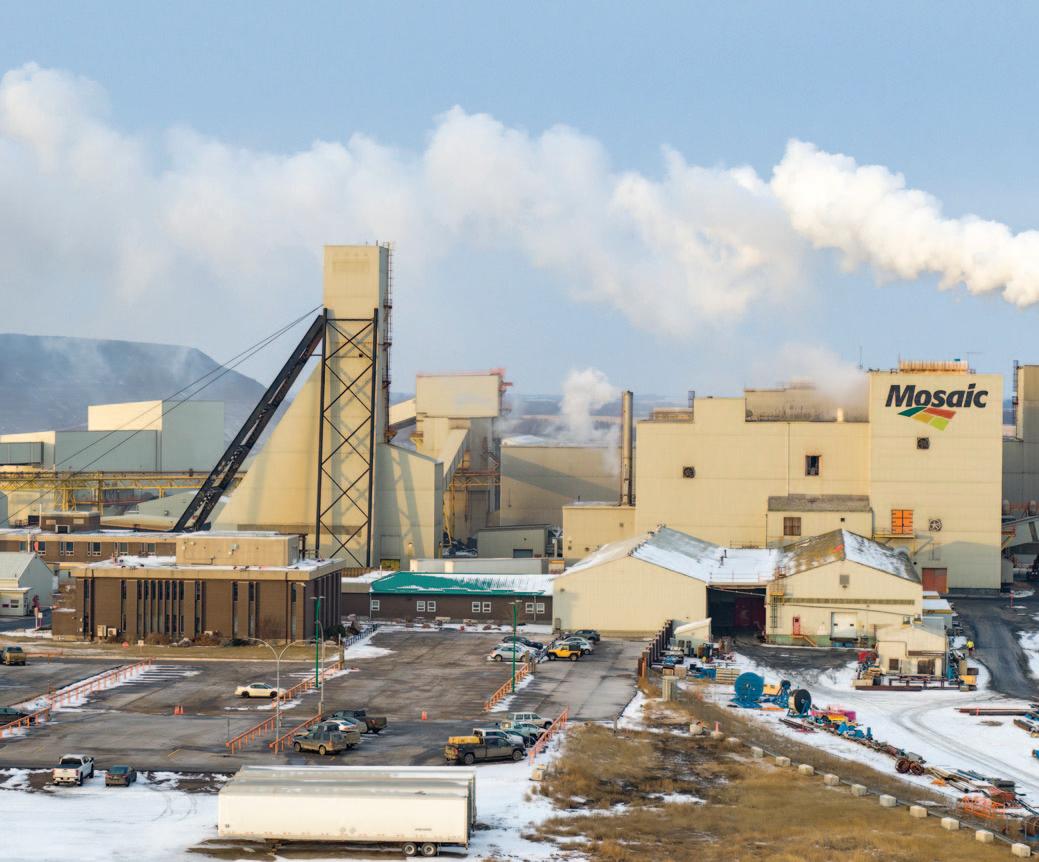
Collaborative teamwork was required to successfully decommission the K1 and K2 shafts at Mosaic’s Esterhazy potash complex earlier than originally planned, amid the challenges of time constraints and the difficulties of the COVID-19 pandemic
By Alexandra Lopez-Pacheco
Mosaic’s Esterhazy potash mining complex in southeastern Saskatchewan boasts many firsts. In 1962, its K1 project was the first successful potash mine built in the province—today, Saskatchewan’s potash mining industry is one of the world’s top producers of the fertilizer critical to modern farming. Mosaic’s new $3 billion K3 expansion project at Esterhazy, which began operating in 2021, was the first new underground potash mine to be built in Saskatchewan in more than 50 years.
In addition, Mosaic’s recent decommissioning of Esterhazy’s original K1 and K2 mine shafts marked the first time an underground potash mine has been taken out of operation in
Saskatchewan. The project also stands out for the awardwinning engineering and teamwork that overcame technical and pandemic-related logistics hurdles with agility in a triumphant race against time.
The first Esterhazy shaft, K1, was sunk in 1962. Five years later, the Esterhazy mine was expanded with the sinking of a second shaft, called K2. For almost two decades, the mining operation ran successfully with the two connected, onekilometre-deep shafts that lay some 10 kilometres apart. Then in 1985, brine from two saltwater aquifers—one above the mining
level and one below—flowed into the mine. It would be a problem that would plague the operation for the next 36 years.
Mosaic adapted to the flooding challenge through a combination of dewatering techniques, including pumping equipment and grouting. “Mosaic set up a dedicated team to focus on brine management,” said Shawn Haeusler, the company’s engineering lead. “Their sole purpose in life was [to prevent the flooding] to keep the mines operational.”
In 1987, the company partnered with engineering-consulting firm RESPEC, and its hydrogeological engineers helped Mosaic set up a water control information and monitoring system at the mine. For the most part, the inflow group was successful. But in 2006, Esterhazy experienced another major flooding event, and two more would follow in 2009 and 2011. The next year, Mosaic devoted US$250 million to manage the water inflow problem, by which time the company had already decided to build a new mine away from the brine formations.
Construction on the two K3 shafts began in 2011, then the planned staged closure of the K1 and K2 mines commenced in 2017.
Mosaic, in collaboration with a team of engineers and consultants from RESPEC, Hatch and Thyssen Mining Construction, designed a plan to maintain the integrity of the two shafts to permanently seal them off and keep the brine deep underground.
The decommissioning plan that the team developed involved installing tight-fitting concrete plugs on the shafts, which were 5.5 metres in diameter and 15 metres thick. To mimic the original geological formation that prevented brine from rising, the concrete plugs would be installed at 366 metres below the surface, approximately a third of the way down the shafts. To ensure a tight seal, the interface between the plug and the shaft walls would have to be grouted. Once that was completed, the top part of the shaft would be backfilled and caps would be installed. But the devil was in the details.
“Temperature, time and humidity—all this had to be taken into account to ensure that the entire plug system would work together as a whole to seal the shafts.”
– Shawn Haeusler, Mosaic
For longevity, the concrete used for the plugs would have to be made from a yet-to-be designed low-shrink, sulfate-resisting mix that was customized for the specific conditions in the shaft.
“Temperature, time and humidity—all this had to be taken into account to ensure that the entire plug system would work together as a whole to seal the shafts,” said Haeusler.
Because of the installation depth, the concrete could not simply be poured into the shafts. Instead, it would have to be transported down in a three-cubic-metre bucket and poured into place. The decommissioning team would have to transform the mine shafts, which had been in production for decades, into service shafts that would allow workers to descend into the mine to carry out the work, which included power washing the shafts’ walls and installing steel brackets and formwork.
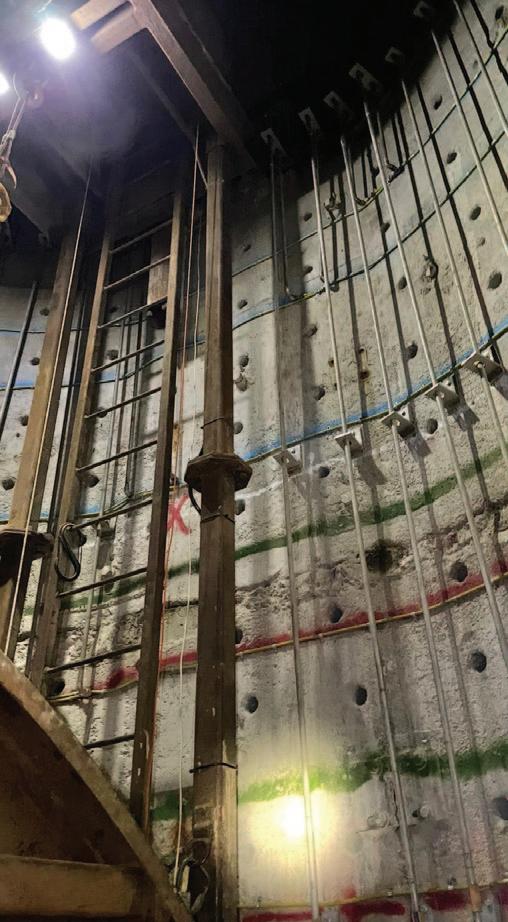
Tasked with designing this at K2, Thyssen’s engineers opted for adapting the conventional shaft-sinking approach of lowering a hanging multi-level work deck platform, or Galloway, down the mine shaft. This time, the work from the Galloway would be to close up the shaft and seal it.
“It was possibly the first time, certainly the first time in Saskatchewan, to plug a mine shaft with a [15-metre-thick] concrete plug,” said Brian Mattie, Thyssen’s lead engineer on the shaft decommissioning project. “There was no precedent. We didn’t have a playbook to follow. Saskatchewan’s mine regulations apply if you’re a production mine or if you’re doing a shaft sink—we weren’t either, so we had to use a third-party specialist to explain to the regulators what we were doing and why.”
The team began developing the detailed engineering plans in 2019. The installation of the plugs was set to start in the summer of 2022. Then, in March 2020, the COVID-19 pandemic hit, and it threatened to delay the decommissioning timeline.
“There was supply chain uncertainty,” said Haeusler. “Anytime we went to go buy something, it was always, ‘Well, you know, normally that would take two weeks to get here, but right now it’s going to be five months.’”
With limited access to the site, Mattie’s team at Thyssen went virtual and began working from home. As if that was not challenging enough, they were working from the original 1960s hand-drawn sketches for Esterhazy’s headframes to design new multi-deck work decks at K1. “We had work decks that were designed to fit the exact same envelope as the production skips,” said Mattie.
The team also designed a new hoisting system for the existing headframes to lower the workers down the shaft to the work area. It would also be used to lower the concrete in buckets. “We couldn’t just put the hoist where we wanted it, because there were too many obstructions,” said Mattie, referring to the K2 headframe. “We had to put the hoist where it could go and then use deflection sheaves.”
Meanwhile, RESPEC worked with subcontractors to design the customized concrete mix for the shaft plug system, as well as the grouting design of the interface between the plug and the existing liner.
“The concrete was unlike any concrete I had worked with before; it was black and flowed. No slumping with this mix,” said Brittany Chubey, the structural engineer with Hatch who managed the project.
In June 2021, brine levels underground increased again. The entire project shifted gears, and Mosaic suspended operations at the mine. RESPEC, which monitored the flooding, assessed that to complete the project, the lower portion of the K1 plug would have to be installed in December 2021, which was 10 months ahead of schedule.
The new winter timeline meant Chubey and her team at Hatch had to scramble to find a new local supplier to batch the specialized concrete. Unfortunately, none of the local concrete companies had the capabilities to produce the specialized mix needed for the project. Instead, the team asked locally based concrete company Crushrite to build a specialized concrete batch plant. The new batching facility had an area of 780 square metres and was based at Crushrite’s existing site in the nearby town of Esterhazy.
“From the time that the contract was awarded to the time that we were successfully batching concrete to spec was approximately 45 days,” said Chubey.
To ensure proper curing of the lower plug, the K1 shaft had to be dewatered first to a specific level so that the rising water did not reach the underside of the plug and to allow it to remain dry for at least 10 days. “The pump had to be abandoned to place the plug,” Chubey explained. “The clock was ticking, water was rising, concrete had to be placed.”
At 3 a.m. on Dec. 21, 2021, the team began pouring 277 cubic metres of concrete to form the lower portion of the K1 plug—one bucket at a time. On February 22, they poured 313 cubic metres of concrete for K2’s lower plug. The upper plugs were installed in the spring of 2022. All in all, the team spent 202 hours pouring 927 cubic metres of concrete into the shafts. Each bucket was

Because of the installation depth, the concrete could not simply be poured into the shafts. Instead, it had to be transported down in a three-cubic-metre bucket and poured into place.
tested to ensure it met the required specifications, and after every pour, the team used data from down-shaft cameras and sensors in the poured concrete to analyze how it had behaved and to determine if they would have to make any adjustments to the next plug pour.
With the plugs installed, the team completed the decommissioning of the K1 and K2 shafts, adding backfill and capping the shafts. This work was completed in August 2022.
“We made it in time,” said Haeusler. “But there was a lot of nerves and stress before that.”
On March 2, 2023, the Association of Professional Engineers and Geoscientists of Saskatchewan awarded Mosaic’s K1 and K2 shaft decommissioning project with its Exceptional Engineering/Geoscience Project Award.
The shaft decommissioning was not the only project to be expedited at Esterhazy. The K3 expansion project was completed three months ahead of schedule and began operations on November 8, 2021. The K3 operation, which is a digital mine with an Integrated Operations Control centre, autonomous technology and a nameplate capacity of 7.8 million tonnes annually, “is the biggest potash operation in the world,” said Dustin Maksymchuk, Esterhazy’s general manager.
Since 1985, the risk of flooding had constantly threatened the life of the mine, he said. “K3 is a much nicer environment to operate in. We’re growing, we’re expanding and we’re adding new technology.” CIM

Technology is helping to improve the accuracy of information obtained from exploration drill holes
By Catherine Hercus
The chances of making an economic mineral discovery are vanishingly slim, so as much as exploration drilling is a search for new deposits, it is also a search for efficiencies. Accuracy, durability and reliability are all essential in keeping the drills turning and oriented in the intended direction.
Innovation in drilling technology continues to refine the exploration process to improve the odds of discovery.
Stockholm Precision Tools AB (SPT) has recently launched new gyroscopes, which are measurement tools used in exploration drilling that use the Earth’s gravity to provide accurate information about the drill hole direction and orientation.
The GyroMaster north-seeking solid-state gyroscope uses SPT’s Navibore technology, which can register data points every centimetre. It is capable of surveying at any inclination and can generate two surveys from every run.
Data is received in real time, and detailed reports are automatically generated. If it is used in combination with SPT’s

Core Retriever overshot assembly, it can survey and pull cores simultaneously.
“GyroMaster is one of the best directional survey technologies in the industry. It was one of the first north-seeking gyro tools out in the market, and it is currently the only one capable of doing surveys in continuous mode,” said Eric Estrada, general sales marketing manager at SPT. “With our different technology, a vertical continuous survey only takes 25 to 30 minutes. It takes less time for the operator, people are less tired and have fewer accidents and it optimizes the worker’s time.”
Up to 150 metres can be surveyed per minute, and the average survey time for 1,000 metres is 15 minutes. Survey options include continuous, multi-shot and single shot. It can be operated vertically, horizontally and inclined.
The SPT Polestar Aligner uses an inertial navigation system and north-seeking gyroscope technology to accurately align drill rigs with true north, even in high latitudes. Unlike magnetic north, true north is an absolute reference direction, so it makes them immune to magnetic interference from ore deposits.
According to Estrada, another benefit of the Polestar Aligner is: “It can be moved to different rigs without losing alignment.”
The tool can be operating within minutes and provide up to eight hours of accurate real-time data for aligning drill rigs. Detailed QA/QC reports can be exported in seconds in common formats or sent to the SPT SmartCloud survey data management system.
One of Imdex’s newest products for exploration drilling is a directional core drill called the DeviDrill, originally developed by Norway-based Devico. In 2023, Imdex acquired Devico, a directional drilling equipment specialist that had been its competitor for downhole survey equipment as well. Directional core drilling technology enables drillers to drill fewer holes while hitting more targets compared to conventional drilling. The drill can be used for the exploration of precious and base metals as well as industrial minerals.
According to Imdex, directional drilling delivers more focused mineral exploration results with decreased costs and a lower environmental impact—including reduced water consumption and greenhouse gas emissions—when compared to conventional exploration drilling, increasing sustainability; the company said that the time and cost savings can be as high as 20 to 50 per cent. The technology can drill multiple secondary drill holes from an initial mother hole and overcome natural deviations to hit intended targets.


“The industry is going to rely more and more on directional drilling to achieve the needs of the industry in the future,” said Mark Gabbitus, head of product at Imdex. “We need to drill deeper, smarter [and] reduce our footprint, and that’s one of the reasons why we acquired Devico.”
Imdex has also added a new north-seeking gyro to its product lineup. The 38-millimetre diameter OMNIx38 complements the existing 42-millimetre OMNIx42.
“Now we have the smallest, most accurate, north-seeking gyro product on the market. The OMNIx38—like the OMNIx42— can pull core tubes without overshot barrels, so you can do your survey as part of the normal core drilling workflow process,” said Gabbitus.
In addition, Imdex is developing a new core orientation system to replace the ACT3, called the ACTx, which will be released later this year.
“The big change is that it’s not just for drillers; [the ACTx] delivers QA data about the quality of the orientation process for geologists,” said Gabbitus. “They will be able to have more confidence in the quality of the ori mark that is placed on the core by the driller, and the driller will be able to communicate issues to the geologist. We’ve digitized that whole process at the rig with data being synchronized to the cloud for the geologists to see. The geologists and the drillers will be able to have informed conversations when things go wrong.”
Canadian rock tools manufacturer Di-Corp introduced its new line of diamond drill bits, called CoreMatrix, in the fall of 2023. The bits have been re-engineered with enhanced bit life and faster penetration rates across a variety of ground conditions.
The line offers 21 matrices and a comprehensive matrix selection chart for guidance. Bit numbers are clearly identified to cover different rock formations within the Mohs hardness
scale, with several specialty options for abrasive conditions, extended life and free-cutting matrices.
The matrices are made of components including natural or synthetic diamonds, powders and alloys to improve performance including high penetration, load and torque. Each matrix is designed to target a specific rock formation and is engineered to perform in different drilling conditions, depending on rock hardness, abrasiveness, required bit life and penetration rate.
Di‑Corp has three standardized waterway configurations to help ensure the bit wears evenly down the drill hole and to promote proper flushing of cuttings away from the bit face.
The standard configuration is designed for competent, broken, abrasive and non-abrasive formations. It allows for maximum matrix volume, bit life and face contact area and is designed for mid- to high-power drill rigs. The pie-shaped configuration, which is suitable for mixed formations containing both competent and broken zones as well as conditions requiring increased fluid flow, is used with mid-power drill rigs. The turbo configuration is suitable for low- to mid-power drill rigs, and is designed for high productivity as its reduced contact area allows for the maximum penetration rate. In addition, there are crown profile choices of a wide inner diameter (ID) or deep ID opening and face discharge.
In addition to the new bit lineup, Di-Corp released a new series of reaming shells in the fall of 2023 that are designed to maintain drill hole direction, hole gauge and prevent premature wear of drilling tools due to vibration. The reaming shells are reinforced with thermally stable polycrystalline (TSP) and high-quality diamonds for extended life in different drilling conditions. They are available in three configurations: RS diamond-impregnated reaming shells made of synthetic diamonds and TSP; RX surface-set reaming shells made of natural diamonds and TSP; and RSX, which combines the design features of both. CIM

Each year the CIM Vancouver Branch brings together students and industry folks to network and celebrate success
By Michele Beacom
Apassion for sampling and prospecting in the outdoors of British Columbia is what drove Randy Smallwood, chief executive officer of Wheaton Precious Metals, into the mining business, he told students at the CIM Vancouver Annual Student and Industry Night, where he joined branch co-chair Laurie Reemeyer for a fireside chat. Smallwood, an alumnus of both the University of British Columbia (UBC) and the British Columbia Institute of Technology (BCIT), spoke about his belief in the importance of getting out into the field and encouraged students to seek such opportunities to build their careers. The inspiring fireside chat was well-received by all assembled.
The annual event, held on Nov. 9, 2023, at Vancouver’s Pinnacle Hotel Harbourfront, brought together industry professionals and mining, materials and earth sciences students from UBC, BCIT and Simon Fraser University (SFU) for an evening of networking and the presentation of thousands of dollars in scholarships, awards and prizes.
Of the scholarships and awards presented, three graduate scholarships, val-
ued at $2,500 each, were awarded to UBC students: Mara Di Ciolli, master’s, geological engineering, earth and ocean sciences; Milad Asgarpour Khansary, master’s, applied science mining; and Tom Armstrong, master’s, applied science mining.
Eleven book prizes of $800 each were awarded to: Pritom Nag Prince and Sebastian Torres, both students at BCIT; Amanda Kotthoff and Paul Specken, both earth sciences students at SFU; Glen Mair and Anna Dobrowolski, both metals and materials students at UBC; Gabriel Demers, Ethan Stroud and Tom Terblanche, all mining engineering students at UBC; and Cem Özyalçın (geology) and Emma Forsberg (geological engineering), both in earth and ocean sciences and georox at UBC.
Along with a book prize, UBC mining engineering student Ethan Stroud also took home the Turnbull Cup for best mining photo for his “Sunrise Over Brucejack Lake” snap. Stroud said, “I took this picture a couple of days before the end of my final set as a way to immortalize my time at Brucejack and the many things I learned there.” The annual contest is open to all earth science and mineral engineeringrelated undergraduate or technical college students in the greater Vancouver area. Congratulations to all!

CIM Montreal hosts Glencore Copper dinner and presentation, with Danny Tremblay
February 20, 2024 | Montreal, QC
CIM Vancouver hosts CIM Mingler
February 22, 2024 | Vancouver, BC
CIM Northern Gateway hosts CIM Seafood Mixer
February 29, 2024 | North Bay, ON
CIM Saskatoon hosts Industry Collaboration Night
March 21, 2024 | Saskatoon, SK
CIM Vancouver hosts CIM Luncheon
March 21, 2024 | Vancouver, BC
CIM Northern Gateway hosts CIM Luncheon
April 17, 2024 | North Bay, ON
CIM Saskatoon hosts Saskatchewan Mining Initiatives
April 18, 2024 | Saskatoon, SK
CIM Sudbury hosts Cut-Off Grade—The Impact of Getting It Right
April 18, 2024 | Sudbury, ON
CIM Red Lake hosts Cut-Off Grade—The Impact of Getting It Right
April 24, 2024 | Balmertown, ON
See our Calendar of Events:

CIM remembers a visionary leader, a respected professional and an exceptional mentor
By Rosemary Mantini

“Chris was a natural problem-solver and innovator,” remembered Angela Hamlyn, CIM CEO. “He generously and enthusiastically shared his time, talents and astute insights, mentoring and influencing a multitude of individuals towards the betterment of CIM and our industry. We will feel the loss of this influential leader whose keen mind, inspirational guidance and incomparable smile has impacted so many of us. We extend our sincere condolences to his family, friends and colleagues.”
Twigge-Molecey served as CIM President (2010-2011) and President of the CIM Metallurgy and Materials Society (MetSoc)(1996-1997). His contributions to CIM were recognized with many awards, including the 2020 Vale Medal for Meritorious Contributions to Mining, the 2016 CIM Distinguished Service Medal and the 2001 CIM Fellowship.
Named as a CIM Distinguished Lecturer in 2013, he shared his expertise across the CIM ecosystem in a presentation entitled, “Conflict minerals: What are they and why should we care?”
Born in the United Kingdom, Twigge-Molecey embarked on an academic journey that led him to the University of Toronto, where he pursued and successfully completed his PhD in fluid mechanics.
He joined Hatch upon graduation and remained there for 49 years. During that time, he contributed to technical studies, research and development programs, and the design and commissioning of major metallurgical facilities. His expertise and leadership were crucial in the successful initiation of Hatch’s operations in Russia, Chile and Peru.
He played a pivotal role in expanding the company’s presence in China, overseeing its growth and contributing significantly to the development, global marketing and sales of Hatch technologies.
“Dr. Chris Twigge-Molecey started at Hatch in 1972, not long before I joined the Horne smelter in Rouyn-Noranda as technical superintendent,” said Phillip Mackey, president of P.J. Mackey Technology Inc. “Hatch was providing engineering support to the new Noranda Process Reactor that had just about started up. I soon learned of Chris’s outstanding technical and analytical ability in understanding operational issues and solving problems. His early analysis of converter operations, carried out about this time in association with Heath and Sherwood of Gaspé puncher fame, was far-sighted.
“My second act in working with Chris over more than 35 years was on several MetSoc and CIM committees, and as a fellow past president of MetSoc. I have many cherished memories. He was a joy to work with, [and] again Chris shone. He provided exceptional leadership at MetSoc as president and [was] a great team member. Chris had the rare ability in certain situations to calmly let people know the way things really were while offering a course of action that was acceptable to all.
“Very recently, when some of us wanted to increase the visibility of mining and metallurgy in Canada amid a sea of announcements about battery plants, Chris contributed hugely to these efforts. Sadly, his work in this area now remains unfinished. Our work will continue but will not be the same without him. We will all miss him dearly.”
In 2017, Twigge-Molecey, along with three colleagues and 17 authors, published the CIM book Metallurgical Plant Design This collaborative effort addressed a significant gap in the industry related to the design of properly functioning metallurgical facilities.
CIM remembers Twigge-Molecey as a visionary leader, a respected professional and a mentor whose influence will be felt for generations to come. CIM
August 19-22, 2024
Registration opens April 15, 2024
Booths and sponsorship available!


Engage at the signature event for the metallurgy and materials community to celebrate its 63rd year.
Clean Technologies for a Materials-Intensive Future
SYMPOSIA
Advanced Manufacturing and Materials VII
Arsenic/Minor Element Controls in Metallurgical Plants
Corrosion and Environmental Degradation of Materials
Electrometallurgy for a Net Zero Economy
Extractive Metallurgy from Conception to Operation
The 25th International Biohydrometallurgy Symposium
Joe Ferron Symposium – Processing of Critical Materials
Light Metals for Transportation
WALSIM X: Water, Air, Land Sustainability Issues in Mining







With excitement and anticipation, I invite you to the much-awaited annual gathering of the mining industry, now proudly known as CIM Connect 2024! This year promises to be another extraordinary event, following a record-breaking CIMTL 23 in Montréal, and we are thrilled to share some exciting updates with you.
As we embark on this new chapter, the rebranded CIM Connect truly embodies our mission – connecting members, potential members, students, and corporations. It’s about bringing people together to connect, exchange ideas, collaborate, innovate, and ultimately, evolve the industry.
Our new logo, a vibrant representation of this transformation, showcases our global reach, with minerals symbolizing the seven continents, minerals that are the essence of our industry, in the colours of Vancouver, our host city.
The conference theme, “Brand Canada: Our Critical Advantage,” highlights Canada’s unique role within the global minerals, metals and energy landscape. It underscores our commitment to developing valuable resources responsibly and showcasing leadership in the field. This theme will provide a platform for exploring the significance of Canada’s critical advantage in the world, emphasizing our strategic importance, and how we can leverage these advantages.
Prepare for three full days of immersive learning and knowledge exchange, complemented by professional development courses in the days leading up to the convention. Our expansive tradeshow will be buzzing with companies showcasing cutting-edge products and services, offering a unique opportunity for networking and discovery. This year’s event will also include the 14th International Symposium on Mining with Backfill adding greater scope and depth to the proceedings.
CIM would like to acknowledge that CIM Connect 2024 will be held on the traditional territories of the Coast Salish people, including the lands of the Musqueam (mus-kwee-um), Squamish and Tsleil-Waututh (SLAY-wah-tooth) Nations.
We look forward to welcoming you to the breathtaking city of Vancouver, where the Pacific meets the mountains, from May 12 to 15, 2024. Let’s connect, exchange invaluable insights, and pave the way for a brighter future for the mining industry.
See you in Vancouver!
John Davidson
CIM Connect 2024 Convention Chair

Honorary Chair
Jonathan Price, Chief Executive Officer, Teck Resources Limited
Convention Chair
John Davidson, Head of Capital Sales North & Central America, FLSmidth
CIM President 2023-2024
Michael Cinnamond, Senior Vice President of Finance and CFO, B2Gold Corp.

de CIM Connect 2024 !
Cette année promet d’être un événement extraordinaire, après le succès record de CIMTL 23 à Montréal, nous sommes ravis de partager avec vous quelques mises à jour passionnantes.
Alors que nous entamons ce nouveau chapitre, le CIM Connect réinventé incarne véritablement notre mission – connecter les membres, les futurs membres, les étudiants et les entreprises. Il s’agit de rassembler les gens pour se connecter, échanger des idées, collaborer, innover et, faire évoluer l’industrie. Notre nouveau logo, une représentation dynamique de cette transformation, met en valeur notre portée mondiale, avec des minéraux symbolisant les sept continents, des minéraux qui sont l’essence de notre industrie, et les couleurs vibrantes de Vancouver, notre ville hôte.
Le thème de la conférence, « La marque canadienne: un avantage décisif », met en évidence le rôle unique du Canada dans le paysage mondial des minéraux, des métaux et de l’énergie. Il souligne notre engagement à développer les ressources précieuses de manière responsable et à montrer notre leadership dans le domaine. Ce thème offrira une plateforme pour explorer l’importance du Canada dans le monde, en mettant l’accent sur notre importance stratégique et en soulignant comment nous pouvons tirer parti de ces avantages.
Préparez-vous à trois journées complètes d’apprentissage immersif et d’échange de connaissances, complétées par des cours intensifs les jours précédents la convention. Notre vaste salon professionnel sera animé par des entreprises présentant des produits et services de pointe, offrant une occasion unique de réseautage et de découverte. L’événement de cette année comprendra également le 14e Symposium international sur l’exploitation minière avec remblai, ajoutant une plus grande envergure et profondeur aux débats.
Nous sommes impatients de vous accueillir dans la magnifique ville de Vancouver, où le Pacifique rencontre les montagnes, du 12 au 15 mai 2024. Connectons-nous, échangeons des idées inestimables et ouvrons la voie à un avenir plus prometteur pour l’industrie minière.
À bientôt à Vancouver !
John Davidson
Président de la convention CIM Connect 2024
Technical Program Chairs
Julia Gartley, Vice-President –Health, Safety & Sustainability, BBA Consultants
Maurice Tagami, Lead Director, Foran Mining Corporation
Sponsorship Chair
Scott Martin, Sales Director, North & Central America, Glencore Technology
CIM STAFF
Chief Executive Officer
Angela Hamlyn
Director of Events
Carol Damiani, cdamiani@cim.org
Event Operations Manager
Chantal Murphy, cmurphy@cim.org
Conference Planner
Marie Tota, mtota@cim.org
Sales Manager, Exhibition and Sponsorship
Nadia Bakka, nbakka@cim.org
Registration Coordinator
Nathalie Annoual, nannoual@cim.org
Event Marketing Coordinator
Michelle To, mto@cim.org
Short Courses
Guylaine Richard, grichard@cim.org
Awards Gala
Marie Boiteau, Logistics, mboiteau@cim.org
Julie Stuart, Nominations, jstuart@cim.org

SATURDAY, MAY 11
Short Courses
08:00 - 17:00
CIM Council Meeting 09:00 - 16:00
Registration 13:00 - 17:00
SUNDAY, MAY 12
Registration
08:00 - 20:00
Short Courses 08:00 - 17:00
CIM Officers’ Meeting 08:30 - 11:00 & Orientation Session
CIM Annual General Meeting 11:00 - 12:00
Lunch for Short Course Participants 12:00 - 14:00
Presenters’ Preparation Room 15:00 - 20:00
First Time Attendee and VIP Reception 15:30 - 16:30
Convention Opening Ceremony 16:30 - 17:00
CIM Connect Expo Opening 17:00 - 20:00 and Reception
Student Poster Session 17:00 - 20:00
MONDAY, MAY 13
Registration 07:30 - 17:00
Presenters’ Preparation Room 07:30 - 17:00
Business Class Lounge 07:30 - 17:00 and Press Room
Opening Plenary Session
08:30 - 10:30
CIM Connect Expo 10:00 - 17:00
Technical Program 11:00 - 16:45
Lunch at the Expo 12:00 - 14:00
Networking Reception at the Expo 15:30 - 17:00
Reception, CIM Awards Gala, 18:00 - 19:00 presented by Caterpillar and its Canadian dealers
CIM Awards Gala, presented by 19:00 - 22:00 Caterpillar and its Canadian dealers
TUESDAY, MAY 14
Registration
07:30 - 17:00
Presenters’ Preparation Room 07:30 - 17:00
Business Class Lounge 07:30 - 17:00 and Press Room
General Panel Session 08:30 - 10:00
CIM Connect Expo 10:00 - 17:00
Student Poster Session 10:00 - 17:00
Technical Program 10:30 - 16:45
Lunch at the Expo 12:00 - 14:00
Student-Industry Networking 12:00 - 14:00 Luncheon
Networking Reception at the Expo 14:30 - 16:00
Women in Mining Reception 17:00 - 19:00
Komatsu Gala 20:00 - 00:00
WEDNESDAY, MAY 15
Registration
08:00 - 14:00
Presenters’ Preparation Room 08:00 - 14:00
Business Class Lounge 08:00 - 14:00 and Press Room
General Panel Session
09:00 - 10:00
Technical Program 10:30 - 16:45
Lunch with Guest Speaker 12:00 - 14:00
Closing Panel 15:30 - 16:45
Convention Closing Reception 16:45 - 17:45
SAMEDI 11 MAI
Cours intensifs 8h - 17h
Réunion du conseil de l’ICM 9h - 16h
Inscription 13h - 17h
DIMANCHE 12 MAI
Inscription 8h - 20h
Cours intensifs 8h - 17h
Orientation des dirigeants de l’ICM 8h30 - 11h
Assemblée générale annuelle 11h - 12h de l’ICM
Lunch pour les participants 12h - 14h des cours intensifs
Salle de préparation pour 15h - 20h les présentateurs
Réception aux nouveaux 15h30 - 16h30 délégués et VIP
Cérémonie inaugurale du congrès 16h30 - 17h
Ouverture de l’expo de CIM Connect 17h - 20h
Concours d’affiches des étudiants 17h - 20h
LUNDI 13 MAI
Inscription 7h30 - 17h
Salle de préparation pour 7h30 - 17h les présentateurs
Salon pour les délégués affaires 7h30 - 17h et média
Plénière d’ouverture 8h30 - 10h30 l'expo de CIM Connect 10h - 17h
Programme technique 11h - 16h45
Lunch des délégués à l’expo de 12h - 14h
CIM Connect
Réception, réseautage à l’expo de 15h30 - 17h
CIM Connect
Réception, gala des prix d’excellence 18h - 19h de l’ICM, présenté par Caterpillar et ses concessionnaires canadiens
Gala des prix d’excellence de 19h - 22h l’ICM, présenté par Caterpillar et ses concessionnaires canadiens
MARDI 14 MAI
Inscription
7h30 - 17h
Salle de préparation pour 7h30 - 17h les présentateurs
Salon pour les délégués affaires 7h30 - 17h et média
Séance générale, panel de discussion 8h30 - 10h
L’expo de CIM Connect 10h - 17h
Concours d’affiches des étudiants 10h - 17h
Programme technique 10h30 - 16h45
Lunch des délégués à l’expo de 12h - 14h
CIM Connect
Lunch de réseautage étudiants- 12h - 14h industries
Réception – réseautage à l’expo 14h30 - 16h de CIM Connect
Réception des femmes en 17h - 19h exploitation minière
Gala Komatsu 20h - 00h
MERCREDI 15 MAI
Inscription 8h - 14h
Salle de préparation pour 8h - 14h les présentateurs
Salon pour les délégués affaires 8h - 14h et média
Séance générale, panel de discussion 9h - 10h
Programme technique 10h30 - 16h45
Lunch des délégués avec 12h - 14h présentateur invité
Panel de clôture 15h30 - 16h45
Réception de clôture du congrès 16h45 - 17h45


OPENING PLENARY SESSION SÉANCE PLÉNIÈRE D’OUVERTURE
MONDAY MAY 13 | 8:30 LUNDI 13 MAI | 8h30
Sponsored by:

Centred around the overarching theme of “Brand Canada: Our Critical Advantage,” CIM Connect aims to cast a spotlight on Canada’s distinctive position in the global minerals, metals and energy sectors. Emphasizing our commitment to responsible resource development, the convention will delve into industry challenges and showcase leadership excellence.
MODERATOR

Our Opening Plenary initiates the three-day journey by scrutinizing the Canadian advantage in the minerals industry from diverse perspectives.
Robin Stickley is an award-winning career journalist with 20 years of newsroom experience; leading from the anchor desk and reporting from the story front lines on both local and national network platforms. Robin has worked as an anchor and reporter in newsrooms across Western Canada and served as the Washington DC Foreign Correspondent for Global National covering stories in the United States for the network. She has anchored Global BC’s Morning Show, 5pm newscast, the Weekend News Hour at 6 and served as fill-in host regularly for Global National.
PANELISTS TO BE CONFIRMED
TUESDAY MAY 14 | 8:30 MARDI 14 MAI | 8h30
PANELISTS


The Tuesday morning general panel session will continue the journey started on Monday morning by exploring the synergy between industry, government and communities in bolstering the Canadian advantage.
MODERATOR Robin Stickley
PANELISTS CONFIRMED TO DATE Carolyn Chisholm, General Manager, External Affairs at Rio Tinto & Board Chair, Mining Association of Canada; Christy Smith, Vice President, Indigenous and Stakeholder Engagement at Falkirk
Sponsored by:

WEDNESDAY MAY 15 | 9:00 MERCREDI 15 MAI | 9h00



WEDNESDAY LUNCH WITH GUEST SPEAKER LUNCH
During the Wednesday morning general panel session, we pivot to assimilate insights from the preceding days, examining how they inform our strategies for the future across mining technology, industry trends, and human resources.
MODERATOR Robin Stickley
PANELISTS CONFIRMED TO DATE: Joseph Cavatoni, Market Strategist, World Gold Council; Jim Gowans, Corporate Director at Various Companies; Shelby Yee, Co-Founder & CEO at RockMass Technologies
WEDNESDAY MAY 15 | 12:00 MERCREDI 15 MAI | 12h00
The technical program continues, and delegates are invited to gather and grab a bite in an informal networking setting before heading to the afternoon sessions. An invited guest speaker at the lunch will be confirmed shortly, visit the website for latest information.
WEDNESDAY CLOSING PANEL SESSION PANEL DE CLÔTURE DU MERCREDI
WEDNESDAY MAY 15 | 15:30 MERCREDI 15 MAI | 15h30
Wednesday afternoon pivots towards the challenges of securing investment in mining and metals, seeking perspectives from streaming, royalty companies, private equity, and banking/capital markets. It’s a comprehensive exploration designed to foster meaningful dialogue and actionable takeaways within the dynamic landscape of Canada’s resource sectors.
MODERATOR Michael Cinnamond, Senior Vice President of Finance and CFO, at B2Gold Corp. and CIM President 2023-2024
PANELISTS Haytham Hodaly, Senior VP, Corporate Development at Wheaton Precious Metals Corp.; Clive Johnson, CEO at B2Gold Corp.; Jennifer Maki, Board member of Franco-Nevada; Johnna Muinonen, Managing Director, Technical Group, Investment Committee at Kinterra






Building upon the conference theme, “Brand Canada: Our Critical Advantage,” our technical program will bring industry professionals together to delve into the essential discussion of how we can strategically embrace key innovations to position ourselves as leaders in the mineral supply chain.
The technical program spans three full days and encompasses a variety of formats, including technical presentations, panel discussions, fireside chats and round-table sessions. It’s important to note that the technical program will conclude with a closing session from 15:30 to 16:45 on Wednesday, May 15, followed by the closing reception. We recommend adjusting your hotel reservation accordingly to ensure your participation in the exciting program on the final day.
The complete program, featuring sessions, presenters, and panelists, will be available in March on the CIM Connect website convention.cim.org under the Technical Program section.
Revitalizing Mining Education – International Perspectives
This forum topic aims to address the declining interest in mining education and explore strategies for revitalizing the field. By bringing together experts, educators and stakeholders from different countries, we can learn from each other's experiences and devise innovative solutions. This platform can serve as a hub for sharing best practices, research and collaborative initiatives.
In addition to our scheduled program, we will host a “Women in Mining Panel,” organized by Women in Mining BC, providing a platform for discussions on the invaluable contributions and perspectives of women in the mining industry. This panel aims to highlight achievements, challenges and opportunities for women professionals in the field.
Co-sponsored by

Community and the Workforce
Critical Minerals
Decarbonization and Green Energy Transition
Digitization and AI transformation
Drill, Blast, and Fragmentation Optimization
Fleet Optimization and Management
Mine Operations
Mineral Processing and Materials Handling
Mining Markets and Supply Chain
Resource Estimation and Modelling
Rock Mechanics
Safety
Sustainable Mining and Resource Management
Tailings Designs and Management
Telecommunications
Water Treatment and Management




Presented by Caterpillar and its Canadian dealers.



Monday, May 13 18:0019:00

The CIM Awards Gala, sponsored by Caterpillar and its Canadian dealers, celebrates exceptional achievements in the Canadian minerals industry. Join us for recognition and networking. Secure your spot early to ensure you don’t miss this memorable event.


We are pleased to announce that the 14th International Symposium on Mining with Backfill (Minefill 2024) will be co-locating with CIM Connect 2024 (May 12 to 15).
This prestigious event brings together leading professionals and experts from the global mining industry to exchange knowledge, explore innovative solutions, and shape the future of mine backfill and its place in mine waste management.
The Minefill Symposium stands out for providing a unique platform that fosters collaboration,

CHAIRPERSON
Maureen McGuinness
P.Eng, Director, Paterson & Cooke Canada Inc.

CO-CHAIR
Ferri Hassani PhD, FCIM, Webster Chair Professor, McGill University

KEYNOTE SPEAKER Russell Evans
INTENSIF | 9h-17h
Introduction to Backfill Design and Operations
Explore crucial aspects of mining backfill, often overlooked until issues arise. This one-day course delves into backfill methods, emphasizing the key connections between geomechanics, system design, operation and management. Learn the fundamentals for sizing, designing and operating mine backfill systems effectively, with a focus on implementing and managing best-practice operations. Participants will gain insights into the requirements for a safe and reliable backfill system.

showcases cutting-edge research and promotes best practices in the field of mine backfill. It serves as a valuable opportunity for researchers, engineers, industry leaders, and policy makers to connect, share insights, and contribute to the sustainable development of mining operations worldwide.
As a Minefill attendee, you will have access to the CIM expo as well as all the CIM social events.
For an additional $100 on your registration fee, you have the opportunity to attend both technical programs, CIM Connect 2024 and Minefill 2024.
MONDAY MAY 13 LUNDI 13 MAI
SYMPOSIUM OPENING & KEYNOTE | 8:00
OUVERTURE DU SYMPOSIUM ET PLENIÈRE | 8h
We're excited to begin Minefill 2024 with keynote speaker Russell Evans, a mining veteran with 35+ years of global experience. Currently Director of Backfill Operations at Agnico Eagle Mines, he’s played key roles in over 30 paste plants and eight rockfill plants worldwide, including leading the construction of Australia’s first paste plant and introducing the first gold mine paste tailings system.
TUESDAY MAY 14 MARDI 14 MAI
TUESDAY PANEL SESSION | 11:30
MARDI SESSION PANEL | 11h30
This panel discussion promises a focused exploration of crucial aspects of backfill, from waste management dynamics to practical implementation and real-world case examples.
MINEFILL BANQUET | 18:00 BANQUET DE MINEFILL | 18h
This friendly evening will provide a perfect opportunity for networking and celebrating the achievements of the mining industry in an exceptional setting.
Delegates $75 | Guests $150
WEDNESDAY MAY 15 | 12:10 MERCREDI 15 MAI | 12h10
Participants can enjoy lunch with the opportunity to meet and engage in relaxed networking in a conducive environment.





There will be 31 highly specialized short courses offered by top experts in their fields, immediately preceding the conference. These in-depth courses are essential for professionals who want to stay abreast of the most recent developments and techniques in their areas of expertise. The short courses are available on a first-come, first-served basis. The organizer reserves the right to cancel a short course if the number of participants does not meet the minimum number required to hold a short course.
Price includes four coffee breaks, two lunches and course notes
Regular registration: $750
Student registration: $200
Full day short course
Price includes two coffee breaks, lunch and course notes
Regular registration: $425
Student registration: $125
Trente-et-un cours intensifs sont proposés par des experts de renom dans leur domaine, immédiatement avant la conférence. Ces cours sont essentiels pour les professionnels qui souhaitent se tenir au courant des développements et des techniques les plus récents dans leur domaine d’expertise. Les cours sont disponibles selon le principe du premier arrivé, premier servi. L’organisateur se réserve le droit d’annuler une session si le nombre de participants ne répond pas au nombre minimum requis pour la tenue d’un cours court.
Half day short course
Price includes one coffee break and course notes
Regular registration: $225
Student registration: $75
Two-hour seminar
Price includes course notes
Regular registration: $175
Student registration: $55
For course lists and descriptions, visit https://convention.cim.org/short-courses/







SCAN THIS CODE FOR MORE INFORMATION.

SUNDAY, MAY 12
DIMANCHE 12 MAI
OPENING CEREMONY AND WELCOME
RECEPTION | CÉRÉMONIE D’OUVERTURE ET RÉCEPTION DE
Join fellow participants at the CIM Connect opening ceremony and reception for an evening of networking, refreshments and live entertainment. Reconnect with old colleagues and friends over drinks and finger foods at the Expo, where you can also explore exhibitor innovations. The Expo serves as the convention hub, fostering networking, knowledge exchange and business interactions.
Rejoignez les autres participants à la cérémonie d’ouverture et à la réception de CIM Connect pour une soirée de réseautage, de rafraîchissements et de divertissement. Retrouvez d’anciens collègues et amis autour de boissons et de petites bouchées à l’Expo, où vous pourrez également découvrir les innovations des exposants. L’Expo sert de point central, favorisant le réseautage, l’échange de connaissances et les interactions commerciales.
16:30 | Ceremony
17:00 | Reception

Sponsored by

MONDAY & TUESDAY, MAY 13-14
NETWORKING AT THE EXPO | RÉSEAUTAGE À L’EXPO
MONDAY, MAY 13 LUNDI 13 MAI

Indulge in an exquisite gala evening, generously sponsored by Caterpillar and its Canadian dealers, dedicated to honoring excellence in the minerals industry. Join hundreds of industry peers in celebrating the year’s standout performers amid a night of gourmet cuisine and entertainment. Secure your tickets early, as seating is limited, and prepare your finest evening wear for this prestigious event.
Profitez d’une soirée de gala, généreusement parrainée par Caterpillar et ses concessionnaires canadiens, dédiée à l’excellence dans l’industrie des minéraux. Rejoignez des centaines de professionnels de l’industrie pour célébrer les meilleurs acteurs de l’année lors d’une soirée de cuisine gastronomique et de divertissement. Réservez vos billets tôt, car les places sont limitées, et préparez votre tenue de soirée la plus élégante pour cet événement prestigieux.
18:00 | Reception
19:00 | Gala | $ 250
Sponsored by:

Monday and Tuesday, enjoy luncheons at the Expo between 12:00 to 14:00 and Monday cocktail from 15:30 to 17:00 and Tuesday cocktail from 14:30 to 16:00. Your delegate registration comes with the added benefit of a daily provision, covering both lunch and one drink ticket per day.
Lundi et mardi, profitez des lunchs à l'Expo entre 12h et 14h et d’un cocktail le lundi de 15h30 à 17h00 et d’un cocktail le mardi de 14h30 à 16h. L’inscription des délégués comprend les lunch et un ticket de boisson par jour.
Monday Lunch Tuesday Lunch sponsored by: sponsored by:

Several social activities have been meticulously organized to enhance your networking opportunities and ensure a memorable convention experience. Secure your tickets in advance and make sure to mark your calendar!
Plusieurs activités sociales ont été méticuleusement organisées pour améliorer vos opportunités de réseautage et garantir une expérience de convention mémorable. Assurezvous de réserver vos billets à l’avance et de les noter sur votre calendrier !
TUESDAY, MAY 14
WEDNESDAY, MAY 15 MERCREDI 15 MAI

Prepare for an evening of uninterrupted entertainment at the Komatsu Gala. Immerse yourself in live music, savor delectable finger foods, and enjoy refreshing beverages. This lively gathering provides an exciting opportunity for acquaintances and peers to celebrate into the night before bidding each other farewell until next year.
Préparez-vous à une soirée de divertissement au Gala Komatsu. Immergez-vous dans la musique live, savourez de délicieux amuse-gueules et dégustez des boissons rafraîchissantes. Ce rassemblement offre une occasion passionnante aux participants de faire la fête jusqu’au bout de la nuit avant de se dire au revoir jusqu’à l’année prochaine.
20:00-00:00 | Included in the delegate and exhibitor registration fee. Inclus dans les inscriptions des délégués et des exposants
Sponsored by



Sponsored by

Join CIM and Women in Mining BC for a vibrant evening of drinks and appetizers, celebrating diversity and inclusion in the industry. Connect and network with a diverse group of industry professionals. This event is a must-attend for those who value diversity in the field. Secure your tickets promptly, as they sell out fast!
Joignez-vous à l’ICM et à Women in Mining BC pour une soirée animée de boissons et d’amuse-gueules, célébrant la diversité et l’inclusion dans l’industrie. Connectez-vous et réseautez avec un groupe diversifié de professionnels de l’industrie. Cet événement est un incontournable pour ceux qui valorisent la diversité dans le domaine. Réservez vos billets rapidement !
17:00-19:00 | $ 90
WEDNESDAY LUNCH WITH GUEST SPEAKER | LUNCH DU MERCREDI AVEC UN CONFÉRENCIER INVITÉ

The technical program is in full swing, and delegates are encouraged to gather for an informal networking lunch, before heading to the afternoon sessions. Stay tuned for the confirmation of an invited guest speaker at the lunch—details will be provided shortly. For the latest information, please visit the website. Le programme technique bat son plein et les délégués sont encouragés à se réunir pour un déjeuner de réseautage informel, avant de se diriger vers les séances de l’après-midi. Restez à l’affût pour la confirmation du conférencier invité du lunch – les détails seront fournis sous peu. Pour obtenir les informations les plus récentes, veuillez consulter le site Web. 12:00-14:00 | Included in the delegate registration fee. Inclus dans l’inscription du délégué

Here's to a week brimming with learning, knowledge exchange, networking, business and, above all, SUCCESS! Raise your glasses to both old and new friendships and indulge your sweet tooth as we recap the highlights of CIM Connect. Cheers!
Célébrons une semaine pleine d’apprentissage, d’échange de connaissances, de réseautage, d’affaires et, surtout, de SUCCÈS ! Levez votre verre à vos anciennes et nouvelles amitiés et laissez-vous tenter par les sucreries en récapitulant les points saillants de CIM Connect. À votre santé!
16:45-17:45 | Drink ticket is included with the delegate registration. Billet de boisson inclus dans l’inscription du délégué.


CIM Connect stands as the paramount professional networking opportunity. Student registration grants access to all Plenary sessions, the Technical Program, CIM Opening Reception, CIM Expo, Monday lunch at the Expo, Tuesday CIM Student-Industry Luncheon, Wednesday lunch with Guest Speaker, Komatsu Gala on Tuesday night, and the Closing Reception on Wednesday.
CIM Connect est l’opportunité de réseautage professionnel par excellence. L’inscription des étudiants donne accès à toutes les séances plénières, au programme technique, à la réception d’ouverture de l’ICM, au lunch du lundi à l’Expo, au lunch étudiant-industrie du mardi de l’ICM, au lunch du mercredi avec conférencier invité, au gala Komatsu le mardi soir et à la réception de clôture le mercredi.
SUNDAY TO TUESDAY MAY 12 – 14
DIMANCHE 12 AU MARDI 14 MAI
Young leaders pavilion
Pavillon jeunes professionnels
This pavilion and lounge is the perfect place for Young Professionals to check out the student posters, network with fellow university students or grads, or just relax before making another tour of the tradeshow floor. Get your headshot and update your professional Linkedin profile with the convention photographer.
Ce pavillon et salon est l’endroit idéal pour les jeunes professionnels qui souhaitent consulter les affiches des étudiants, réseauter avec d’autres étudiants universitaires ou diplômés, ou simplement se détendre avant de faire une autre visite du salon. Obtenez votre photo et mettez à jour votre profil Linkedin avec le photographe de la convention.
Student poster competition
Concours d’affiches des étudiants
Showcase your talents to leading mining industry professionals. Put your best foot forward and submit an abstract online before March 3, 2024, on topics ranging from geology and mining to processing and sustainability. Cash prizes will be presented to three winners at Tuesday’s Student-Industry Luncheon.
Présentez vos talents aux plus grands professionnels de l’industrie minière. Soumettez un résumé en ligne avant le 3 mars 2024 sur des sujets allant de la géologie à l’exploitation minière, en passant par le traitement et la durabilité. Des prix en argent seront remis à trois gagnants lors du déjeuner étudiant-industrie de mardi.
MONDAY MAY 13 LUNDI 13 MAI
Speed mentorship | 11:00
Mentorat rapide | 11h
Just like speed dating, you’ll have a chance to chat with mentors from different companies, roles and disciplines until you find the perfect match.
Tout comme le speed dating, vous aurez l’occasion de discuter avec des mentors de différentes entreprises ayant des rôles et disciplines variés jusqu’à ce que vous trouviez le match parfait.
MONDAY MAY 13 LUNDI 13 MAI
CIM poster cocktail | 15:30
Cocktail du concours d’affiches | 15h30
Enjoy catching up with others who share your interests and watch the judges review the posters. Poster competition winners will be announced at the Student-Industry Luncheon on Tuesday, May 14.
Prenez plaisir à rencontrer d’autres personnes qui partagent vos intérêts et regardez les juges examiner les affiches. Les gagnants du concours d’affiches seront annoncés lors du déjeuner étudiant-industrie le mardi 14 Mai.
TUESDAY MAY 14 MARDI 14 MAI
Student-industry luncheon | 12:00
Lunch de réseautage étudiants-industries | 12h
Make that all-important contact with the mining professionals who can help propel your career at the Student-Industry Luncheon. Practice networking skills by engaging with potential employers and mentors in this select and professional networking environment.
Établissez ce contact très important avec les professionnels de l’industrie minière qui peuvent vous aider à propulser votre carrière lors du lunch étudiant-industrie. Réseautez en vous engageant avec des employeurs et des mentors potentiels dans cet environnement de réseautage sélect et professionnel.
Recruiter’s reception | 15:00
Réception des recruteurs | 15h
At our recruiter's reception, you'll have the chance to engage in meaningful conversations with professionals who possess a wealth of knowledge and experience in your desired field. They are here to listen, understand your aspirations, and guide you towards the perfect career fit.
À la réception des recruteurs, vous aurez la chance d’engager des conversations significatives avec des professionnels qui possèdent une richesse de connaissances et d’expérience dans le domaine de votre choix. Ils sont là pour vous écouter, comprendre vos aspirations et vous guider vers la carrière idéale.


A fun evening of live music, hors d’oeuvres and refreshments
Tuesday, May 14 | 8 p.m. to midnight
Vancouver Convention Centre
Tickets included in convention registration






Sponsored by

The CIM Connect Expo takes center stage as the premier platform for showcasing cutting-edge technology, innovative solutions, and a diverse range of services. It offers a unique opportunity to engage in conversations with industry professionals, experts, and key decision-makers. Attendees can explore and test products, forge valuable partnerships, and spark new ideas. The CIM Connect Expo extends a warm invitation to all industry professionals, encouraging active participation and the chance to derive significant benefits from this exceptional event.
The CIM Connect Expo has been the leading mining trade show in Canada for decades. The Expo floor showcases the latest mining equipment, tools, technology, hardware, and software. Attendees can experience product demonstrations, explore solutions to industry challenges, chat with exhibitors, or set up focused one-on-one meetings to gain deeper insights and find the answers they need.
This year’s Expo will be the biggest so far, with the largest number of pavilions. Explore the latest advancements in our pavilions from Quebec, Northern Ontario Mining Showcase, Saskatchewan Mining Showcase, Africa, Arizona, Australia and China.
Make sure to visit the Young Leaders Pavilion, the Career Center, our Poster Presentations, and the CIMF Silent Auction. And don’t forget to stop by the CIM Magazine Lounge to chat with our editors and advertising sales team.
Monday and Tuesday, enjoy luncheons between 12:00 to 14:00 and Monday cocktail from 15:30 to 17:00 and Tuesday cocktail from 14:30 to 16:00.
Whether to conclude an agreement or interview a potential employee, closed meeting spaces will be available to CIM corporate members, sponsors and convention exhibitors. Reserve the private meeting pods for 30-minute time slots. An attendant will ensure access to as many partners as possible. First come, first served.
L’Expo de CIM Connect est le principal salon minier au Canada depuis des décennies. L’Expo présente les derniers équipements, outils, technologies, matériels et logiciels miniers. Les participants peuvent assister à des démonstrations de produits, explorer des solutions aux défis de l’industrie, discuter avec les exposants ou organiser des réunions individuelles ciblées pour approfondir leurs connaissances et trouver les réponses dont ils ont besoin.
L’Expo de cette année sera la plus grande jamais organisée, avec le plus grand nombre de pavillons. Explorez les dernières avancées dans nos pavillons du Québec, du salon minier du Nord de l’Ontario, du salon minier de la Saskatchewan, de l’Afrique, de l’Arizona, de l’Australie et de la Chine.
Ne manquez pas de visiter le Pavillon Jeunes Professionnels, le Centre des carrières, nos présentations d’affiches et la vente aux enchères silencieuse de la FICM. Et n’oubliez pas de vous arrêter au salon du magazine CIM pour discuter avec nos rédacteurs et notre équipe de vente de publicité.
Lundi et mardi, profitez des lunchs entre 12h et 14h et d’un cocktail le lundi de 15h30 à 17h00 et d’un cocktail le mardi de 14h30 à 16h.
Que ce soit pour conclure un accord ou interviewer un employé potentiel, des espaces de réunions fermés seront disponibles aux membres corporatifs de l’ICM, nos commanditaires et exposants. Un préposé rendra ces espaces disponibles pour des périodes de 30 minutes. Premier arrivé, premier servi. #CIMCONNECT2024
Exhibitor Name
3D
3D-P
48e
ABC
ABC
Accutron
Acme 1131
Adria
AFM
AFX
AGUDIO Ropeways
AireSafe
airth.io
Alfagomma
Allonnia
Am
Ambra
Anhui
ASDR
Atlantic
ATS
AUMUND
AVEVA
AW
Barr
BBA
Becker
Bedeschi
BEIJING
Check out our full exhibitors’ listings
Vous trouverez la liste complète de nos Exposants en ligne.
ExcelSense
F.F.P.
FALCO
Fenner
Fireball
Flender
Geobrugg
GeoStabilization
GKM
GMS
Groupe
Groupe
Groupe
H2Flow
Superior Industries
Supreme Manufacturing, Inc.
Surplec
T&T Power Group
Taizhou Changlong Fasteners Co.,Ltd 946
Takraf Canada Inc. 1704
Talpa Solutions GmbH 543
Team Power Solutions 744
Tecera International Co., Ltd 1450
Technosub 1217
Teck 1623
TECO-Westinghouse Motors (Canada) Inc. 1640
Tega Industries Limited 1409
TEKAD INDUSTRIES 1224
TEMA ISENMANN, INC. 1501
The EIMCO-K.C.P.
Thermo
Tsubaki
Tundra
Usha
Valmet
Veolia
Voith
Welco Expediting Ltd.
Westcan
Westpro Machinery Inc. 1601
WireCo
Wuxi

EARLY BIRD REGISTRATION – Register before April 5, 2024 to benefit from the early bird rate. Visit Register – CIM CONNECT for more details.
INSCRIPTION ANTICIPÉE – Inscrivez-vous avant le 5 avril 2024 pour bénéficier du tarif d’inscription anticipée. Visitez Inscription – CIM CONNECT pour plus de détails.
Sponsored by

Conference Direct serves as the official housing bureau for CIM Connect. Take advantage of the online one-stop reservation tool to seamlessly book your room at preferred rates. Due to limited availability, it is advisable to make your reservation early.
Visit Hotel Reservations – CIM CONNECT for more details.
IMPORTANT: Exercise caution regarding calls or emails claiming to represent CIM. Refrain from providing personal information via phone or email, as such communications may be suspicious.
Conference Direct est le bureau officiel d’hébergement de CIM Connect. Profitez de l’outil de réservation en ligne à guichet unique pour réserver votre chambre à un tarif préférentiel. En raison de la disponibilité limitée, il est conseillé de faire votre réservation à l’avance.
Pour plus de détails, visitez la page Réservations d’hôtel –CIM CONNECT.
IMPORTANT : Faites preuve de prudence en ce qui concerne les appels ou les courriels prétendant représenter l’ICM. Abstenez-vous de fournir des renseignements personnels par téléphone ou par courriel, car de telles communications peuvent être suspectes.
OFFICIAL CONVENTION SPONSOR | COMMANDITAIRE OFFICIEL DU CONGRÈS























FÉVRIER 2024

69 Lettre de l’éditeur
70 Mot du président
Les actualités
71 Le développement d’une installation hydrométallurgique au Québec progresse
Par Ashley Fish-Robertson
Exploitation minière et santé mentale
72 Des programmes de formation visant à offrir aux travailleurs des ressources pour leur permettre de reconnaître des problèmes de santé mentale et savoir comment s’y prendre pour y faire face
Par Mackenzie Patterson
Article de fond Lettre
74 Contrôle aux frontières
Ces dernières années ont été marquées par une nouvelle vague de nationalisme des ressources. Elle devrait s’intensifier en raison de la demande mondiale en minéraux critiques, qui continue d’inciter les pays à protéger leurs réserves
Par Kelsey Rolfe
L’industrie minière est bien connue pour ses discours sur la sécurité, mais pas tant pour ceux relatifs à la santé mentale. Lorsque l’équipe du CIM Magazine a décidé de se pencher sur une série d’éditoriaux d’une année sur l’industrie minière et la santé mentale, elle n’a pu que constater l’insuffisance notoire de données et d’informations ainsi que de débats sur ce thème important. En 2019, Vale et l’université Laurentienne avaient publié les résultats d’une étude qui demandait à des milliers d’employés de Vale Canada de leur parler de leur bien-être mental. Vale Canada avait lancé cette étude après avoir découvert, dans ses exploitations d’Ontario, qu’une demande de prestations d’invalidité sur quatre était liée à des problèmes de santé mentale. Cette étude constituait une référence. Avant elle, aucune étude n’avait collecté de données sur la santé mentale des travailleurs canadiens du secteur minier. Pourtant, on sait bien que ce secteur, qui impose de travailler pendant de longues heures, avec des quarts de travail et parfois dans des conditions d’isolement extrême, peut être très éprouvant. En d’autres termes, c’est une cocotte-minute prête à exploser pour les problèmes de santé mentale.
Certaines sociétés minières commencent à mettre en œuvre des initiatives sur la santé mentale afin d’aider leurs employés. Sécurité au travail dans le Nord, par exemple, propose aux industries minière et forestière des programmes de formation à la santé mentale dans le cadre de ses services. Depuis 2021, lorsque l’association a commencé à offrir ce programme, plus de 4 000 travailleurs de tous les secteurs qu’elle couvre y ont pris part.
C’est un début. Toutefois, comme nous le disait un employé de mine dans notre premier article sur l’industrie minière et la santé mentale (en p. 72), les mesures à prendre ne peuvent pas s’arrêter là. Il reste tant à faire.
L’industrie minière au Canada est un chef de file mondial en matière de sécurité physique, d’exploration et d’innovation technologique. Elle commence aussi à prendre les devants dans d’autres domaines, tels que la diversité des talents. Récemment, de grands acteurs de l’industrie ont intensifié leurs efforts et mis en œuvre des initiatives dédiées à la représentation équilibrée des femmes et des hommes dans leurs objectifs d’entreprise, alors que d’autres secteurs ne l’ont toujours pas fait. La santé mentale est un autre domaine dans lequel l’industrie minière pourrait exceller.
Au cours de l’année à venir, nous présenterons des personnes, des programmes et des initiatives qui accordent la priorité à la santé mentale des travailleurs miniers. Pendant toute l’année 2024, vous découvrirez différentes ressources à disposition qui contribuent à améliorer la santé mentale des travailleurs, essentielle à un environnement de travail sûr et productif.
Nous tenons à remercier les personnes et les sociétés qui sont sorties du silence et ont accepté de parler de ce problème important : Sandor Basa, Lisa Lounsbury, Lindsay Digby et Sécurité au travail dans le Nord dans cette édition, Mines Agnico Eagle et Cameco dans les numéros à paraître.
Il s’est toutefois avéré difficile de trouver des sociétés prêtes à évoquer avec nous la question de la santé mentale. Si vous connaissez une société qui serait prête à nous en parler, nous vous saurions gré de nous en faire part. Il est extrêmement puissant de voir et d’entendre les dirigeants d’une société accorder de l’importance à la santé mentale et mettre en œuvre des initiatives pour étayer leurs propos. Il est encore plus puissant de les voir s’ériger en exemple pour d’autres sociétés.
Normaliser le débat sur la santé mentale incitera les personnes à trouver la force de demander de l’aide lorsqu’elles en ont besoin. Des vies pourraient être épargnées. Cela vaut la peine d’essayer.
Silvia Pikal, Cheffe de rubrique spikal@cim.org


C’est le cœur lourd que je vous annonce le récent décès de l’un de nos anciens présidents de l’ICM, Christopher Twigge-Molecey. M. Twigge-Molecey était l’exemple même de ce qui rend l’ICM si exceptionnel : il était travailleur et dévoué, amical, mais avec des opinions bien marquées sur des questions qui lui tenaient à cœur, et toujours avide de créer un monde meilleur. Si l’ICM est encore là aujourd’hui, c’est en partie grâce à l’héritage qu’il nous a laissé après son mandat de président de l’ICM [2010-2011]. Sa présence et son soutien manqueront terriblement à Hatch, où il a travaillé pendant 49 ans, à la MetSoc et à l’ensemble de la communauté de l’ICM.
M. Twigge-Molecey, comme nombre de présidents avant lui, a donné l’exemple de ce que signifie l’engagement envers la communauté de l’ICM. Outre son mandat de président de l’ICM, il a été président de la MetSoc (1996-1997). En 2017, il a publié, avec trois collaborateurs et 17 auteurs, un ouvrage important de l’ICM, Metallurgical Plant Design
Ces derniers mois, d’autres présidents de l’ICM ont montré que la fonction de président ou présidente n’est pas une tâche facile qui s’arrête à la fin du mandat. Par exemple, en novembre 2023, nous avons inauguré notre jeu vidéo Évolution minière très attendu. Cette entreprise commune entre l’ICM et Science Nord est le fruit d’un travail passionné de Samantha Espley, notre présidente de l’ICM pour l’année 2020-2021. Ce jeu numérique divertissant s’accompagne de ressources pédago-
C’est grâce à la coopération de tous les membres de notre communauté que l’ICM connaît un tel succès.
giques gratuites, et ses objectifs premiers consistent à démontrer que l’exploitation minière est pour tout le monde et qu’elle constitue le fondement de notre avenir. Mme Espley est aussi passionnée par la sécurité. Présidente de la société de la santé et de la sécurité (SSS), elle travaille, aux côtés de nombreux autres membres de la SSS, sur plusieurs initiatives, notamment la base de données canadienne sur les blessures graves et les accidents mortels, afin de sensibiliser aux accidents miniers graves et d’en tirer les enseignements.
Ian Pearce, notre président-élu de l’ICM [2024-2025], a présidé notre troisième Capital Projects Symposium (CPS 2023, le symposium dédié aux projets d’investissement), qui s’est tenu à Vancouver en novembre 2023. Il a bénéficié de l’aide considérable de Pierre Julien [2021-2022] et de Samantha Espley, ainsi que de la présidente-élue Candace MacGibbon [2025-2026]. L’objectif de cette conférence était de créer une plateforme permettant la mise en relation, le partage et l’apprentissage dans l’optique d’améliorer la performance des projets dans l’industrie minière. C’est un thème très important et une grande priorité pour notre industrie, et tout particulièrement pour les exploitants et les dirigeants de projets de construction en cours, notamment toutes les sociétés de génie, de construction et de tout autre domaine en lien avec l’exploitation minière, qui soutiennent les projets miniers.
Malheureusement, je n’ai pas suffisamment d’espace ici pour remercier toutes celles et tous ceux qui ont contribué à ces initiatives récentes, ni pour reconnaître tous les grands événements et activités que notre communauté Un ICM pour tous a entrepris durant l’année 2023. Ces activités ne pourraient avoir lieu sans le dévouement de tous nos membres et bénévoles, et notamment de nos présidents, anciens et futurs. C’est grâce à la coopération de tous les membres de notre communauté que l’ICM connaît un tel succès. Je suis impatient de voir ce que nous réserve 2024, et de retrouver autant de personnes que possible dans les mois à venir.

Mike Cinnamond Président de l’ICM
Par Ashley Fish-Robertson
Kinterra Capital, une société canadienne de capital-investissement, annonçait le 10 janvier que sa filiale NiVolt Technologies Inc. était parvenue à produire un précipité d’hydroxyde mixte (PHM) à partir de concentré de nickel contenant plus de 45 % de nickel et de cobalt avec peu d’impuretés.
Cette nouvelle récente permettra à Kinterra d’avancer dans la réalisation d’une étude de faisabilité pour la construction possible d’une installation hydrométallurgique au Québec. Si la construction progresse, l’installation convertira le concentré de nickel en PHM et en sulfate de nickel, qui servira ensuite à la fabrication de batteries pour véhicules électriques (VÉ).
Dans un communiqué de presse, Kinterra ajoutait que les taux de récupération par lixiviation étaient supérieurs à 97 % pour le nickel et le cobalt.
« Les résultats de nos essais ont montré qu’il est possible d’obtenir une récupération élevée du nickel et du cobalt par lixiviation, et de produire un PHM de haute qualité », déclarait Cory Kosinski, viceprésident des projets et des évaluations à NiVolt, dans le communiqué. « Nous sommes impatients de passer à l’étape de l’usine pilote pour valider les paramètres du procédé sur une base continue et générer les données de conception nécessaires pour l’usine commerciale. »
Cette annonce intervient environ deux mois après que Kinterra Capital a clôturé sa levée de fonds de placement de 565 millions de dollars, qui servira à acquérir les ressources nécessaires en minéraux critiques pour les projets de développement de batteries pour VÉ. Kinterra indiquait que ce fonds servira à obtenir des investissements dans les ressources en minéraux critiques en Amérique du Nord, en Europe de l’Ouest et en Australie au cours des huit à dix années à venir.

Le fonds est axé sur l’obtention d’investissements dans des mines de lithium, servira à se lancer dans des projets d’exploration pour le cobalt, le nickel et le graphite, et s’intéressera au développement d’une technologie pour l’extraction, le traitement et le recyclage des minéraux critiques. La société indiquait qu’elle détient déjà une participation dans le projet nickélifère de Dumont Nickel, situé dans la région de l’Abitibi au Québec. Une fois construit, le projet devrait produire du nickel pendant plus de 30 ans. Il devrait s’inscrire parmi les cinq plus grandes exploitations de sulfure de nickel au monde en termes de production annuelle, avec une moyenne de 39 kilotonnes de nickel par an.
NiVolt finalise les options d’implantation de la nouvelle installation au Québec. Les considérations principales pour
la sélection du site incluent « la proximité des produits entrants dans le procédé, la disponibilité des infrastructures et des services publics, ainsi que l’accès à des marchés du travail adéquats ». Cheryl Brandon, coassociée directrice chez Kinterra, expliquait dans le communiqué de presse que les investissements en amont de Kinterra dans l’exploitation de sulfure de nickel, couplés à l’installation hydrométallurgique de NiVolt, pourraient donner naissance à une solution unique en son genre et intégrée pour la transformation de matériaux bruts pour batteries dans la province du Québec.
« NiVolt contribuera à pallier la pénurie d’infrastructures de traitement des minéraux critiques en Amérique du Nord et en Europe pour répondre à la demande prévue de véhicules électriques », déclarait Kamal Toor, coassocié directeur chez Kinterra. ICM

L’organisme Sécurité au travail dans le Nord (STN) anime un programme de formation aux premiers soins en santé mentale pour les entreprises canadiennes.
Chaque semaine, environ 500 000 Canadiens ne sont pas en mesure de travailler en raison de difficultés liées à la santé mentale, d’après un rapport publié en 2019 par Deloitte. L’institut de recherche de Toronto, le Future Skills Centre, a sondé plus de 500 Canadiens sur cette question pour un rapport de juin 2023 intitulé « Améliorer la qualité du travail au Canada : prioriser la santé mentale en offrant des avantages sociaux divers et inclusifs » (Traduction libre), et il en est ressorti que 38 % des répondants avaient expliqué que leurs problèmes de santé mentale les avaient amenés à s’absenter du travail au cours des cinq dernières années. Parmi eux, 80 % ont mentionné que « les exigences de leur travail et de leur environnement de travail » étaient les principales causes de ces difficultés.
Tandis que les soucis de santé mentale, comme le stress, la dépression, l’anxiété et l’épuisement professionnel sont communs au sein de la main-d’oeuvre de nos jours, ils sont particulièrement frappants dans certaines industries, y compris dans le secteur minier.
En 2019, le Centre de recherche sur la santé et la sécurité au travail de l’Université Laurentienne (CRSST) a publié les résultats d’une étude déterminante qu’il avait conduite en partenariat avec Vale et le Syndicat des Métallos, intitulée « L’exploitation minière et la santé mentale ». Le projet portait sur la santé mentale de 2 224 travailleurs miniers de Vale dans l’ensemble de ses activités en Ontario, sur une période trois ans, et il a permis de constater que plus de la moitié (56 %) de ces personnes faisaient état de symptômes de problèmes de maladie mentale comme la dépression ou le stress post-traumatique. L’étude a également permis de mettre à jour que pour plus de 23 % des personnes ayant répondu au sondage, les niveaux de stress étaient « préoccupants », et que les symptômes de stress étaient exacerbés pour les travailleurs qui passaient un temps significatif sous terre.
Lisa Lounsbury, une formatrice en santé mentale installée en Ontario, a travaillé pour plusieurs compagnies minières avec une présence dans le nord de l’Ontario avec sa compagnie New Day Wellness Inc. Ayant grandi à Sudbury avec son père et de nombreux amis travaillant dans l’exploitation minière, elle a dit avoir compris depuis longtemps l’effet négatif que la culture de l’industrie peut avoir sur la santé mentale.
« Beaucoup de travailleurs travaillent dans le noir, ils travaillent dans des conditions dangereuses, il y a des « passés proches », il y
Des programmes de formation visant à offrir aux travailleurs des ressources pour leur permettre de reconnaître des problèmes de santé mentale et savoir comment s’y prendre pour y faire face
Par Mackenzie Patterson
a des accidents mortels. C’est un environnement où le stress est élevé, » a déclaré Mme Lounsbury. « Souvent, l’environnement de travail n’est pas sain, en particulier s’ils travaillent dans des communautés éloignées. Ils ne mangent pas bien, ils ne dorment pas bien, ils sont seuls, ils sont loin de leur famille. L’industrie peut être dure pour les employés. »
Les hauts taux de problèmes de santé mentale parmi les travailleurs miniers de l’Ontario mis en lumière dans l’étude sur l’exploitation minière et la santé mentale sont inquiétants, non seulement parce que cela pourrait résulter en une qualité de vie moins bonne pour ces personnes, mais aussi parce qu’il y a une marge plus élevée pour des accidents graves dans l’industrie minière. En gardant cela à l’esprit, l’effet domino d’une piètre santé mentale dans l’industrie a le potentiel de s’avérer absolument tragique.
Des programmes de formation en santé mentale pourraient sauver des vies.
Lindsay Digby est spécialiste en santé et sécurité, et elle est conseillère en santé et sécurité psychologiques, certifiée par l’Association canadienne pour la santé mentale, chez Sécurité au travail dans le Nord (STN), un organisme à but non lucratif œuvrant dans le domaine de la santé et de la sécurité qui dessert les industries forestière et minière de l’Ontario. STN offre plusieurs programmes de formation en santé mentale en milieu de travail pouvant aider les organisations à mieux comprendre comment la santé mentale a un effet sur le rendement, et comment reconnaître les signes d’un problème de santé mentale chez des collègues.
« Nous associons à cette conversation le concept d’être apte au travail, parce que la santé mentale, vous ne pouvez pas partir de chez vous sans elle, » a-t-elle dit. « Quand vous arrivez au travail, que ça aille bien pour vous ou pas cette journée-là, cela va avoir un effet sur votre rendement. »
Les programmes de formation du STN couvrent un large éventail de sujets essentiels en relation avec la santé mentale, incluant la définition de concepts tels que la santé mentale, le préjudice mental, et la maladie mentale, ainsi que pourquoi il est important de faire la différence entre les trois. Ils s’appuient également sur le Modèle du continuum de la santé mentale (MCSM), élaboré par Commission de la santé mentale du Canada, pour aider les personnes participantes à reconnaître les signes et
les indicateurs d’une santé mentale sur le déclin. Les sessions aident à équiper les employés avec divers outils et ressources pour leur permettre de naviguer à travers les problèmes de santé mentale sur le lieu de travail, incluant une leçon sur la manière de mettre en œuvre « un plan d’action personnel » si vous remarquez que vos symptômes de santé mentale empirent.
Depuis le lancement de sa programmation portant sur la santé mentale en 2021, 4 217 personnes des secteurs que le STN dessert ont participé. Parmi elles, 87 % ont dit que leurs connaissances sur la santé mentale avaient augmenté grâce à la formation, tandis que 87 % ont déclaré qu’elles se sentaient maintenant à l’aise de parler de santé mentale en milieu de travail. De plus, 87 % des personnes ayant participé ont déclaré avoir modifié leurs propres pratiques ou comportements après avoir suivi la formation.
Bien que Mme Digby ait mis l’accent sur le fait que sensibiliser les employés à la santé mentale et les former sur la question était crucial pour toutes les industries, elle a aussi dit que cela pouvait particulièrement sauver des vies dans des industries comme celle de l’exploitation minière.
« Depuis il y a quelques années, lorsque nous avions procédé aux évaluations de risque pour les secteurs minier et forestier, ce concept de sécurité psychologique a continué à apparaître parmi les 10 principaux facteurs de risque, » a-t-elle déclaré. « Si vous ne portez pas toute votre attention à la tâche que vous êtes en train d’effectuer, ou si vous avez tant de choses auxquelles penser que vous n’arrivez pas à réfléchir comme il faut, cela va jouer un très grand rôle quant à votre capacité à faire en sorte que vous demeuriez en sécurité, ou quant à votre capacité à faire en sorte que les autres demeurent en sécurité dans votre environnement. »
Mme Lounsbury a ajouté que, bien que le discours entourant la santé mentale ait évolué au fil des années, il a fallu attendre la pandémie de COVID-19 pour que les entreprises commencent à reconnaître le lien inextricable entre la santé mentale de leur personnel et le rendement au travail de ce dernier.
« Les employeurs ne peuvent plus l’ignorer. Ils ne peuvent pas dire « Eh bien, c’est le problème de quelqu’un d’autre, pas le mien. »
C’est leur problème, car cela affecte leurs résultats, » a-t-elle dit.
« Ils perdent des employés, soit à cause de la santé mentale soit à cause d’une dépression, et parfois à cause d’un suicide. Certains employés quittent une entreprise s’ils ne se sentent pas soutenus, alors, les employeurs doivent vraiment embarquer dans le mouvement qui consiste à soutenir leurs travailleurs en ce qui a trait à leur santé mentale, et à les éduquer sur cette question. Ils n’ont pas le choix, ils ne peuvent pas ignorer cet enjeu. »
Bien que toutes les entreprises devraient amener leurs employés à suivre une formation d’une manière ou d’une autre dans le domaine de la santé mentale ou à dialoguer sur le sujet, il se peut que certains dirigeants d’entreprise ne soient pas sûrs de savoir par où commencer, ou qu’ils soient intimidés par la pléthore d’informations disponibles aujourd’hui. Selon Mme Lounsbury, cependant, cela ne doit pas nécessairement être compliqué. Pour débuter, tout ce que vous avez à faire, c’est d’offrir aux employés le temps dont ils ont besoin pour une séance de formation. Elle a déclaré qu’un des programmes de formation en santé mentale les plus populaires qu’elle anime pour des entreprises canadiennes est le Premiers Soins en santé mentale (PSSM) offert par la Commission de la santé mentale du Canada.
« Les commentaires ont été incroyables, » a déclaré Mme Lounsbury. « Je vois des hommes et des femmes s’ouvrir pour la première fois pour parler de leurs difficultés, et avoir ces moments de révélation comme « Oh ! Ce n’est pas à moi de régler ça, mais je peux sans aucun doute être là pour quelqu’un, et soutenir cette
personne avec empathie. » Nous n’apprenons pas cela à l’école, alors je vais continuer à assurer ces formations, même si je dois pour cela, parfois, me rendre dans des régions éloignées pour donner le cours, parce que je vois l’impact que ce cours a. »
Il faut davantage d’éducation et de formation
Tout au long de sa carrière de 30 ans, Sandor Basa, superviseur et mineur de fond chez Vale Canada, a vu de ses propres yeux l’effet qu’une mauvaise santé mentale peut avoir sur les gens de l’industrie minière. Selon lui, même s’il est encore trop tôt pour voir les changements positifs apportés par la formation en santé mentale au sein de l’industrie minière, davantage d’entreprises font de la santé mentale en milieu de travail une priorité, et la demande à cet égard est en augmentation.
« Jusqu’à il y a encore deux ou trois ans, personne ne parlait de l’importance d’être mentalement apte au travail, aucun travailleur n’osait parler du moindre sentiment de détresse mentale à son employeur, » a-t-il écrit dans un courriel adressé au CIM Magazine. « Ils affichaient un faux sourire, et ils faisaient de leur mieux pour passer à travers une autre journée. Ces barrières et ces murs sont en train de tomber, morceau par morceau, brique par brique. Tout le monde va devoir faire un effort pour que cela fonctionne. »
M. Basa croit qu’une formation en santé mentale pourrait en définitive sauver la vie de personnes dans l’industrie minière. Il a cité l’exemple d’une mine de Sudbury, où un mineur a tenté de s’enlever la vie dans les toilettes au travail. Heureusement, a-t-il écrit, cette tentative a échoué, mais il croit que des incidents comme celui-là peuvent potentiellement être évités en éduquant les gens et en les formant.
« Si seulement les gens se sentaient à l’aise de demander de l’aide, ou si quelqu’un pouvait voir les signes avant-coureurs, cela pourrait être évité, » a-t-il ajouté. « Cela ne fait qu’illustrer que notre industrie, et toutes les industries, ont encore un long chemin à parcourir. Nous devons faire en sorte que la santé mentale soit considérée comme étant aussi importante que la santé physique... En autant que nous continuions à progresser à petits pas, nous finirons par atteindre notre but ultime, mais on ne peut pas juste se contenter d’un cours sur la santé mentale. Les entreprises doivent mettre ces apprentissages en pratique, et continuer à éduquer tout le monde, à tous les échelons de leur organisation, du plus élevé, au plus bas. »
Dans l’ensemble, Mme Digby croit que les entreprises sont en train de commencer à reconnaître le fait que la santé mentale des employés constitue un élément essentiel d’un écosystème d’entreprise sain et florissant.
« Nous commençons à comprendre la relation qui existe entre le bien-être au travail et en dehors du travail, de manière un peu plus holistique, » a-t-elle déclaré. « De manière générale, les entreprises veulent faire ce qu’il faut, et elles veulent s’assurer que leur milieu de travail ne blesse pas les gens, ni physiquement, ni psychologiquement. Lorsque les diverses organisations commenceront à élaborer ces stratégies de bien-être, de santé mentale et de sécurité psychologique, les avantages qu’elles en tireront seront exponentiels. » ICM
La section « Exploitation minière et santé mentale » sera offerte tout au long de l’année 2024, et mettra de l’avant les gens, les programmes et les initiatives faisant de la santé mentale des travailleurs miniers une priorité. Chaque article examinera des manières d’améliorer la santé mentale des travailleurs, un élément clé d’un milieu de travail sécuritaire et productif. Si vous avez une idée d’article, n’hésitez pas à adresser un courriel à editor@cim.org.

Ces dernières années ont été marquées par une nouvelle vague de nationalisme des ressources. Elle devrait s’intensifier en raison de la demande mondiale en minéraux critiques, qui continue d’inciter les pays à protéger leurs réserves
Par Kelsey Rolfe


Richard Williams vantait souvent les mérites de l’investissement en Tanzanie. Comme le rappelait le directeur général de Winshear Gold, anciennement Helio Resources, ce pays d’Afrique de l’Est présentait de nombreux atouts lorsque sa société a acheté le projet aurifère SMP en 2006. La présence de grands acteurs tels que Barrick Gold et AngloGold Ashanti dans le pays confirmait les possibilités d’acquisition pour une petite société minière qui découvrirait un gisement prometteur, envoyant ainsi un message positif aux investisseurs quant à l’attitude de la Tanzanie vis-à-vis des sociétés étrangères.
M. Williams faisait également l’éloge des lois minières du pays, qui autorisaient une société à convertir son permis de prospection en retention licence, ou licence de rétention (un permis réservant pendant un temps les futurs droits d’exploitation de la société qui a procédé à l’exploration en attendant que la situation économique rende ces activités rentables), lui accordant un délai maximum de 10 ans pour réaliser des travaux sur un projet en développement et pour attendre la fin d’une conjoncture économique défavorable.
Les choses ont toutefois changé en 2015, après l’élection du président John Magufuli. En 2017, la Tanzanie a révisé sa loi sur les mines pour augmenter les taxes sur l’or de 4 % à 6 %, et en imposant une taxe supplémentaire de 1 % sur les exportations. L’objectif était de faire en sorte que l’État détienne au moins 16 % des intérêts dans le capital des sociétés minières. L’État souhaitait également se donner la possibilité d’annuler ou de renégocier les contrats miniers. Par la suite, la Tanzanie a également retiré les licences de rétention de la loi, laissant Winshear et d’autres petites sociétés minières dans l’incertitude.
Selon M. Williams, le gouvernement tanzanien a informé la société qu’il n’avait pas l’intention d’exproprier les concessions minières. Cependant, fin décembre 2019, le gouvernement a rendu publique une liste de propriétés faisant l’objet d’un appel
d’offres. Le projet SMP en faisait partie. M. Williams a reçu la nouvelle de la liste avec « choc et déception ».
La société a déposé une demande d’arbitrage auprès du Centre international pour le règlement des différends relatifs aux investissements (CIRDI). En automne 2023, Winshear a négocié un accord de 30 millions de dollars américains avec le gouvernement.
Le conflit entre Winshear et la Tanzanie s’est révélé être le précurseur d’une vague croissante de nationalisme des ressources. Ce terme faisait initialement référence aux saisies d’actifs et à la nationalisation d’industries entières. Toutefois, les experts incluent désormais d’autres réformes que les pays adoptent pour tirer un plus grand profit de leurs ressources minières sous l’étiquette de nationalisme des ressources. Ces réformes prévoient des augmentations d’impôts et de redevances, des interdictions d’exporter des matières premières et la mise en place de critères relatifs aux coentreprises entre les sociétés privées et les sociétés minières publiques. Elles concernent même les stratégies et les lois sur les minéraux critiques que le Canada, les États-Unis et l’Union européenne ont adoptées pour encourager le développement d’industries vertes nationales ou pour rendre obligatoire l’utilisation d’une teneur locale.
« Le nationalisme des ressources a beaucoup évolué au cours des cinq dernières années. Il ne s’agit plus seulement d’un contrôle renforcé de l’État, mais aussi d’un débat sur la gouvernance et la sécurité des ressources », déclarait Jimena Blanco, directrice principale des recherches basée en Espagne, et analyste principale chez Verisk Maplecroft. « Il s’agit à présent d’un débat beaucoup plus nuancé à propos de la prise de contrôle ou de l’influence sur des ressources stratégiques. »
Donald Kingsbury, professeur adjoint de sciences politiques et d’études latino-américaines à la Munk School of Global Affairs and Public Policy (la faculté Munk des affaires internationales et

Des manifestants brandissent des drapeaux panaméens à Panama City le 24 octobre 2023, lors d’une manifestation contre un contrat entre le gouvernement panaméen et First Quantum Minerals.

de la politique publique) de l’université de Toronto, établissait une distinction entre deux tendances distinctes, bien que liées. D’une part, les initiatives prises au profit d’un nationalisme des ressources plus traditionnel, comme dans les pays d’Amérique du Sud, dont il affirme « qu’elles font écho à l’histoire d’antiimpérialisme, de mouvements sociaux et de lutte » de la région, et d’autre part, la réintroduction simultanée d’une politique industrielle dans les pays membres de l’OTAN.
Les causes profondes
Wojciech Ostrowski, maître de conférences à l’université de Westminster au Royaume-Uni et coresponsable du programme de recherche de l’université sur le changement climatique, la politique énergétique et la durabilité, indiquait que le nationalisme des ressources est souvent, à tort, perçu comme un phénomène cyclique lié à la flambée des prix des matières premières. Les économistes et les chercheurs évoquent souvent le nationalisme des ressources des années 1920 et 1930, des années 1970, ainsi que du début des années 2000 pour démontrer qu’il s’agit d’un phénomène récurrent.
Cependant, comme le soulignait M. Ostrowski en 2023 dans un article de la revue Resources Policy, cette perception masque les raisons profondes et bien différentes à l’origine de chaque vague. Les deux vagues prétendument distinctes du XXe siècle constituaient en réalité une seule et même vague, expliquait-il, une tendance de plusieurs décennies qui a conduit à la nationalisation des industries extractives en Amérique latine et au Moyen-Orient, profondément liée aux efforts de ces pays cherchant à se débarrasser de leurs structures coloniales.
M. Ostrowski ajoutait qu’entre-temps, au début des années 2000, le nationalisme des ressources au Venezuela, en Équateur, en Bolivie, en Russie et dans d’autres pays d’Asie centrale et du Caucase était largement motivé par un désir de renégocier les accords signés dans les années 1990 avec des sociétés étrangères, lorsque les prix des matières premières étaient bas et que le néolibéralisme était à son apogée. Les conditions de ces contrats étaient, selon lui, souvent profondément injustes pour
les pays d’accueil. « [Les sociétés] encourageaient beaucoup la négociation de [ces contrats]. Elles n’auraient pas dû se plaindre lorsque [les pays] ont demandé à les renégocier après la remontée des prix des matières premières », indiquait-il.
Désormais, les pays se positionnent de manière à pouvoir bénéficier de la demande mondiale prévue en minéraux critiques, dans le contexte de la transition vers une économie à faibles émissions de carbone. Selon les experts, un autre facteur déterminant concerne, pour de nombreux pays occidentaux, la lutte contre la position dominante de pays comme la Chine et la Russie dans l’extraction et le traitement de nombreux minéraux critiques ou d’autres ressources, en développant leurs propres chaînes d’approvisionnement et en encourageant les entreprises à investir dans des territoires partageant les mêmes valeurs.
Mme Blanco faisait remarquer que, dans certains pays, les gouvernements cherchent également à redresser leurs finances après l’impact fiscal de la pandémie de Covid-19.
« Des problèmes de sécurité et des problèmes politiques sont également en jeu », indiquait Michael Pickersgill, associé chez Torys LLP et responsable de la section Mines et métaux de la société.
Selon lui, la montée du nationalisme des ressources entraîne un ralentissement significatif du nombre de nouveaux traités bilatéraux d’investissements signés entre les pays, et une augmentation des tentatives de renégociation des traités déjà existants afin d’y ajouter des restrictions. Ces dernières donneraient aux gouvernements une plus grande marge de manœuvre pour modifier les lois et les réglementations sans avoir à indemniser les sociétés étrangères. « Les gouvernements se demandent pourquoi nous laissons des étrangers nous dicter comment fonctionner. Pourquoi autoriser les traités d’investissements étrangers à prévoir des recours conséquents si nous modifions la manière dont nous gérons nos propres affaires. »
Les bouleversements en matière de politique des ressources ne manquent pas ces dernières années. En 2023, le Mexique et le Chili ont tous deux décidé de nationaliser leurs industries du lithium. Le Chili a finalisé sa réglementation sur l’augmentation des redevances sur le cuivre, et le Mexique a adopté une série de réformes sur les mines qui, entre autres changements, ont supprimé toutes les concessions minières antérieures à la réforme et sont désormais soumises à un appel d’offres public. En 2023, l’Indonésie a mis en place une interdiction d’exporter de la bauxite, du cobalt et de l’étain bruts. Elle avait déjà mis en place une interdiction similaire en 2022 sur le nickel non traité. Le Zimbabwe et la Namibie ont adopté, en 2022 et en 2023 respectivement, des mesures d’interdiction sur l’exportation de lithium non traité. Le Ghana envisagerait d’en faire de même.
Selon les données du Resource Nationalism Index de Verisk Maplecroft (RNI, l’indice de nationalisme des ressources) publiées en février 2023, le classement de 25 pays de l’Union européenne sur les 27 s’est « considérablement amélioré ». Cette remontée s’explique par leurs efforts visant à protéger leurs propres consommateurs de la crise énergétique provoquée par l’invasion de l’Ukraine par la Russie. Mme Blanco faisait remarquer que plusieurs autres pays ont également observé une tendance en faveur du nationalisme des ressources. « L’un des principaux enseignements est que, lorsqu’on étudie nos données, on commence à remarquer qu’un nombre croissant de pays, pour ne pas

Gabriel Boric, le président chilien, prend des selfies avec ses partisans le 21 avril 2023, après l’annonce de la nationalisation des réserves de lithium du pays.
dire la quasi-totalité, [est évalué] comme étant à risque moyen ou élevé. »
La société minière canadienne First Quantum Minerals (FQM), qui s’est vue contrainte de fermer sa mine de cuivre Cobre Panama, est certainement l’exemple le plus médiatisé de l’année 2023. Cinq ans plus tôt, la Cour suprême du Panama avait jugé inconstitutionnel le contrat initial conclu en 1997 entre l’exploitant de la mine et le gouvernement, qui prévoyait le versement d’une redevance de 2 % par la société. Après un certain temps, un nouveau contrat avait été conclu, prévoyant le versement d’une redevance annuelle minimum de 375 millions de dollars américains, avec d’éventuelles augmentations considérables en fonction des performances financières et opérationnelles de la mine, ainsi que des prix des marchandises. Compte tenu de la durée de vie de la mine estimée à 40 ans, il accordait à la société un délai de 20 ans, avec la possibilité de le renouveler pour une période de 20 ans. Le contrat modifié a déclenché des protestations massives et des blocus devant les ports. Il a finalement été jugé inconstitutionnel et la mine a été fermée en décembre.
« Le gouvernement panaméen a fait pression pour améliorer les dispositions économiques, ce qui explique que les taxes et les redevances ont constitué un élément clé des négociations du nouveau contrat », expliquait un porte-parole de FQM à l’équipe du CIM Magazine. De son côté, FQM a insisté pour que le droit à l’arbitrage international fasse partie du contrat. « Nous avons compris le souhait des Panaméens de percevoir une fraction juste et équitable des parts de profits réalisés par la mine, et le nouveau contrat en a tenu compte ».
Le porte-parole indiquait que l’absence d’une industrie minière établie ou d’une législation sur les mines dans le pays en a fait un cas unique par rapport aux autres territoires dans lesquels la société est implantée. « Cette absence de cadre est l’un des problèmes qui a rendu la procédure juridique un peu plus complexe. »
Toutefois, cette tendance ne concerne pas uniquement les économies en développement. Fin 2023, l’Union européenne a adopté le Critical Raw Materials Act (législation européenne sur les matières premières critiques), une loi visant à diversifier son approvisionnement en 34 minéraux critiques, à réduire sa dépendance vis-à-vis de la Chine, de la Turquie et de l’Afrique du Sud et à promouvoir l’extraction et la transformation au niveau national. Les États-Unis et le Canada ont respectivement adopté
en 2022 l’Inflation Reduction Act (IRE, la loi sur la réduction de l’inflation) et la Critical Minerals Strategy (la stratégie canadienne sur les minéraux critiques), qui prévoient des avantages financiers pour les projets nationaux d’extraction, de traitement et de fabrication.
Toutefois, le Canada ne se contente pas de faire des promesses. Il brandit également un gros bâton, en sévissant contre l’investissement d’État (comprenez : chinois) au sein des sociétés canadiennes présentes dans le secteur des minéraux critiques.
À la fin de 2022, le gouvernement fédéral a annoncé qu’il soumettrait toute tentative d’investissement ou d’acquisition d’une société minière nationale par une entreprise d’État à un examen des questions de sécurité nationale (NSR, de l’anglais national security review). Au cours de l’exercice fiscal 20222023, 32 investissements ont fait l’objet d’un NSR, un chiffre record qui représente, selon le rapport annuel canadien de la loi sur Investissement Canada, une augmentation de 33 % par rapport aux 24 investissements soumis au NSR durant l’exercice précédent. Le gouverneur en conseil a ordonné à trois sociétés chinoises de renoncer à leurs investissements dans des sociétés canadiennes spécialisées dans le lithium, et huit examens se sont soldés par un retrait du processus d’examen. Deux d’entre eux concernaient des transactions dans le secteur minier avec des investisseurs chinois, l’un portant sur une participation minoritaire et l’autre sur une tentative d’acquisition.
Les pays qui durcissent leur politique en matière de ressources peuvent en tirer des bénéfices financiers à court terme, même si les experts estiment que les résultats obtenus sur le long terme dépendent de la stratégie adoptée.
En Indonésie, près de 14 milliards de dollars américains ont été investis dans la construction de fonderies de nickel dans le pays. Le président Joko Widodo s’est vanté du fait que l’interdiction d’exporter du nickel non traité a permis de multiplier par 30 la valeur des exportations de nickel du pays.
Cependant, Mme Blanco estime que de telles mesures ne peuvent être efficaces que dans une certaine mesure. Particulièrement, en ce qui concerne les interdictions d’exporter des matières premières, elle indiquait que, même si ces politiques sont également destinées à encourager l’industrialisation, « lorsque les sociétés élaborent leurs stratégies, elles ne veulent pas être contraintes par un tiers externe qui déciderait de là où elles doivent ou non traiter les matières premières. »
« Nous observons ce phénomène dans plusieurs pays, non seulement pour l’exportation de produits de base, mais aussi pour les pays qui mettent en place des contrôles sur les devises ou les capitaux. Pendant une courte période, cela crée une montée en flèche de ce qu’ils essaient de contrôler… Mais au bout de cinq ou 10 ans, ils doivent trouver une nouvelle stratégie. Ils peuvent simplement réduire leurs investissements ou les maintenir, mais ils ne peuvent pas développer leurs activités ».
Le Chili a fait face à la menace d’une réduction des investissements dans le secteur minier lorsque le gouvernement a annoncé en 2018 son intention d’augmenter les redevances sur le cuivre. Santiago Montt, directeur général de la société Los Andes Copper, dont le siège se trouve à Vancouver et qui est en train de développer son projet Vizcachitas dans le centre du Chili, déclarait que l’approche du congrès chilien était au départ « bien au-delà de toute référence relative raisonnable », provoquant un tollé au sein de l’industrie. À l’époque, M. Montt était

Andrés Manuel López Obrador, le président mexicain (au centre, saluant), avec la ministre de l'énergie Rocío Nahle (à gauche), Alfonso Durazo, le gouverneur de Sonora, et Raquel Buenrostro, la ministre de l'économie, lors de la signature d'un décret visant à nationaliser l'industrie minière du lithium du pays le 18 février 2023.
vice-président chargé des affaires générales pour le continent américain chez BHP.
Après un changement de gouvernement début 2022, le nouveau gouvernement du président Gabriel Boric a introduit un nouveau projet de loi pour une réforme fiscale qui proposait de financer un nouveau régime de retraite général en augmentant les redevances des sociétés percevant plus de 50 % de leurs ventes annuelles du cuivre, et qui produisent plus de 50 000 tonnes par an. La redevance proposée aurait consisté en un impôt sur la valeur de 1 % à 4 %, et un taux d’imposition de 2 % à 32 % sur les profits, lorsque le prix du cuivre se situait entre 2 et 5 dollars américains la livre.
Après que les dirigeants de BHP et d’Antofagasta Minerals se sont exprimés (et que les deux sociétés ont indiqué qu’elles procéderaient à une réévaluation de leurs investissements futurs dans le pays) et après des mois de dialogue avec l’industrie, le Chili a adopté un régime de redevances révisé en 2023.
Les sociétés s’acquitteront d’une moyenne de 43 % à 44 % de leurs bénéfices avant impôts à un prix du cuivre de 3,70 dollars américains par livre. Le gouvernement prévoit de redistribuer la majeure partie des redevances aux communautés dans lesquelles les sociétés sont établies.
« Certains ont le sentiment que le poids de la redevance met le pays dans une position qui nuit à la concurrence. Toutefois, l’appétit pour une [compensation plus élevée] est satisfait, et cela confère une certaine stabilité », indiquait M. Montt, ajoutant que cela prépare bien le pays à assurer l’approvisionnement en cuivre pour la transition énergétique. Le président Boric a fixé l’objectif d’augmenter la production de cuivre au Chili pour atteindre légèrement plus d’un million de tonnes d’ici à 2026.
Le Canada a aussi essuyé des réactions négatives concernant sa propre politique. En réponse à sa position ferme sur l’investissement par des entreprises publiques étrangères dans les sociétés qui se sont développées au Canada, la société montréalaise SRG Mining Inc., qui dirige un projet de graphite en Afrique occidentale, a quitté le Canada fin 2023 tout en restant cotée à la Bourse d’échange de Toronto (TSX) afin de s’assurer que la vente d’une participation en capital de 19,4 % à la société chinoise Carbon ONE New Energy Group aurait bien lieu. D’autres petites sociétés minières envisageaient toujours de trouver des investisseurs chinois.
Mme Blanco reconnaissait que certains pays abritant de grands gisements de minéraux importants, particulièrement ceux dont les réserves s’amenuisent dans le monde, étaient en position de devenir de « nouveaux courtiers du pouvoir », en fonction de la force de leurs institutions internes et de leur capacité à négocier avec les investisseurs étrangers.
Naviguer en eaux troubles
À une époque d’incertitude géopolitique exacerbée, Fred Pletcher, associé à Borden Ladner Gervais et président du groupe minier du bureau d’avocats, expliquait qu’une assurance contre les risques politiques pourrait s’avérer utile aux sociétés qui cherchent à se protéger.
Les sociétés avisées sont également susceptibles de renforcer leurs stratégies d’atténuation des risques et de structurer leurs investissements afin de cibler des pays disposant de traités de protection des investissements et d’accords commerciaux, indiquait-il. « Le choix des territoires se fait énormément sur cette base, afin de se protéger. »
M. Pickersgill ajoutait qu’il est de plus en plus courant pour les sociétés de négocier un contrat directement avec les gouvernements, qui couvre l’allégement fiscal, les arrangements en matière de redevances et la protection des investissements. Il indiquait que cela couvre souvent des périodes bien définies. De fait, une société peut initialement signer un arrangement en matière de protection de l’investissement pendant ses travaux d’exploration, puis en renégocier un autre pour la construction et l’exploitation de la mine. « On peut aisément comprendre pourquoi un pays peut ne pas dire, de manière générale, qu’il accordera à toute société du Canada un ensemble établi de règles, et que s’il en dévie, ces sociétés pourront porter plainte contre la nation », indiquait-il. « Un contrat bilatéral plus nuancé [reflète] davantage ce que recherchent les sociétés. »
M. Pickersgill indiquait que des exemples très publics de nationalisme des ressources ont renforcé l’attention accordée au facteur de risques pour les sociétés minières ces dernières années. Toutefois, les sociétés minières internationales sont des entités « très sophistiquées ». « Je ne pense pas que l’on doive exagérer le changement de stratégie nécessaire pour une société minière internationale qui est habituée à travailler avec des permis sociaux d’exploitation. Depuis des années, les relations entre autorités réglementaires et gouvernements ont toujours été une priorité dans toutes sortes de territoires difficiles dans le monde », ajoutait-il.
Si de nombreux pays deviennent toujours plus sceptiques quant à l’investissement étranger, la Tanzanie est partie dans la direction opposée. Après le décès du président Magufuli en 2021, Samia Suluhu Hassan, qui lui a succédé à la présidence, a introduit une série de réformes à la loi sur les mines du pays afin d’apaiser les préoccupations des sociétés.
M. Williams a reconnu les efforts déployés par la présidente Hassan pour faire de la Tanzanie un pays accueillant pour les investisseurs étrangers, ajoutant que pendant la procédure d’arbitrage l’année dernière, il apparaissait clairement que le pays souhaitait parvenir à une résolution avec Winshear.
« Malheureusement, le moment était très mal choisi. Nous n’aurions jamais pu convaincre nos actionnaires de retourner en Tanzanie. » Le temps était venu, concluait-il, de tourner la page. ICM
The origin stories of our industry are contained within the digital archives of the CIM Bulletin, the predecessor to CIM Magazine. In this issue, we examine how a chance discovery by oil exploration drillers in 1943 led to Saskatchewan becoming a leading global potash producer.
By Ailbhe Goodbody
There was no significant North American potash industry until the 20th century, and the majority of imports came from Germany, where potash production began in the early 1860s.
W. J. Pearson [CIM Bulletin, October 1960] noted that “up to the outbreak of World War I the German potash industry…was the sole source of potash for North American agriculture and industry. During the war years the United States was forced to get what potash it could from a multitude of expensive sources such as brine lakes, distillery wastes, flue dust, and seaweeds. The price rose from $35 a ton to almost $500 a ton.”
L. Heber Cole [CIM Bulletin, March 1924] said: “The search for potash in western Canada during the years of the great war led to the staking of claims on many of the ‘alkali lakes’ and sloughs which occur in numerous localities in the morainic areas of the prairies, as well as in British Columbia, in the hope that potash salts would be found in commercial quantities.
“During the summer of 1918 a reported discovery of a large deposit of potash bearing salts was featured in western papers and in a short time practically all the lakes and sloughs of the prairie provinces, which showed the least indication of being saline, were staked for potash. This reported discovery was not substantiated on investigation and many of those who had staked claims allowed them to lapse without the slightest effort to determine the character of the material in the deposits which they had leased.”
In 1943, potash mineralization was recognized in core from a hole drilled by Imperial Oil’s subsidiary Norcanols Oil & Gas near Radville in southeastern Saskatchewan, and in 1946, potash core grading 21.6 per cent K20 was recovered near Unity in west central Saskatchewan. “In this well the potash was encountered at a depth of 3,466 feet and speculation was aroused on the possibility of commercial production of potash,” said Pearson [October

1960]. The sinking of the first shaft in the Saskatchewan potash deposits began here in 1952, using conventional shaft sinking methods and grouting. However, there were some technical difficulties that had to be overcome to mine the significant potash
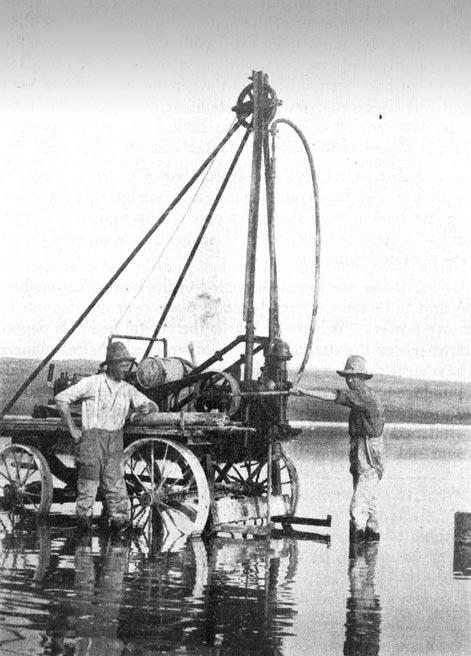
The Department of Mines using a rotary power drill to test alkali deposits in western Canada in the early 1920s (CIM Bulletin, March 1924).

deposits in Saskatchewan. The province’s potash beds are overlain by a number of water-bearing formations that created difficulties during the construction of shafts, the biggest challenge being a poorly consolidated sand-shaleclay-siltstone unit called the Blairmore Formation.
“Sir John [Macdonald] had no great dreams for Saskatchewan as he did for Canada…In a letter he wrote to Sir Edward Watkin just 100 years ago, Sir John said: ‘It seems to me that Saskatchewan is of no present value to Canada.’ I’m sure Sir John would be happy to see how wrong he was in his value judgment.”
– Nelson C. White, May 1968
“The ubiquitous and obnoxious Blairmore still lies between the surface and the potash, just waiting to burst in on the unwary miner. For those of you who may not have heard of it, the Blairmore is a sand formation under pressures of 475 pounds per square inch, or more. The Blairmore problems are just for openers. There are a dozen or so more water-bearing strata under it. These have water pressures that exceed 1,000 pounds per square inch,” said Nelson C. White [CIM Bulletin, May 1968].
Great difficulties were encountered during the first shaft sinking attempt at Unity, and the shaft finally flooded with water and sand from the base of the Blairmore Formation in 1961 after reaching a depth of 550 metres. Work on the project was abandoned, and the shaft was sealed in 1968.
In 1954, Potash Company of America began shaft sinking at Patience Lake, near Saskatoon. “The shaft was completed in June, 1958 to the 3,450 ft. horizon,” said Pearson [October 1960]. “Sinking took place through ground that had previously been frozen solid. Pre-freezing was necessary because of the unconsolidated sands and water-bearing horizons in the Blairmore Formation.”
Potash production from Patience Lake began in November 1958 and the first shipment of 1,032 tons was made in March 1959. However, that same year, water began migrating through freeze holes and penetrated the concrete shaft lining, becoming so severe that production had to stop after just nine months so the shaft could be repaired. Fritz F. Prugger and Amfinn F. Prugger [CIM Bulletin, January 1991] noted: “The inflow was not reduced to manageable levels until 1965, when production could finally start up again.”
International Minerals and Chemical Corporation began shaft sinking at a site near Esterhazy in 1957, completing the shaft in 1962 and starting commercial potash production; this is when continuous potash production in Canada began. (See the project profile on p. 38 for recent
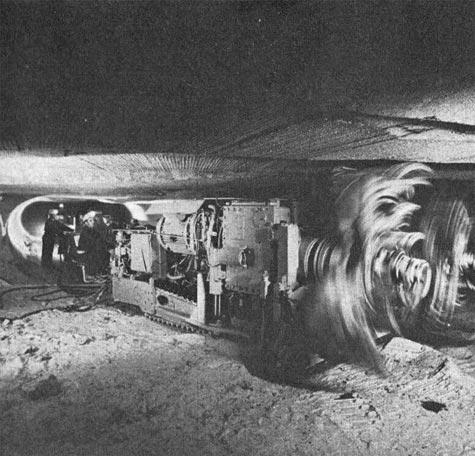
A continuous borer in action at the Esterhazy potash operations (CIM Bulletin, May 1964).
engineering work at the Esterhazy complex, which is now owned by Mosaic)
During the next eight years, nine more potash mines in Saskatchewan opened: one in each of the years 1964, 1965 and 1967, three in 1968, two in 1969 and one in 1970.
“The first shafts to be sunk in Saskatchewan encountered major problems during shaft sinking. Of the 17 potash shafts started in the province, five had major water inflows during shaft sinking or after production startup, and one was abandoned because of water problems,” said Prugger and Prugger [January 1991].
These technical difficulties are not unique to Canada’s potash mines, however, and Prugger and Prugger [January 1991] noted that “all Saskatchewan potash producers go to considerable lengths to avoid water inflows into underground workings, and procedures to minimize water hazards are employed at all mines…The exchange of information and experience is the cheapest and best investment for long-term cost savings and the protection of valuable resources.”
According to the Mining Association of Canada’s May 2023 report “Economic Impacts and Drivers for the Global Energy Transition,” Canada is the world’s largest producer and exporter of potash. The report said that in 2021, Canada accounted for 31 per cent (22.5 million tonnes) of the total global potash production and 38 per cent (21.6 million tonnes) of the world’s total potash exports. CIM
Throughout 2024, we will be looking back through the CIM archives for contemporary coverage of the discovery and development of major mineral deposits in Canada.





Unlike traditional 2D measurement techniques, Mineralogic 3D uses a 3D-quantitative-CT scan to measure the surface and interior of every particle S o you can discover the real liberation of your valuable minerals.

Scan for whitepapers and more zeiss.ly/224-cim
NewLeopardTM DI650i down-the-holesurfacedrillrig offers long-termproductivityand superiorstability withrobustand reliablemain components – seamlessly integrated withstate-of -the-art technicalsolutions.Scalable automation, easymaintenance andoutstandingmovabilityarethefeatures that make LeopardTM DI650i apremiumproduct,which isan honortoown.
Leaveyour pawprintand enjoy thesmooth, efficientride.















